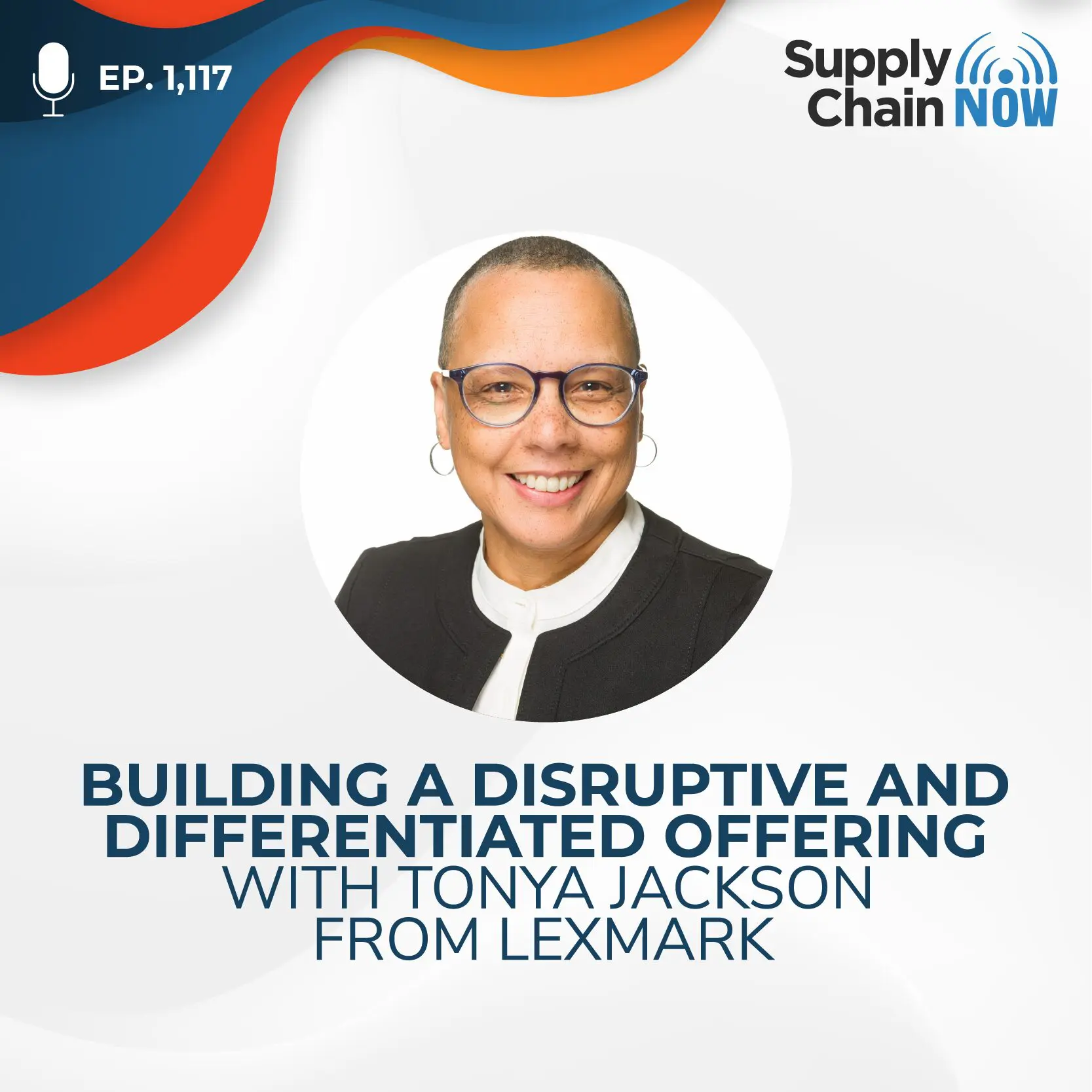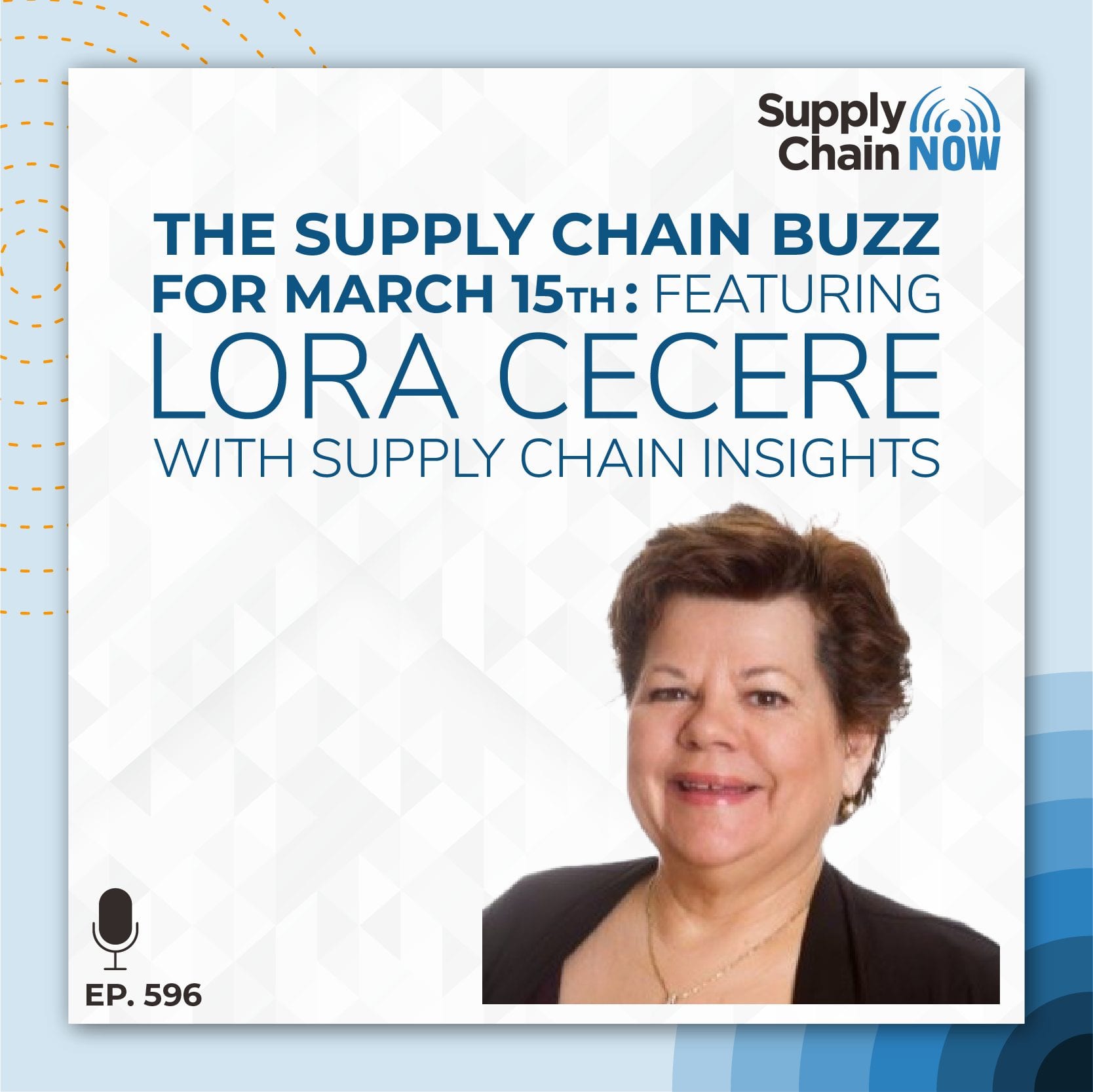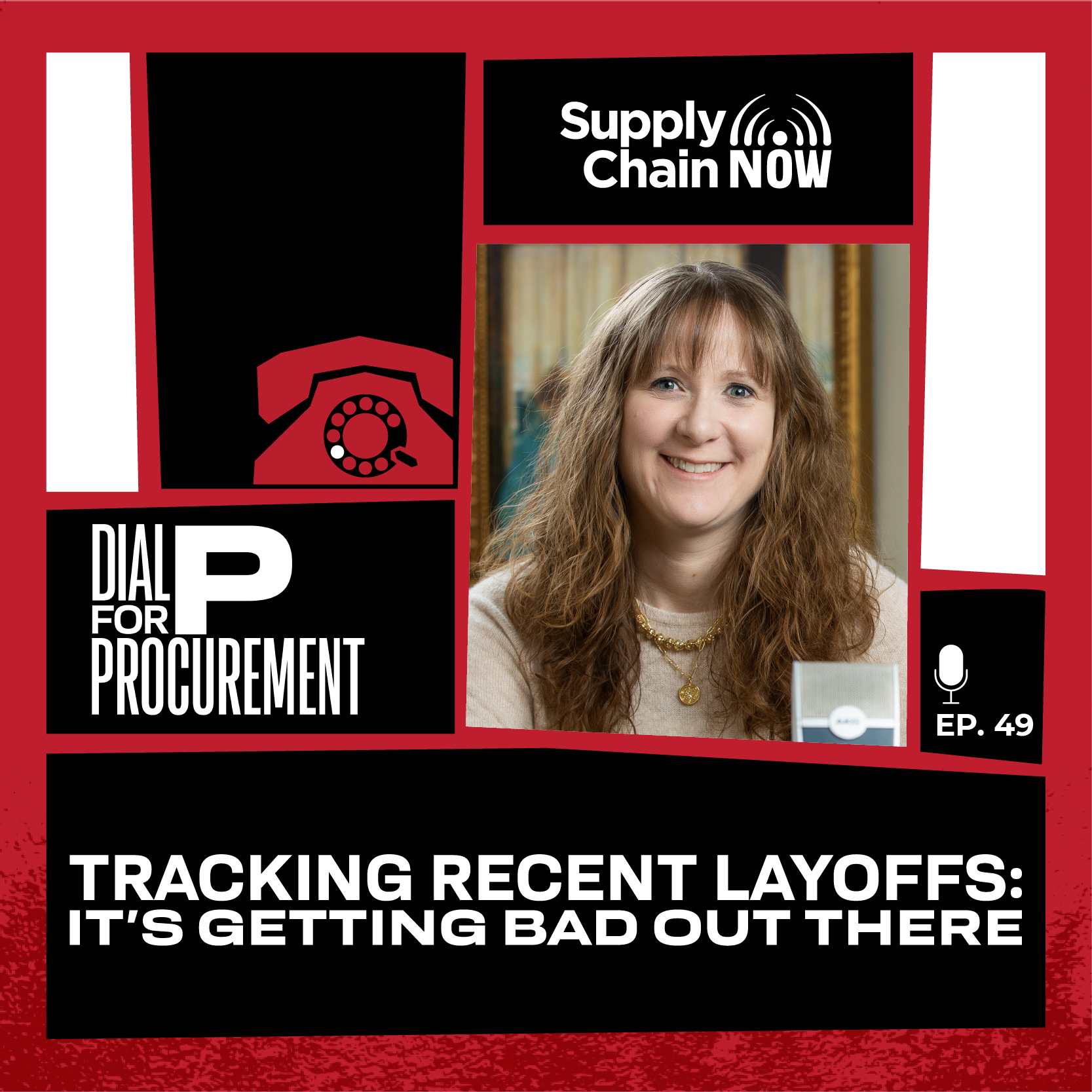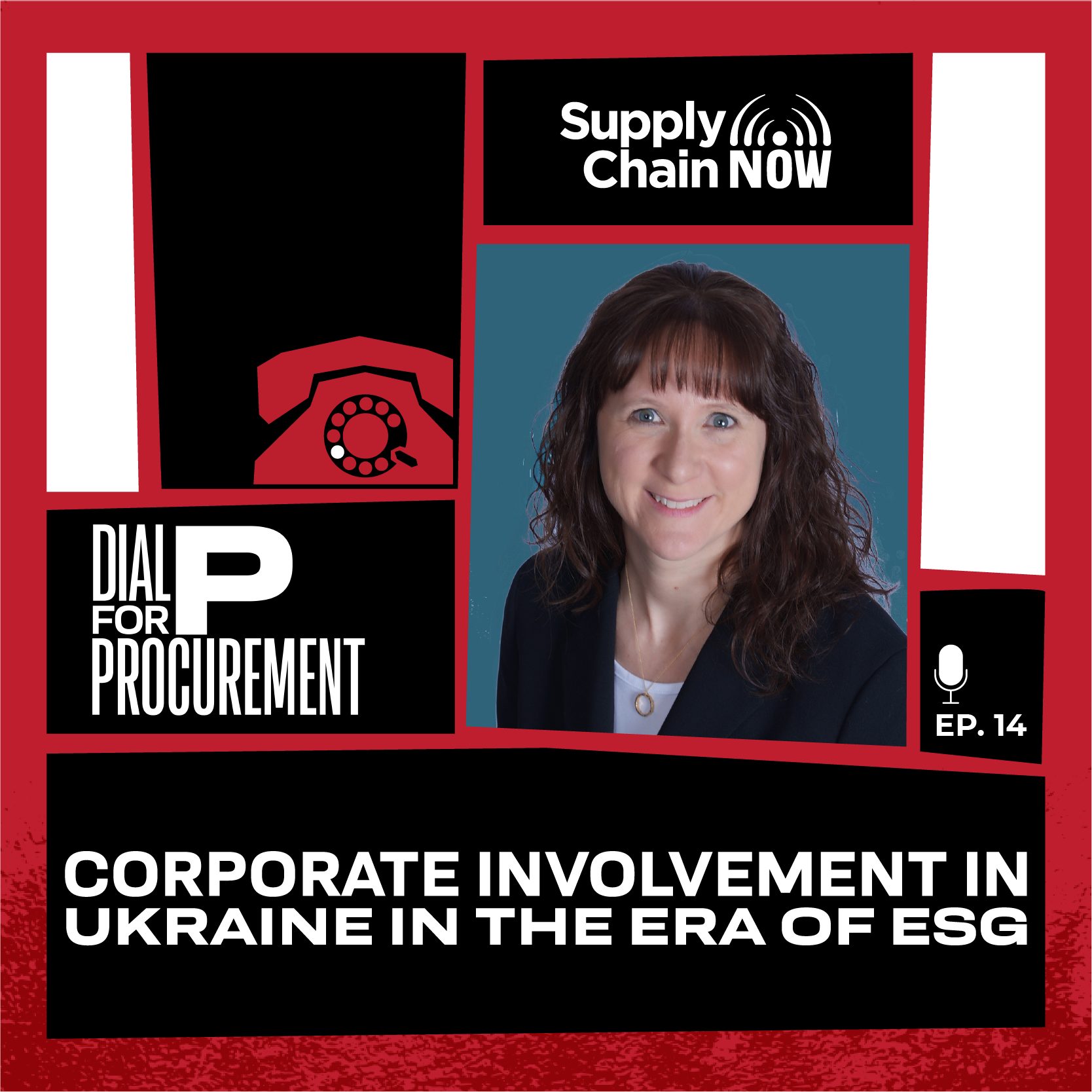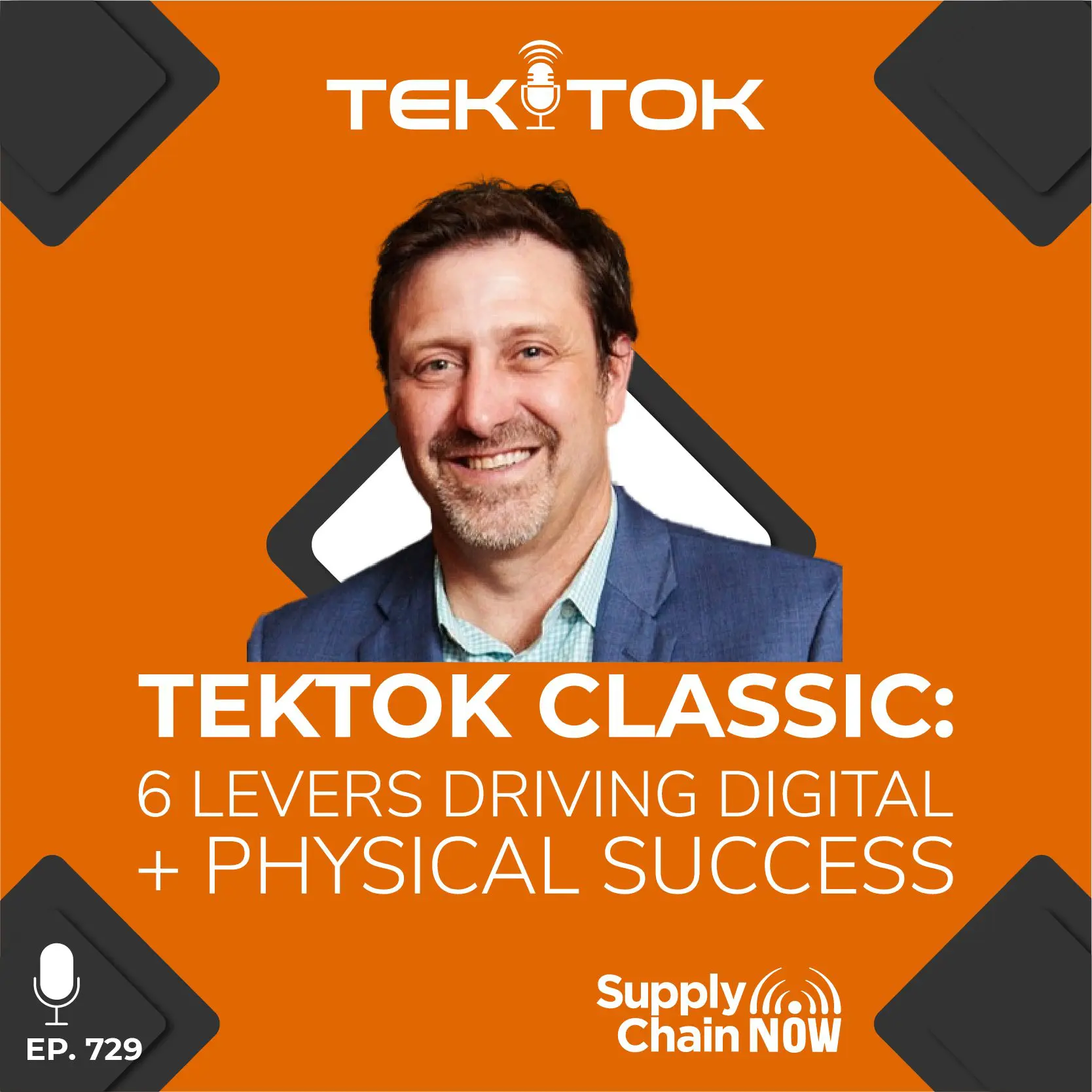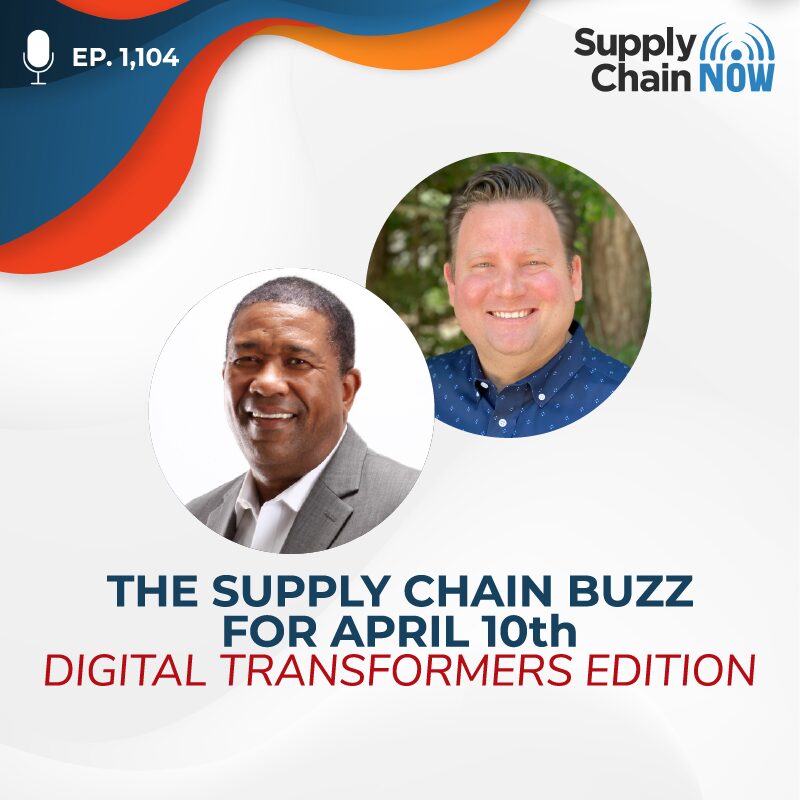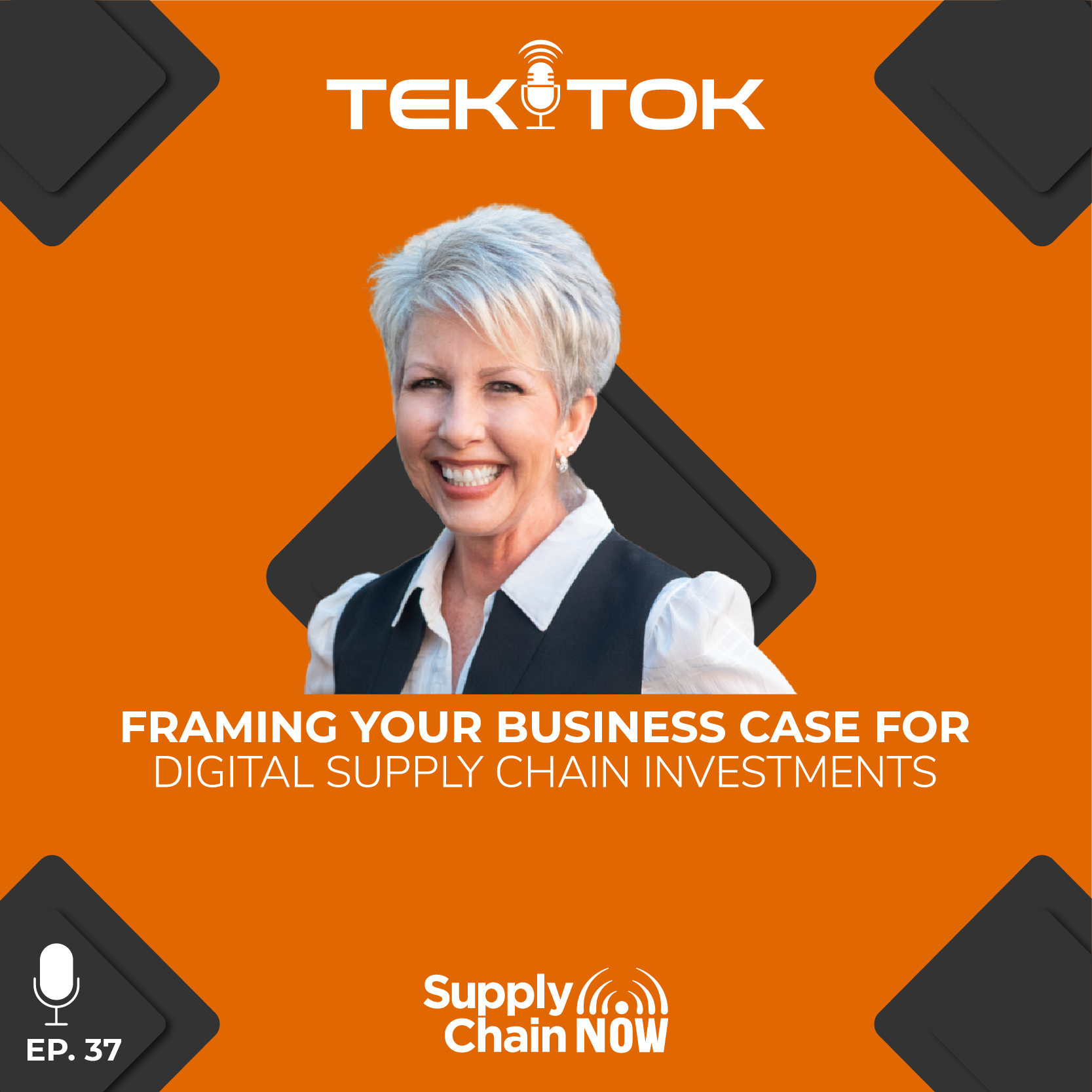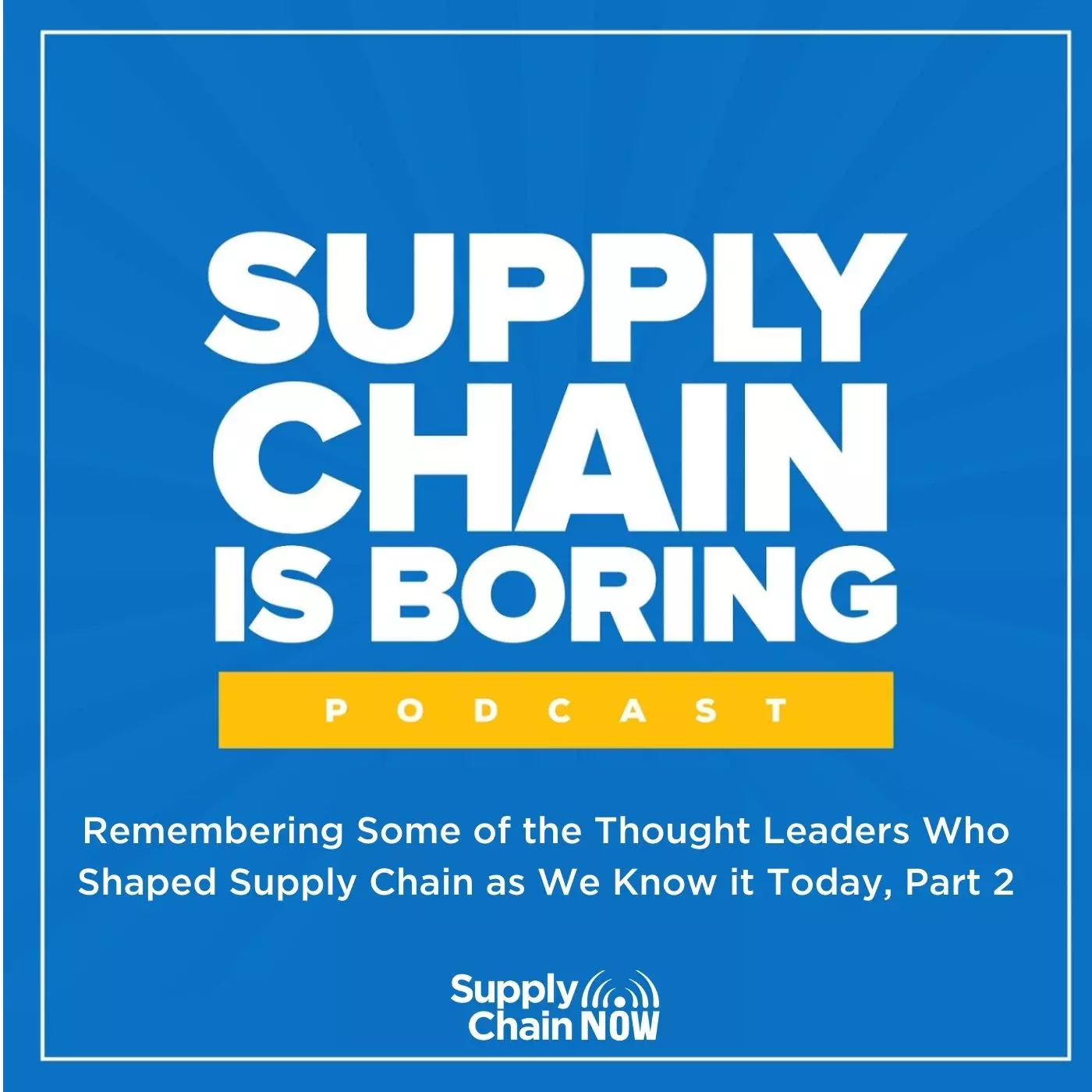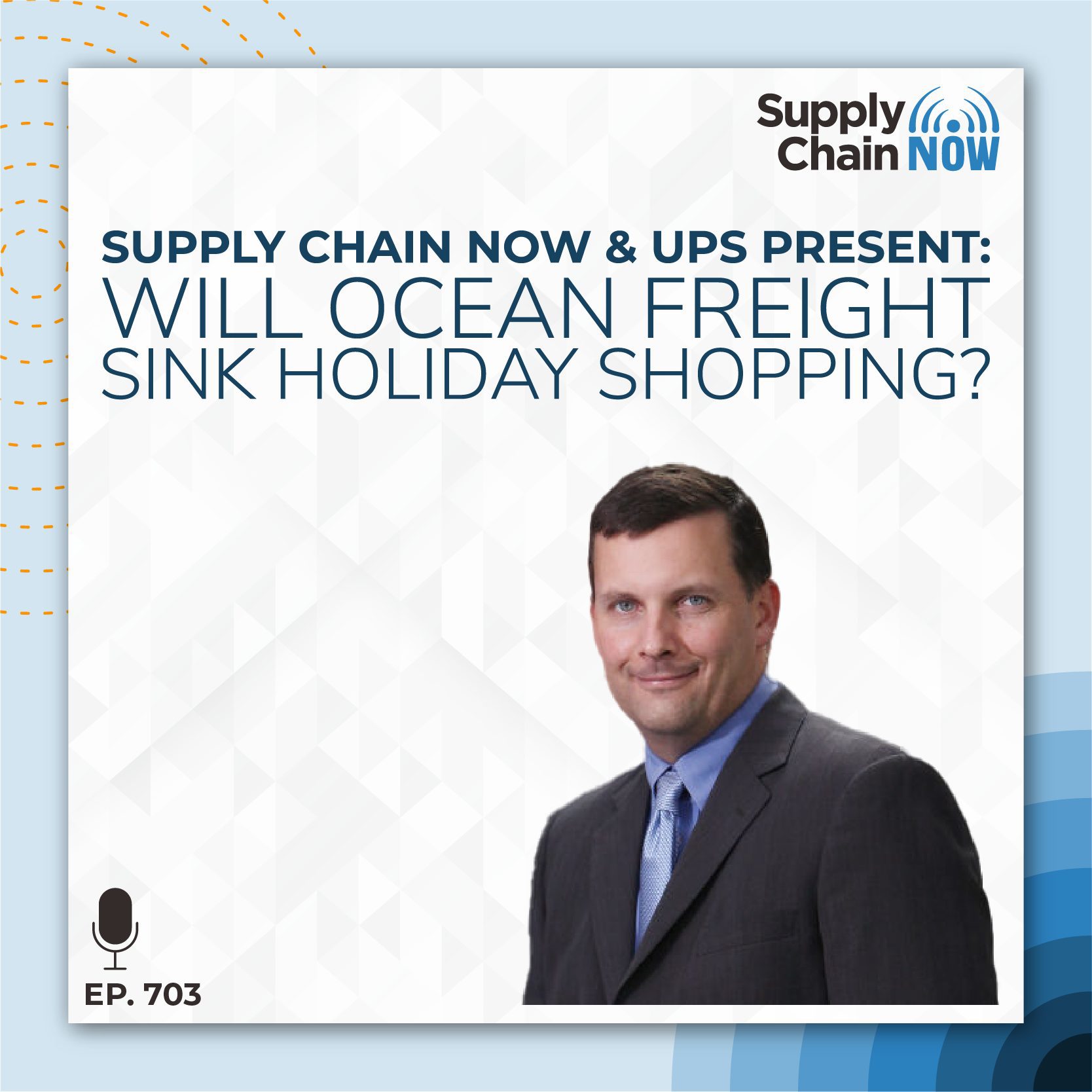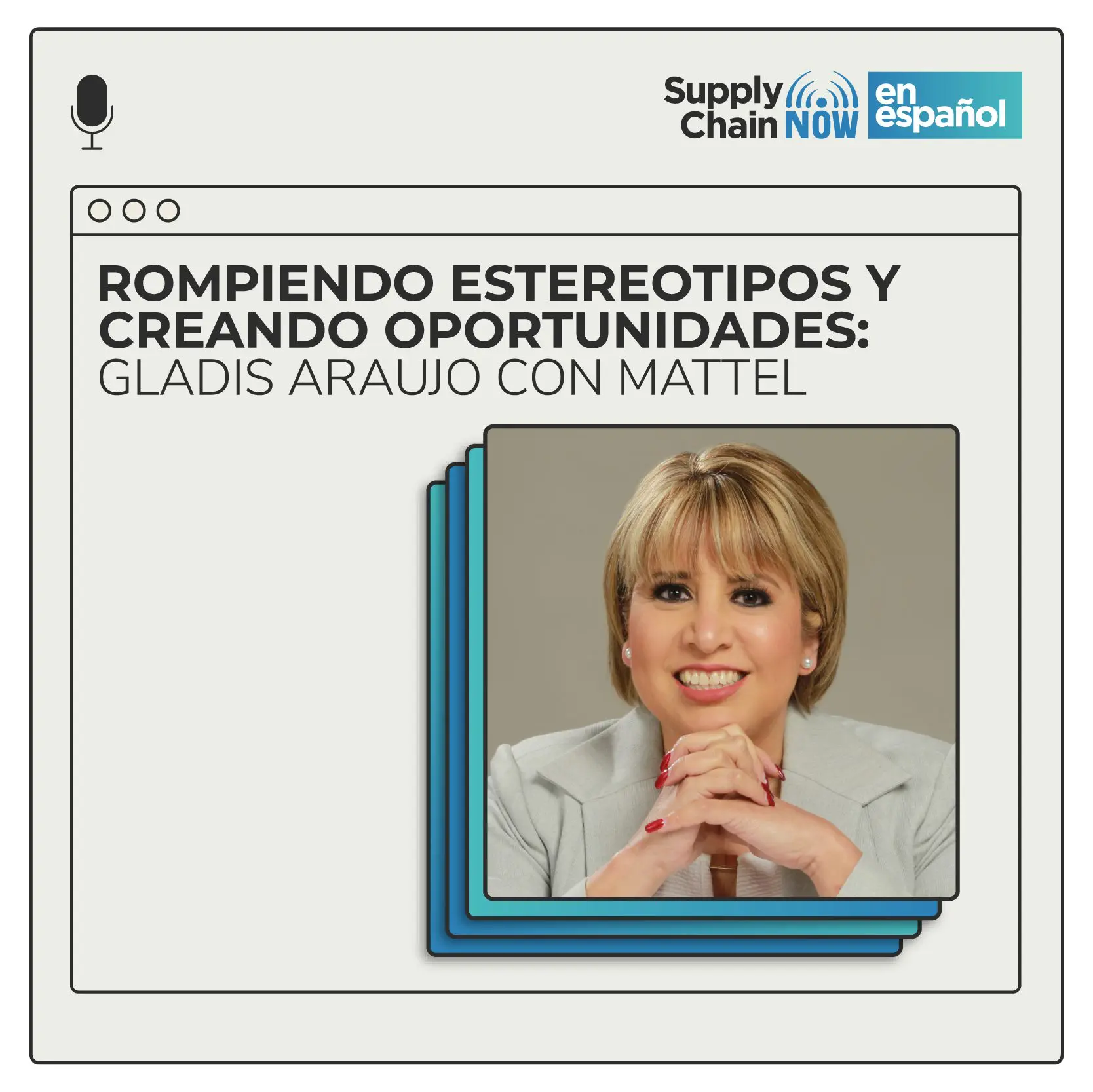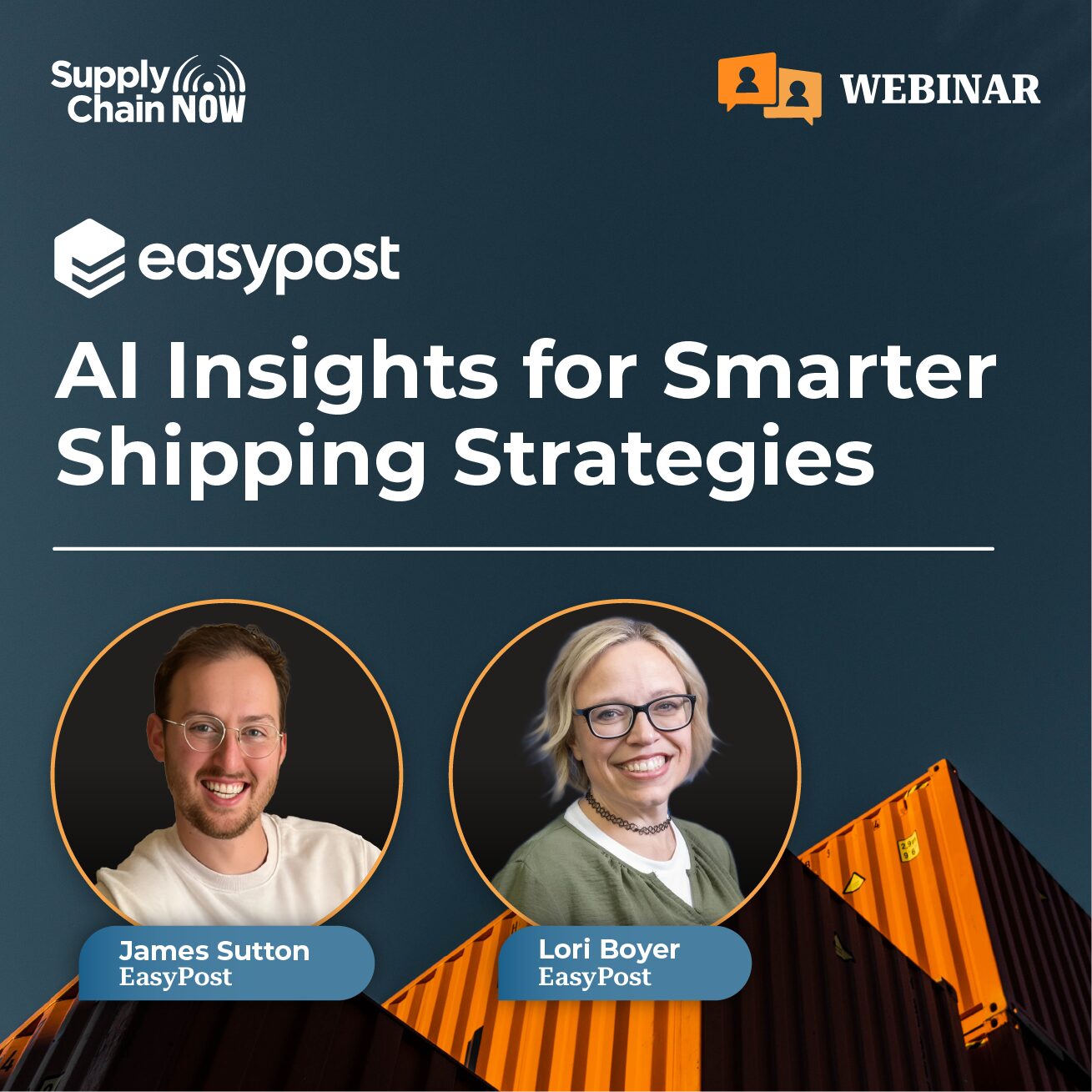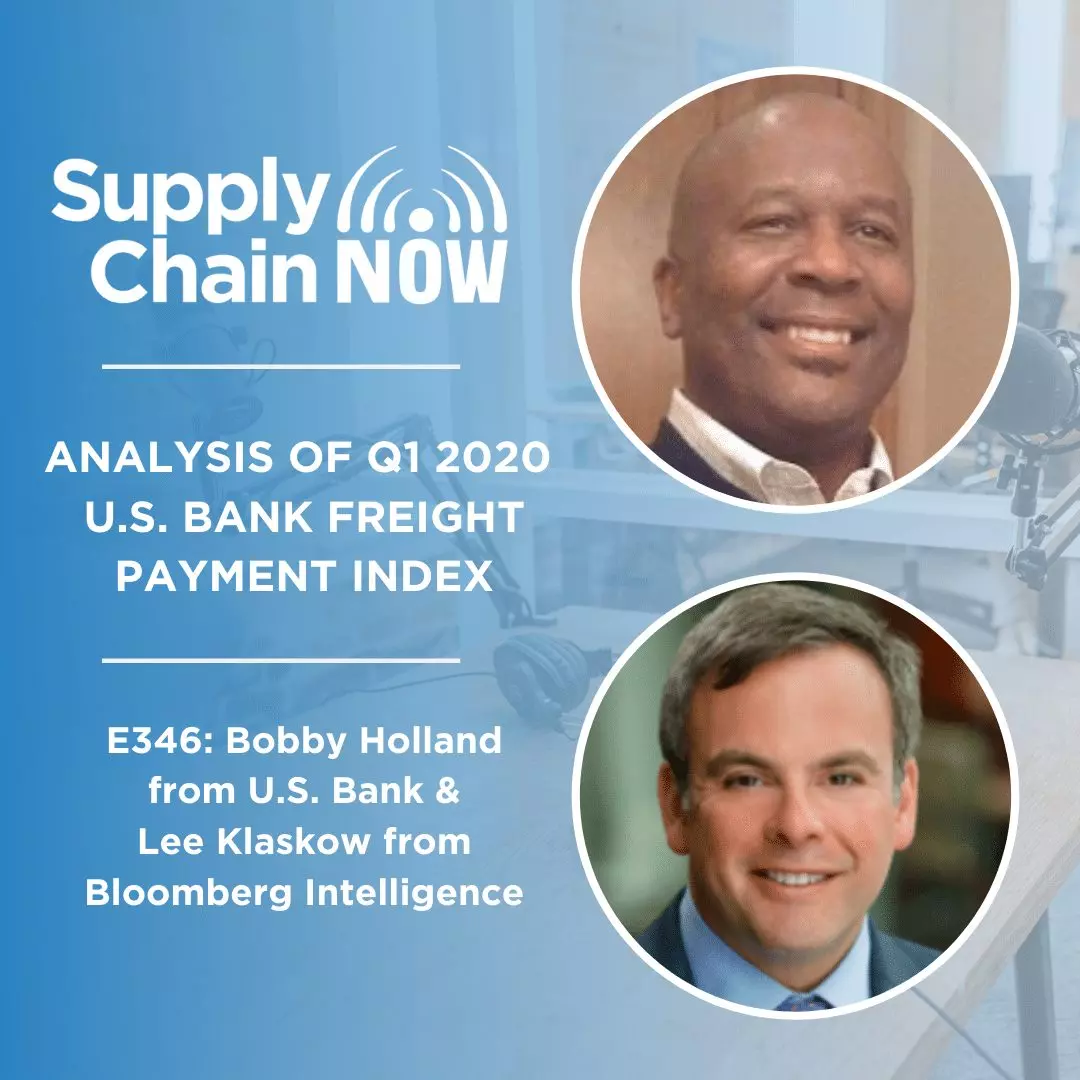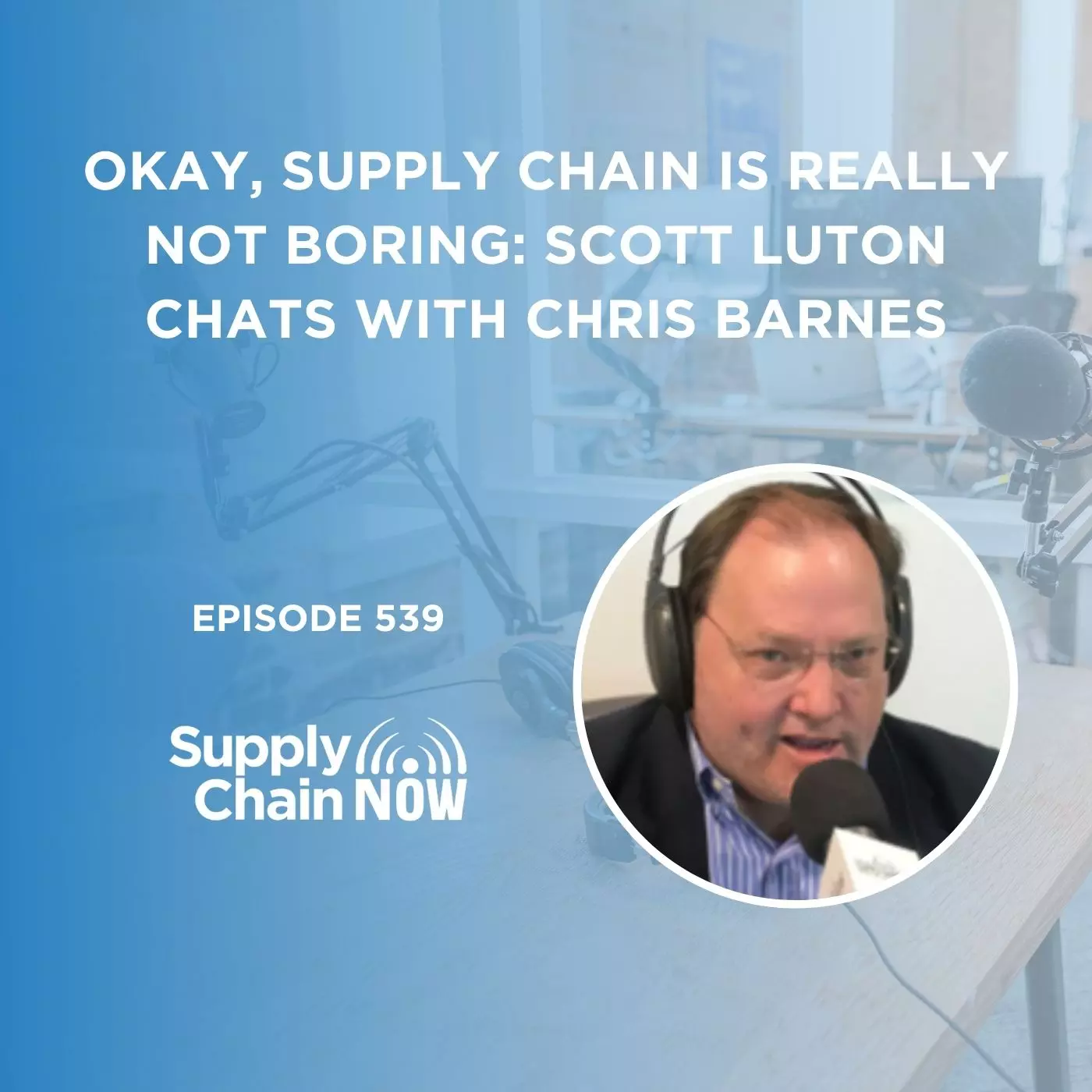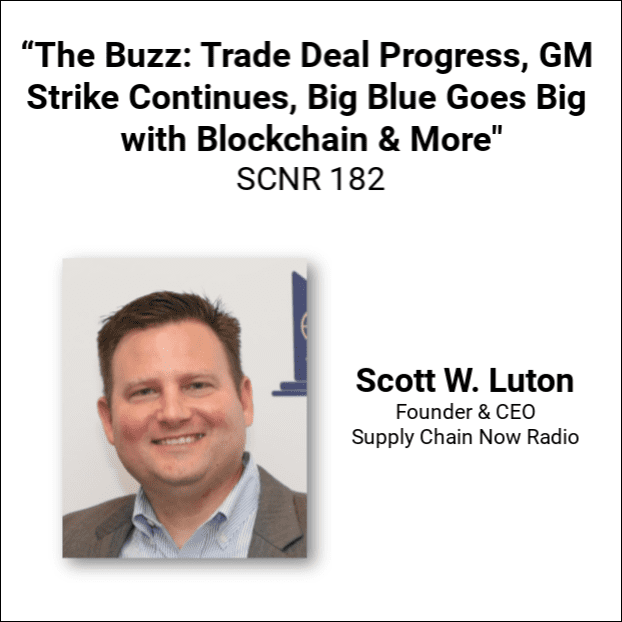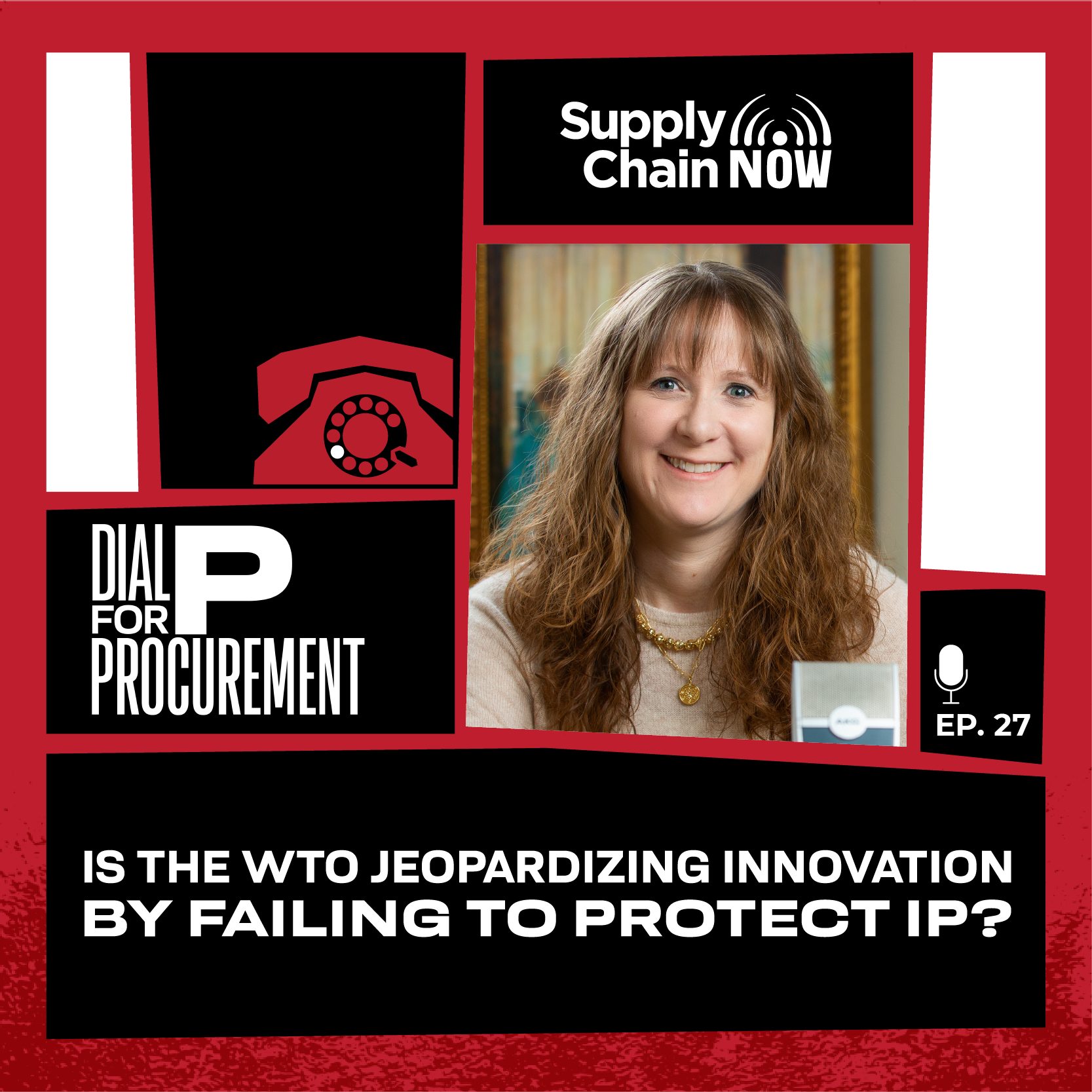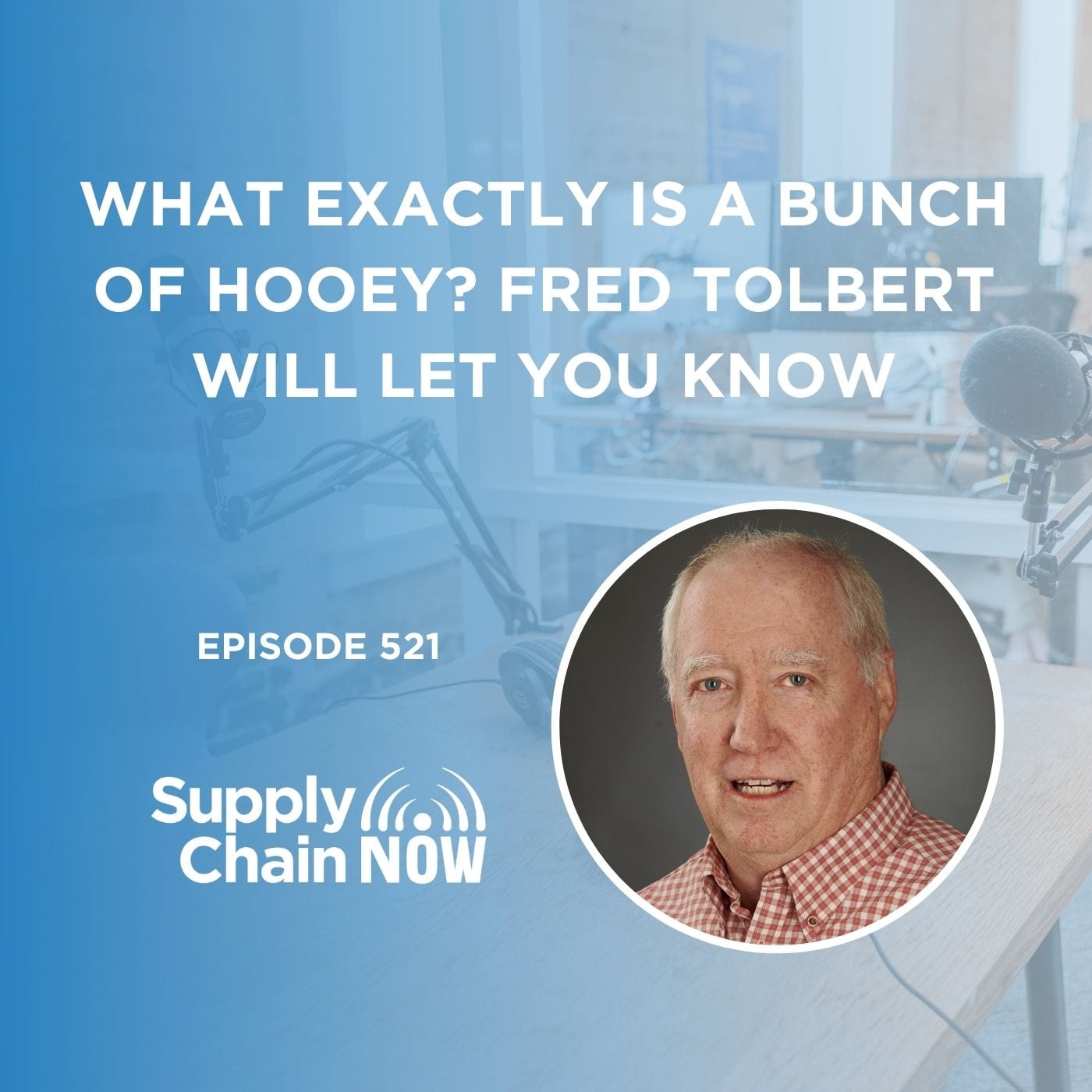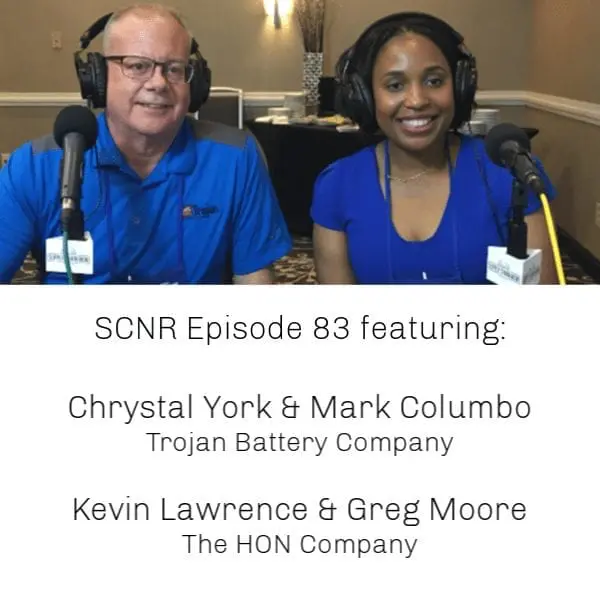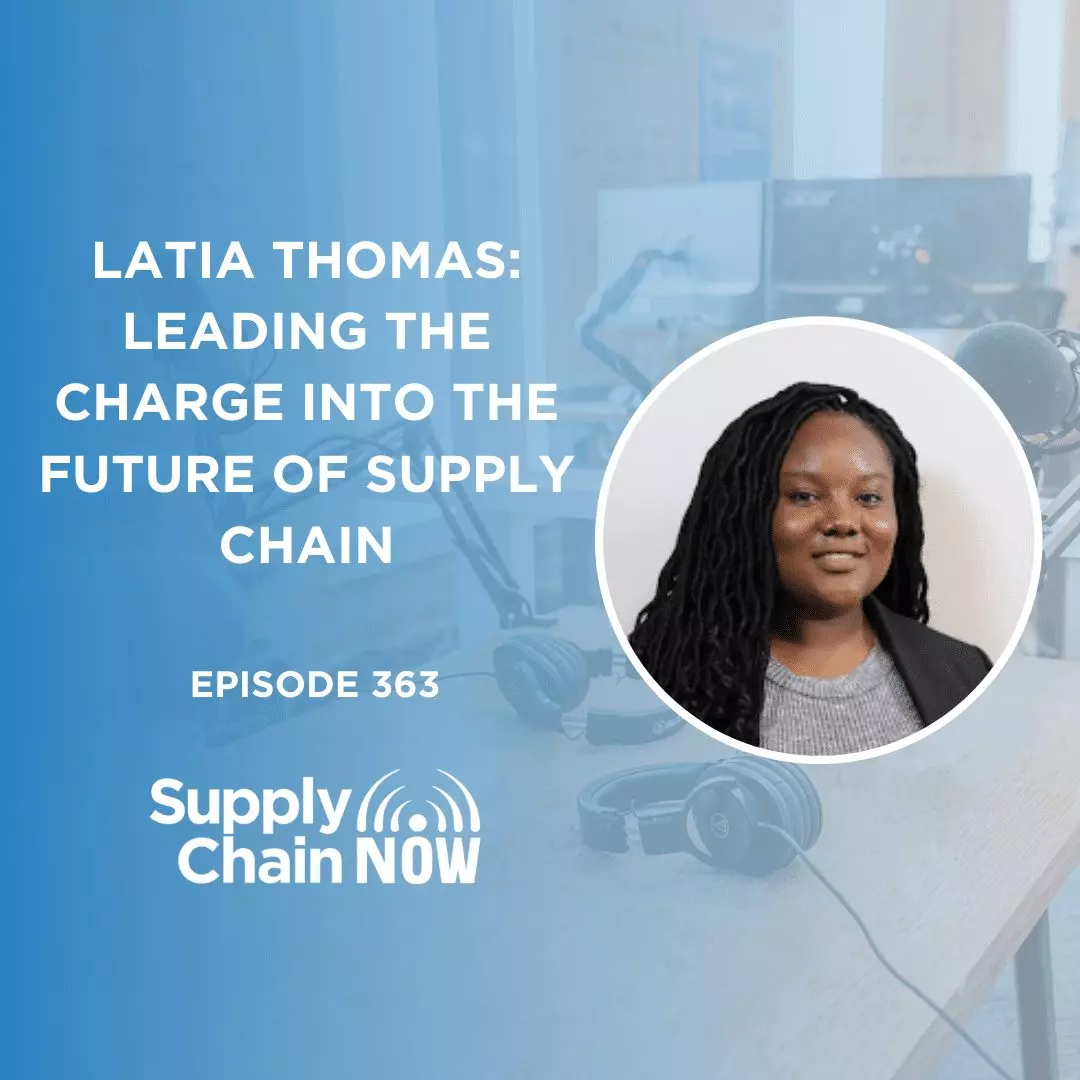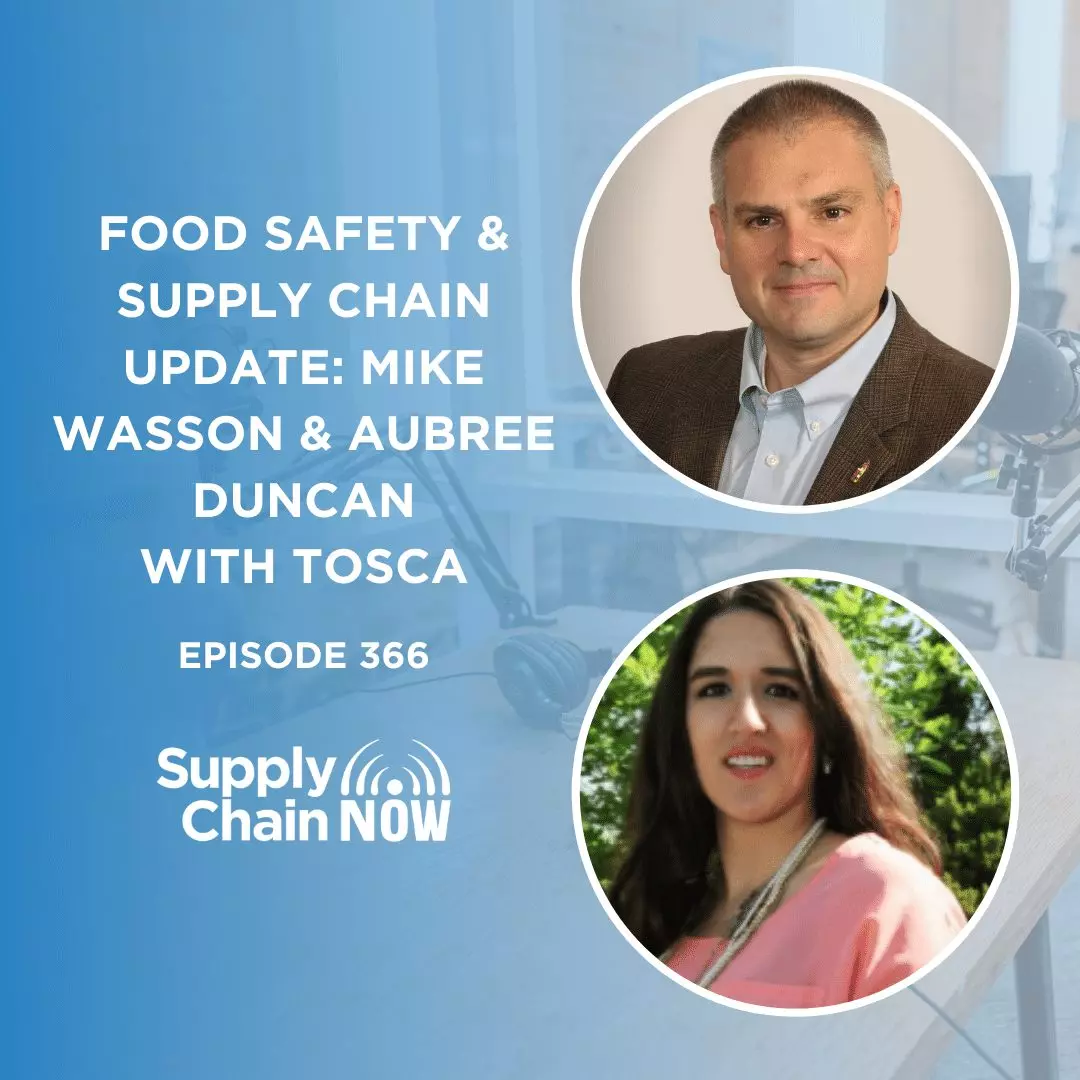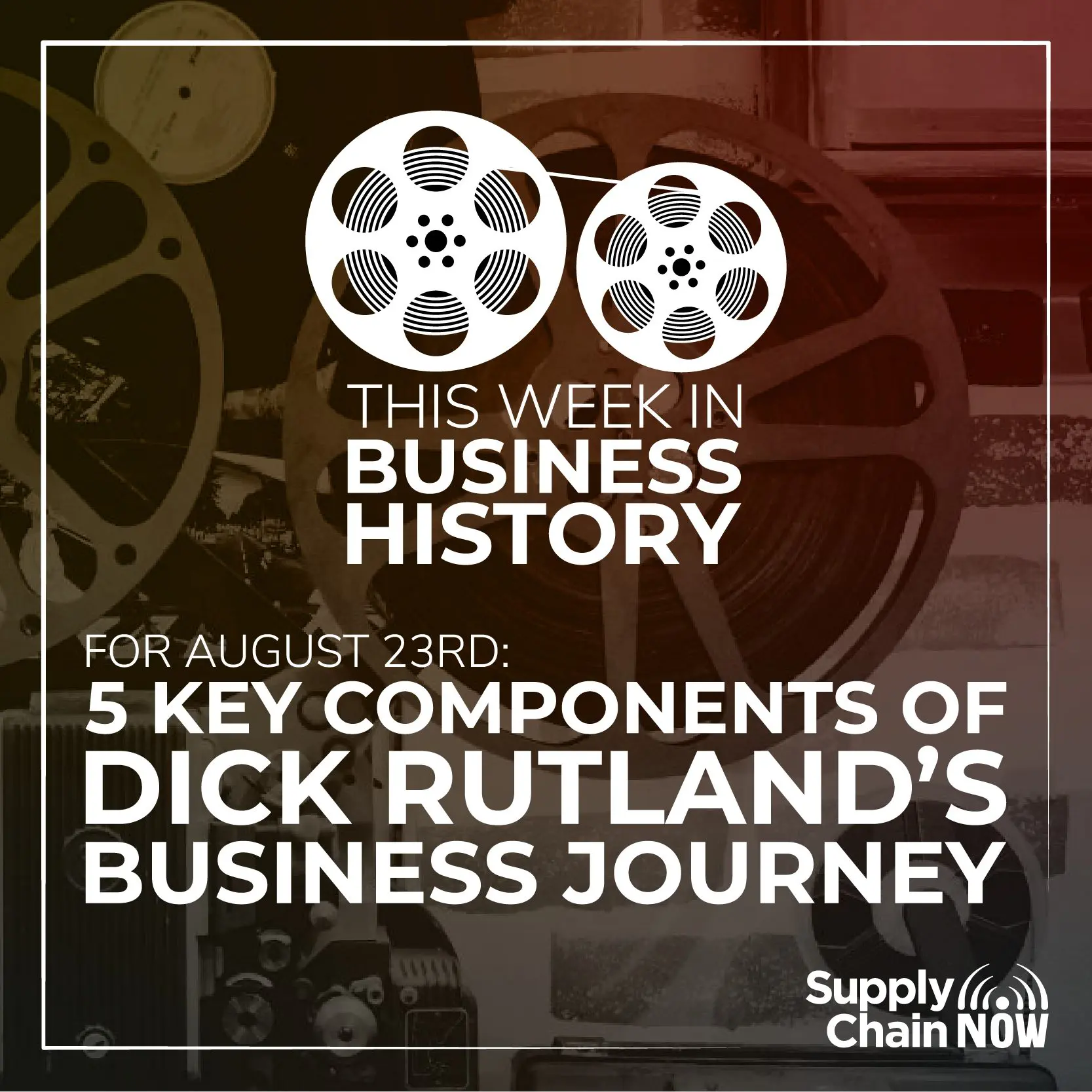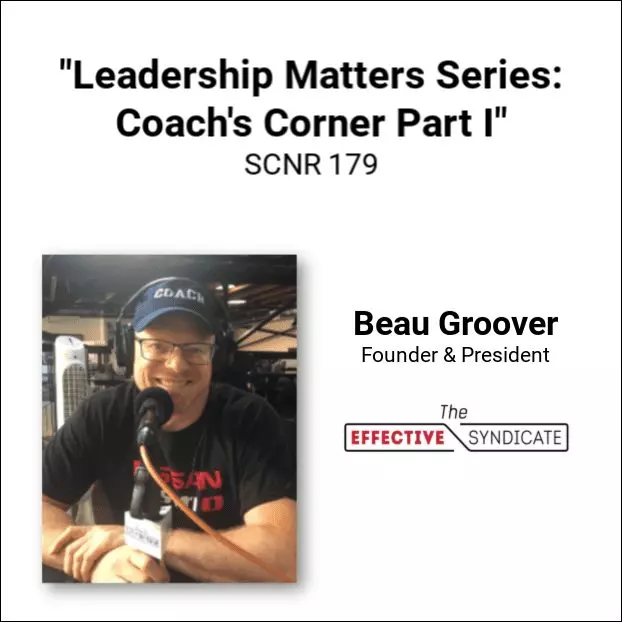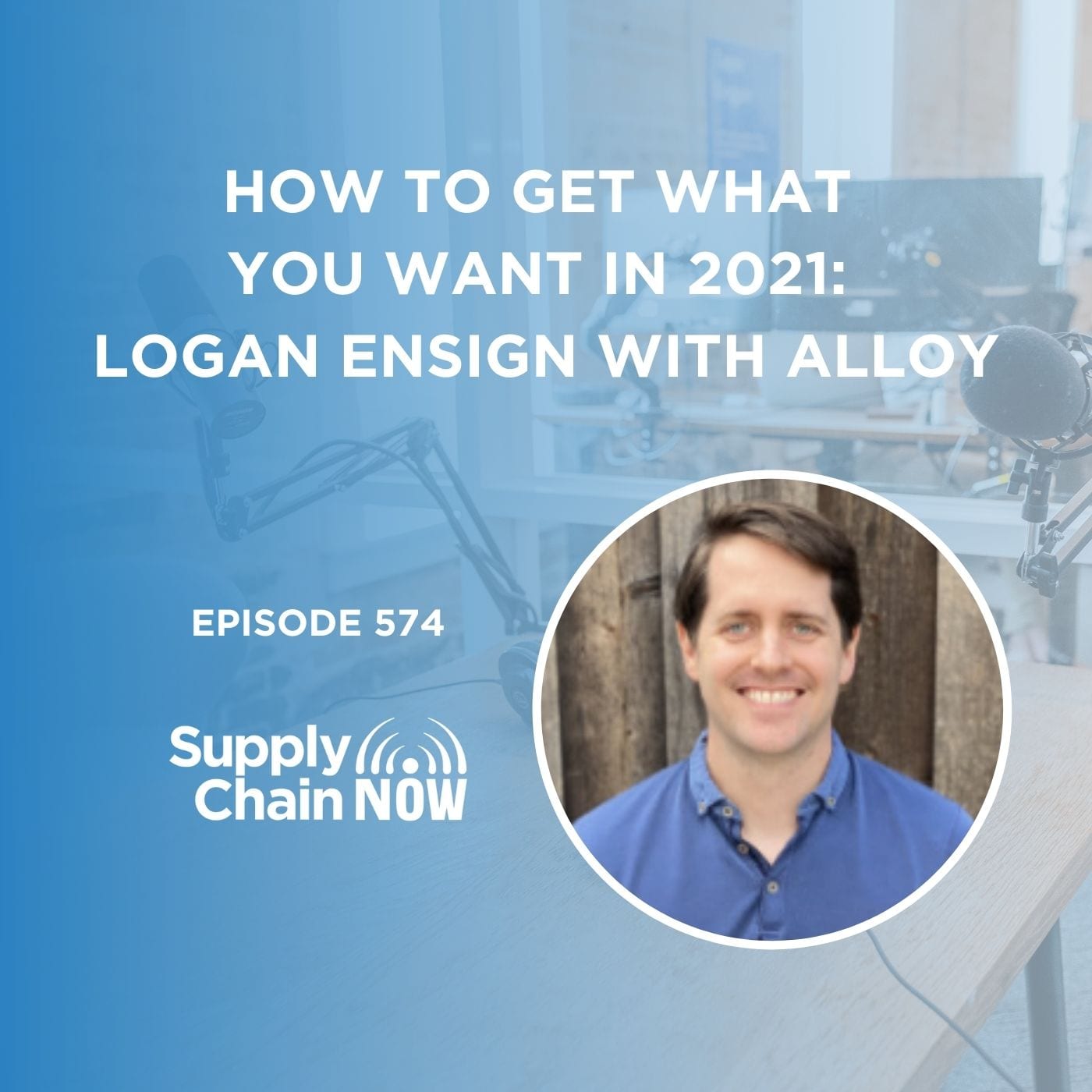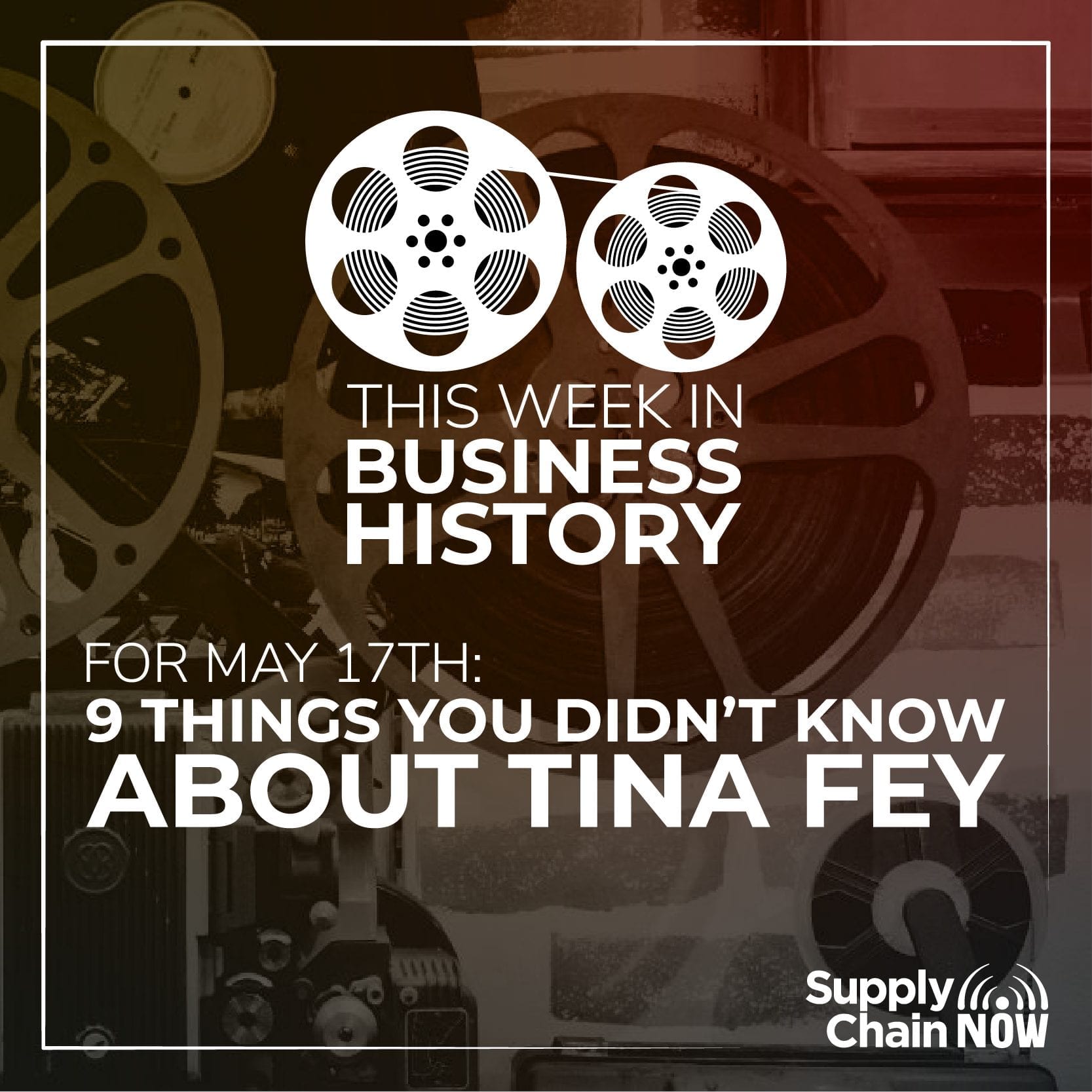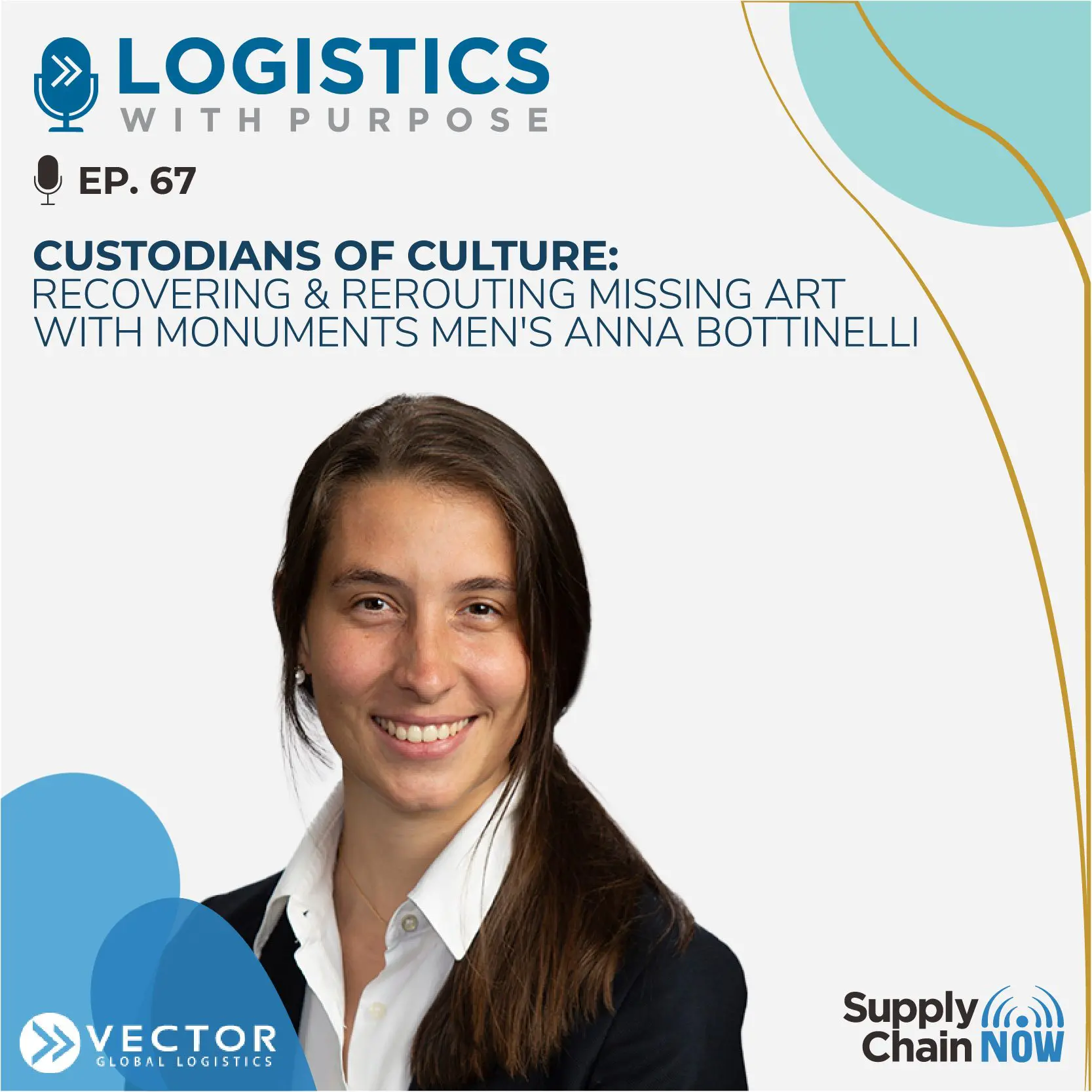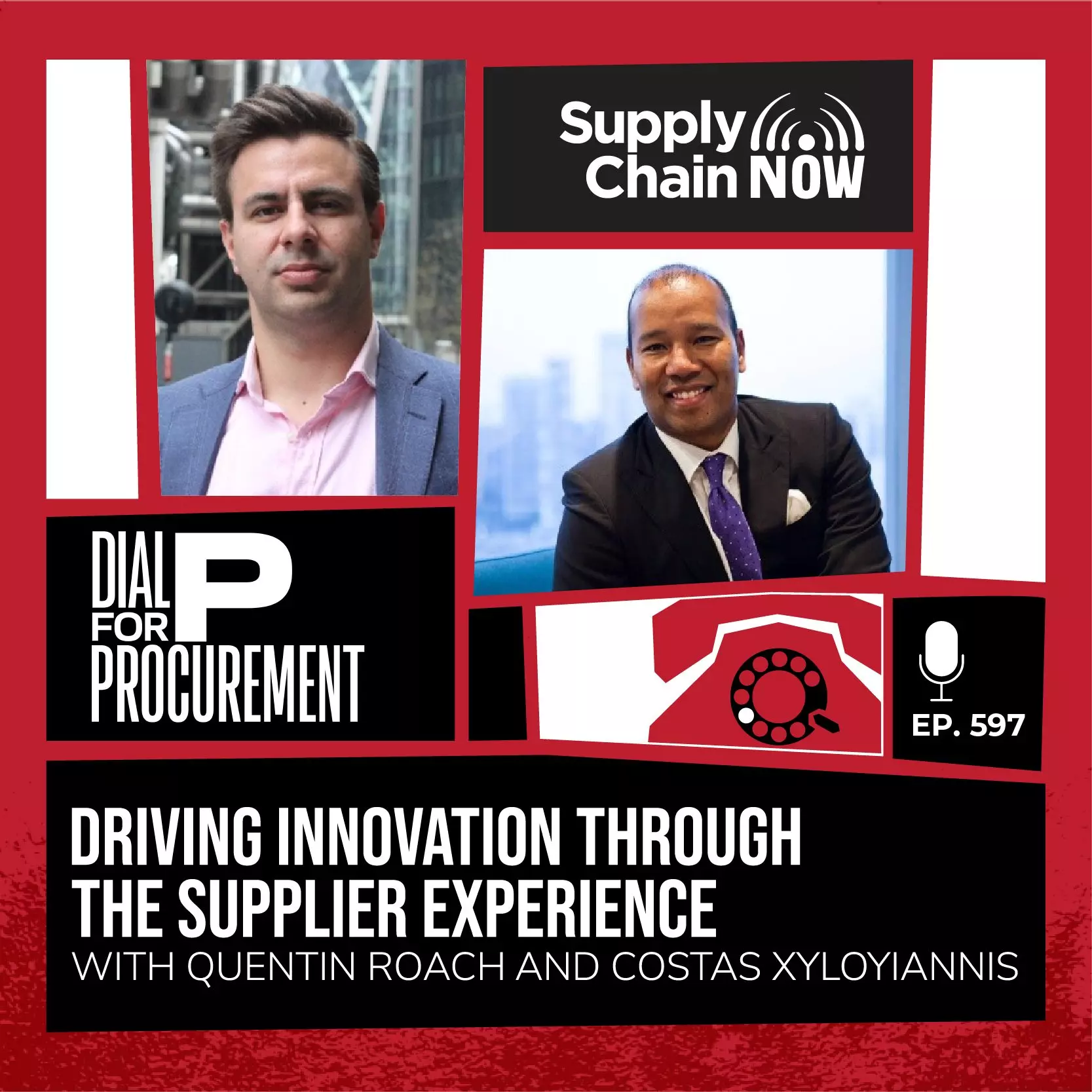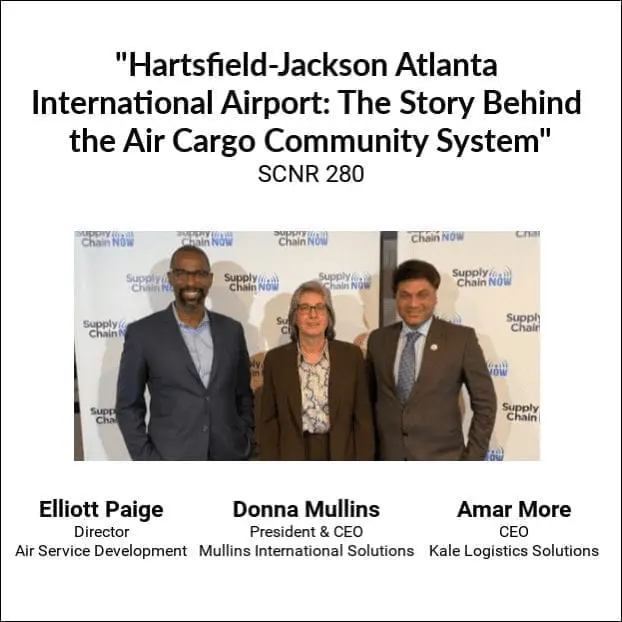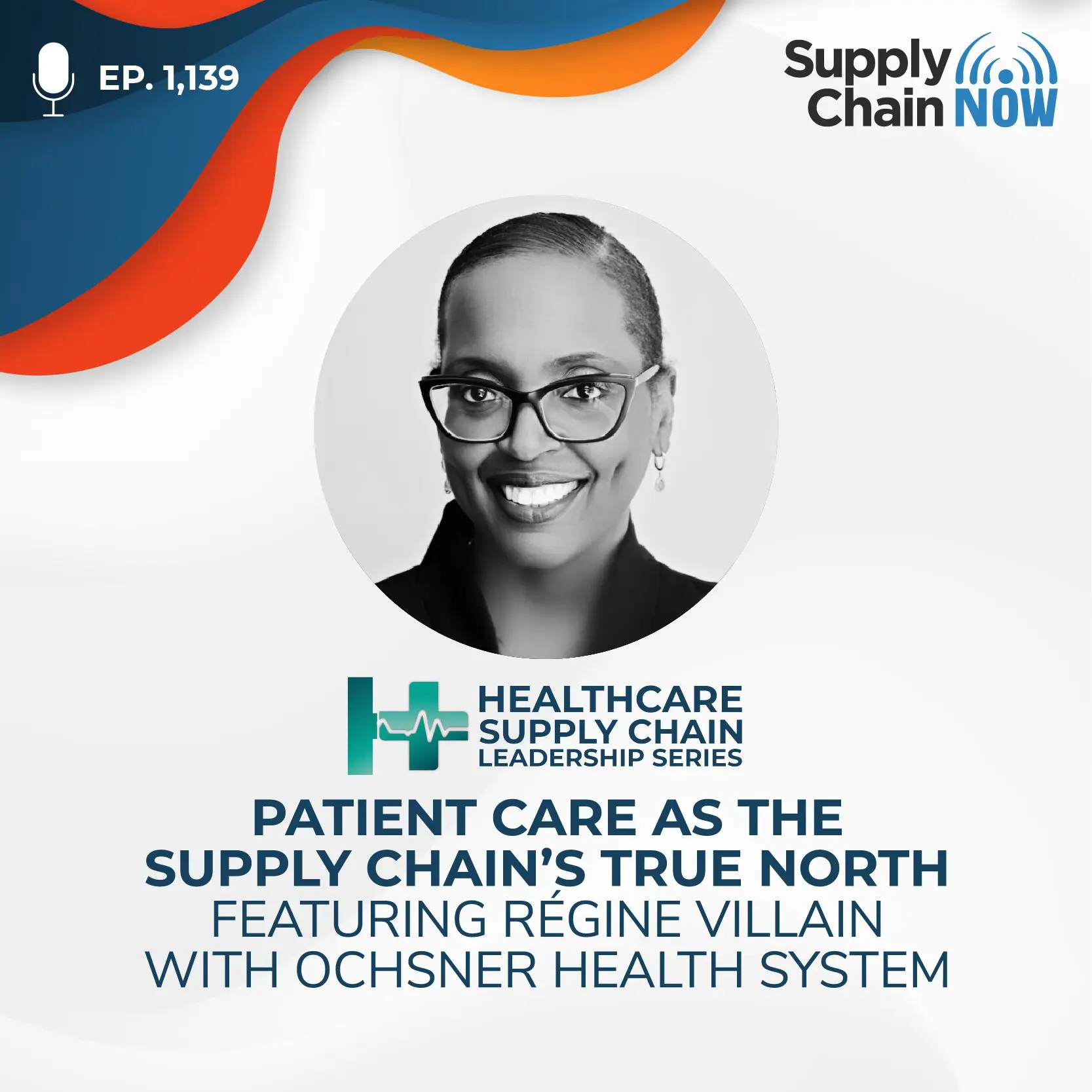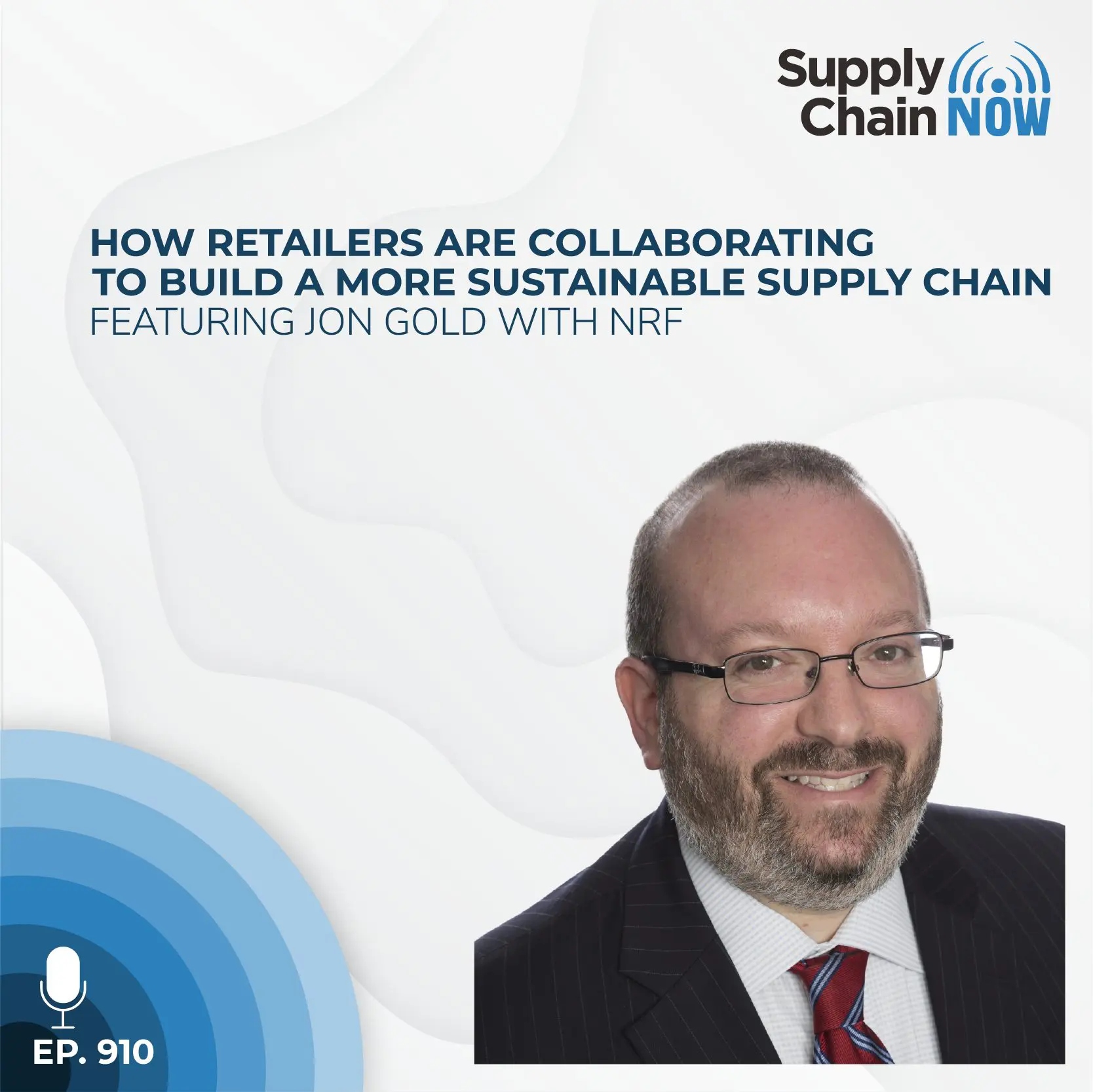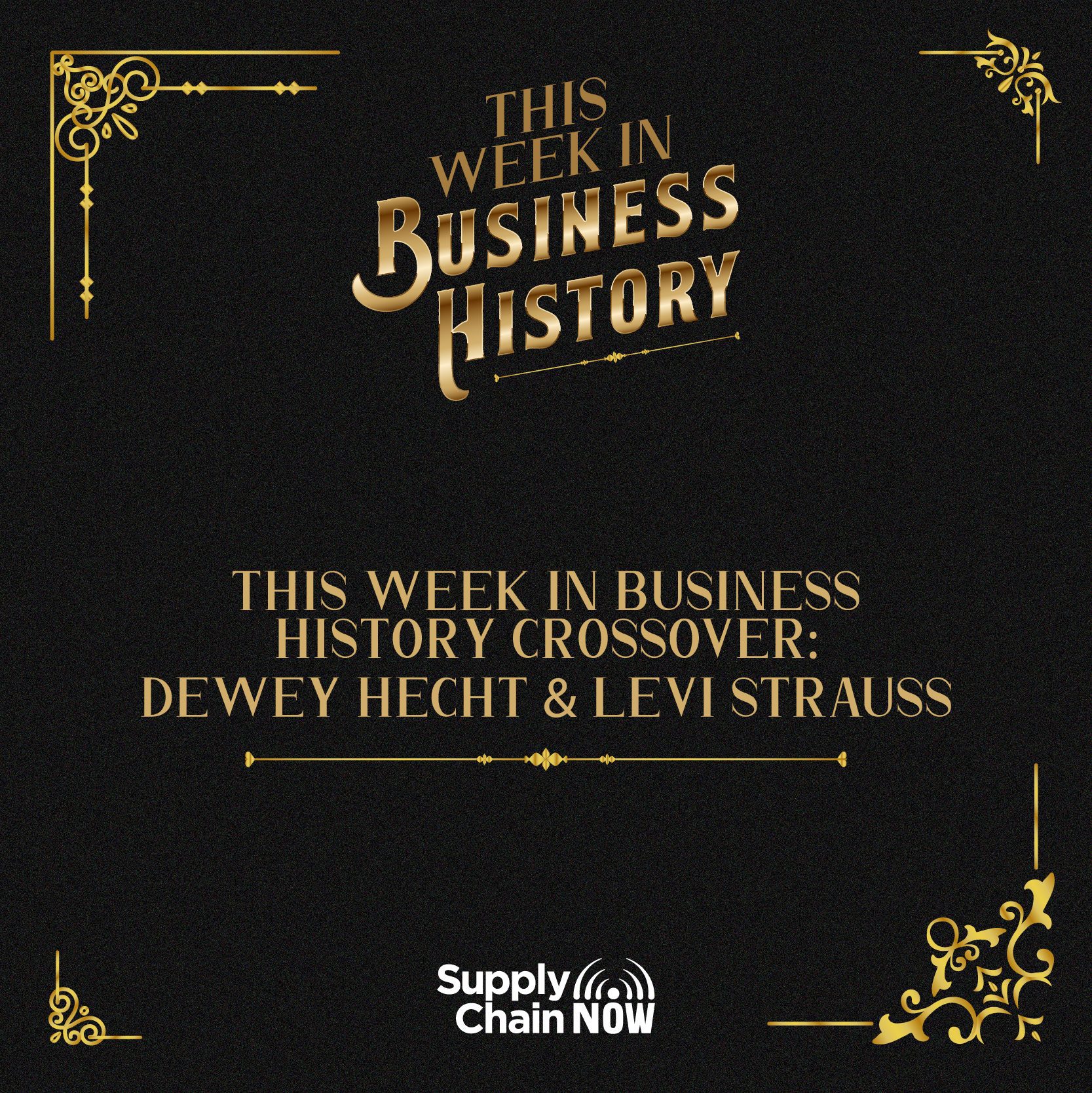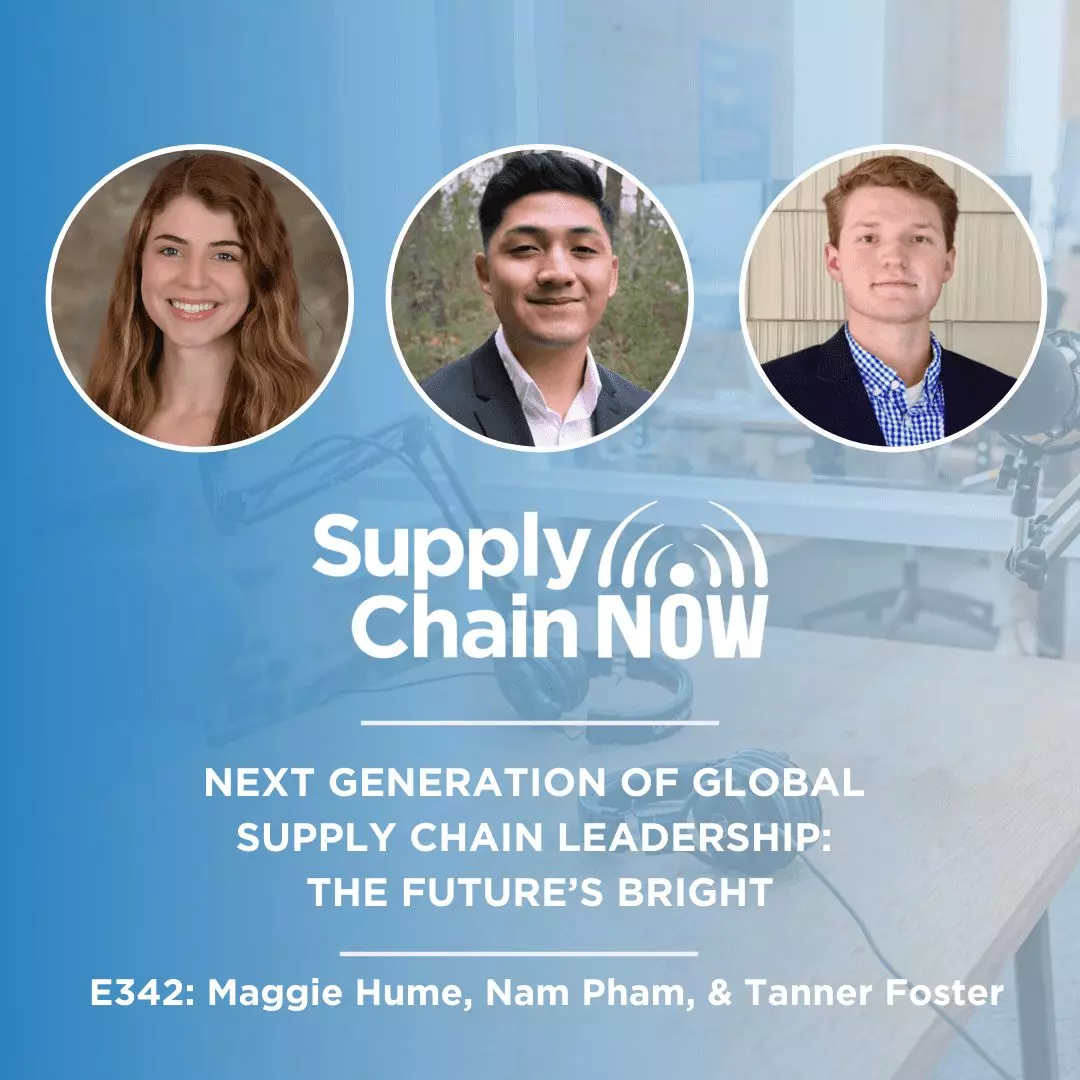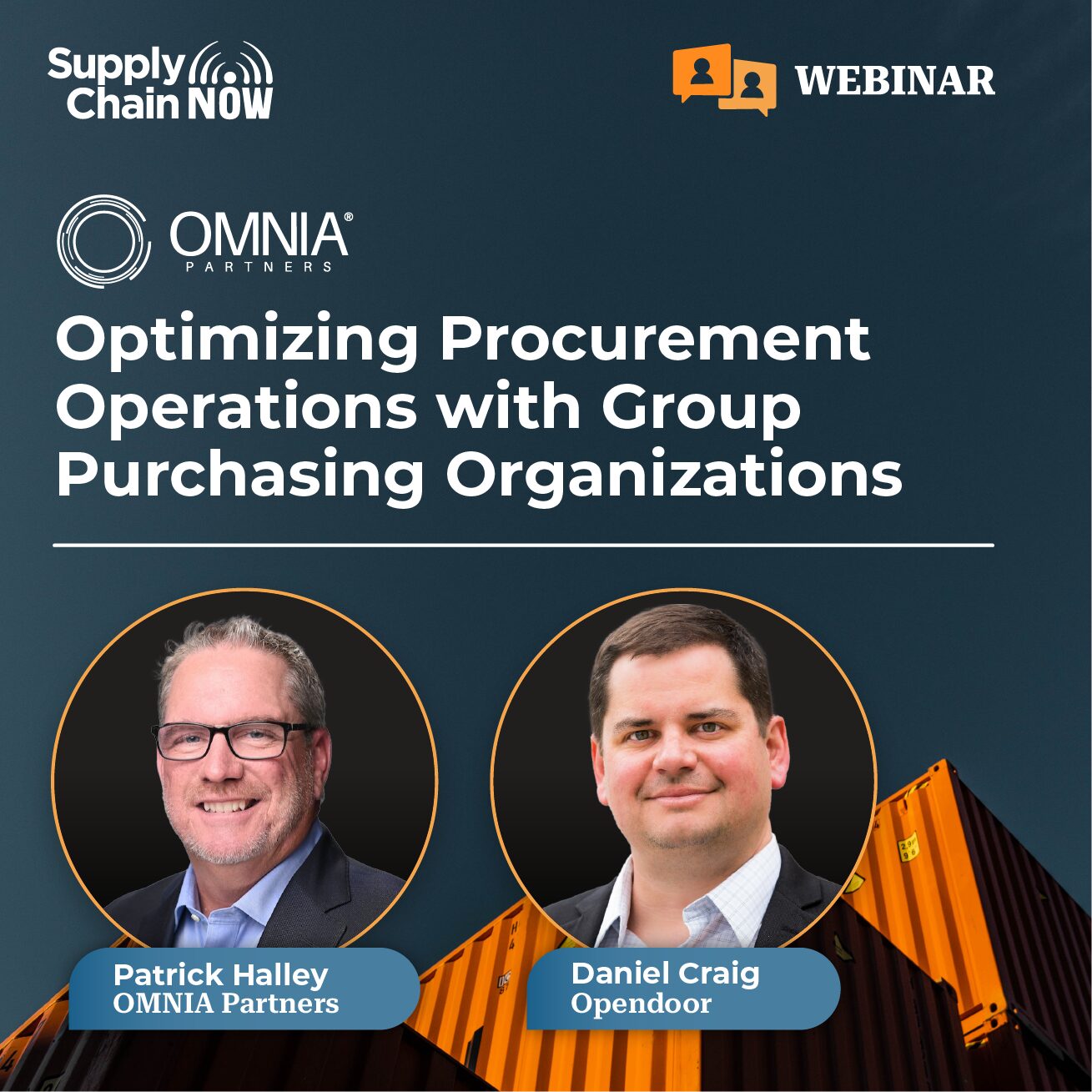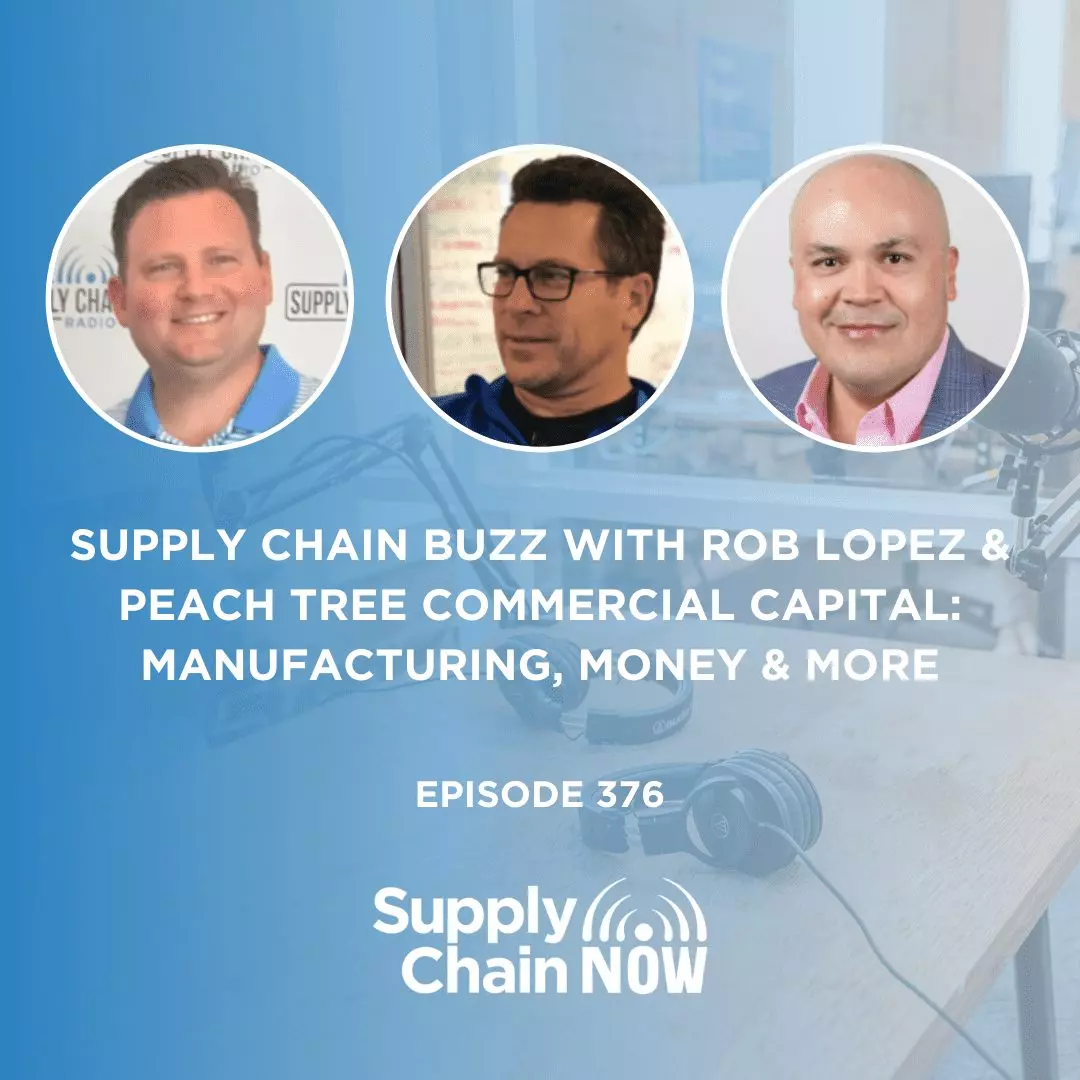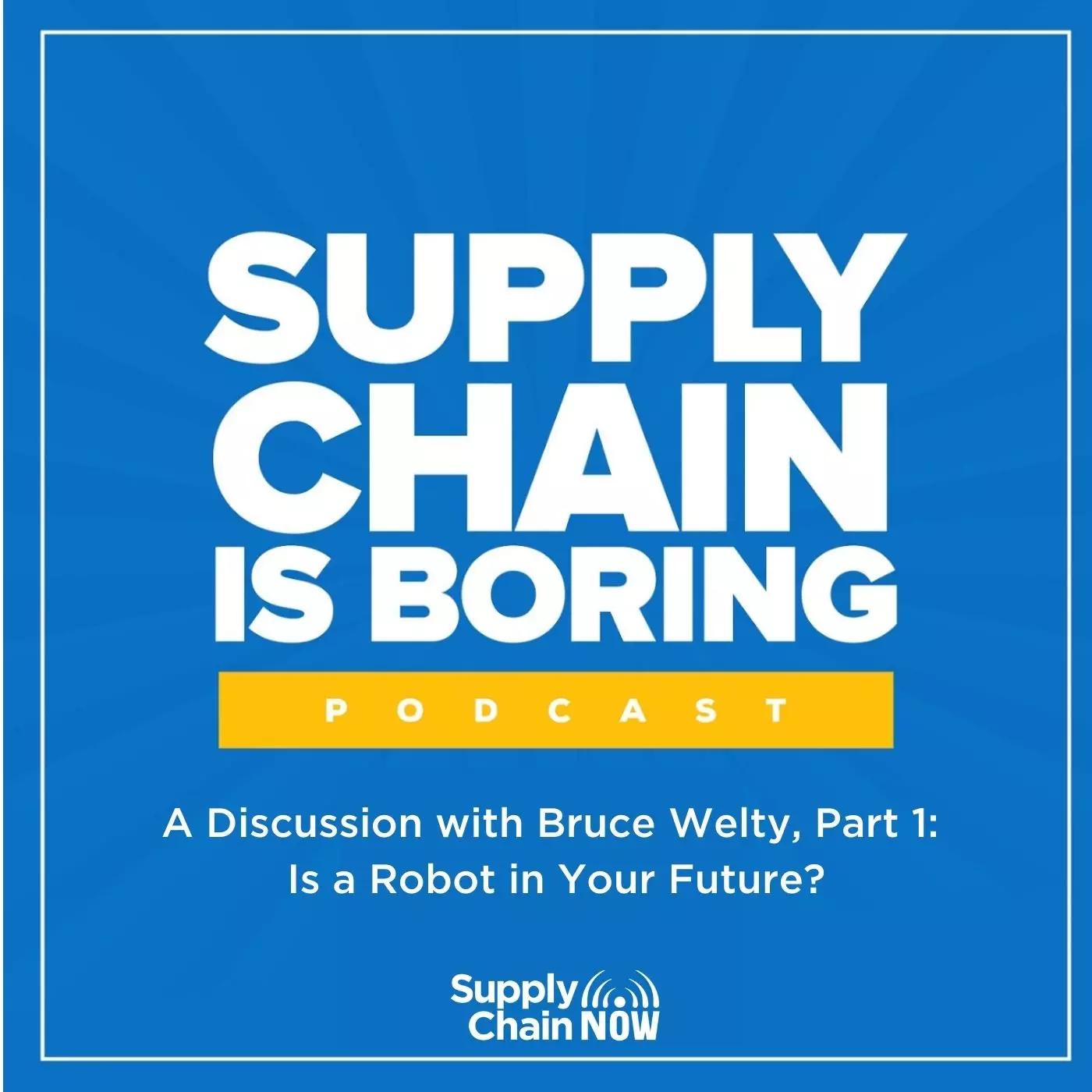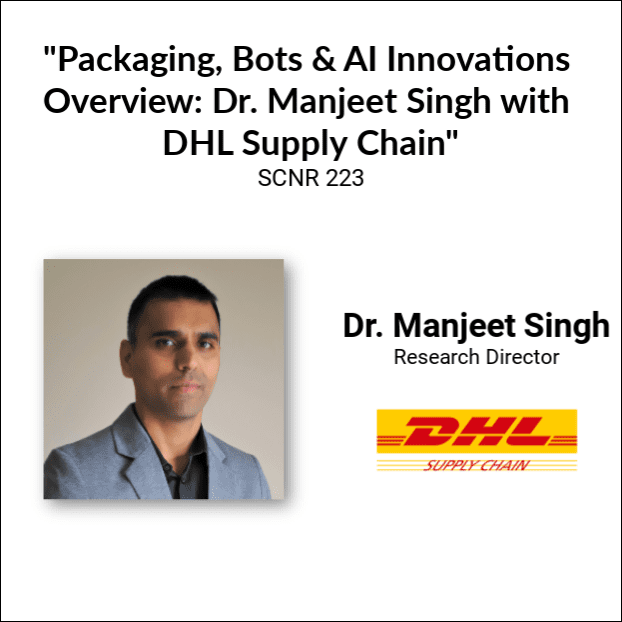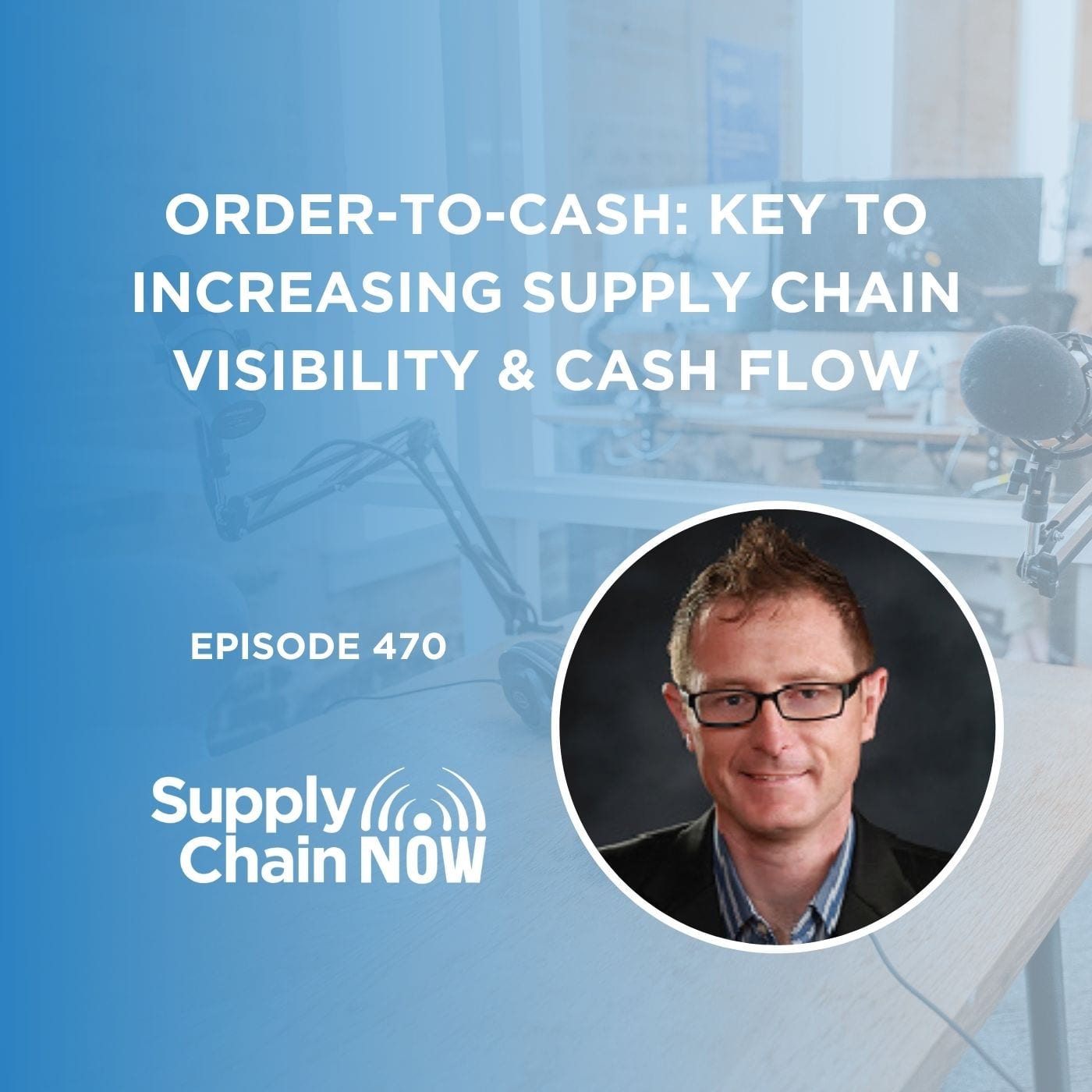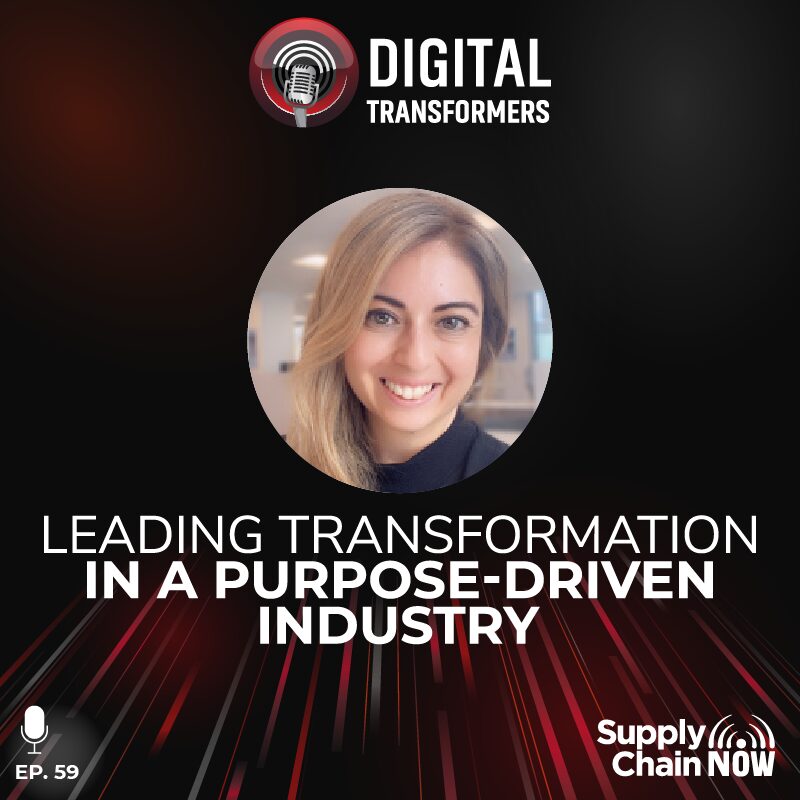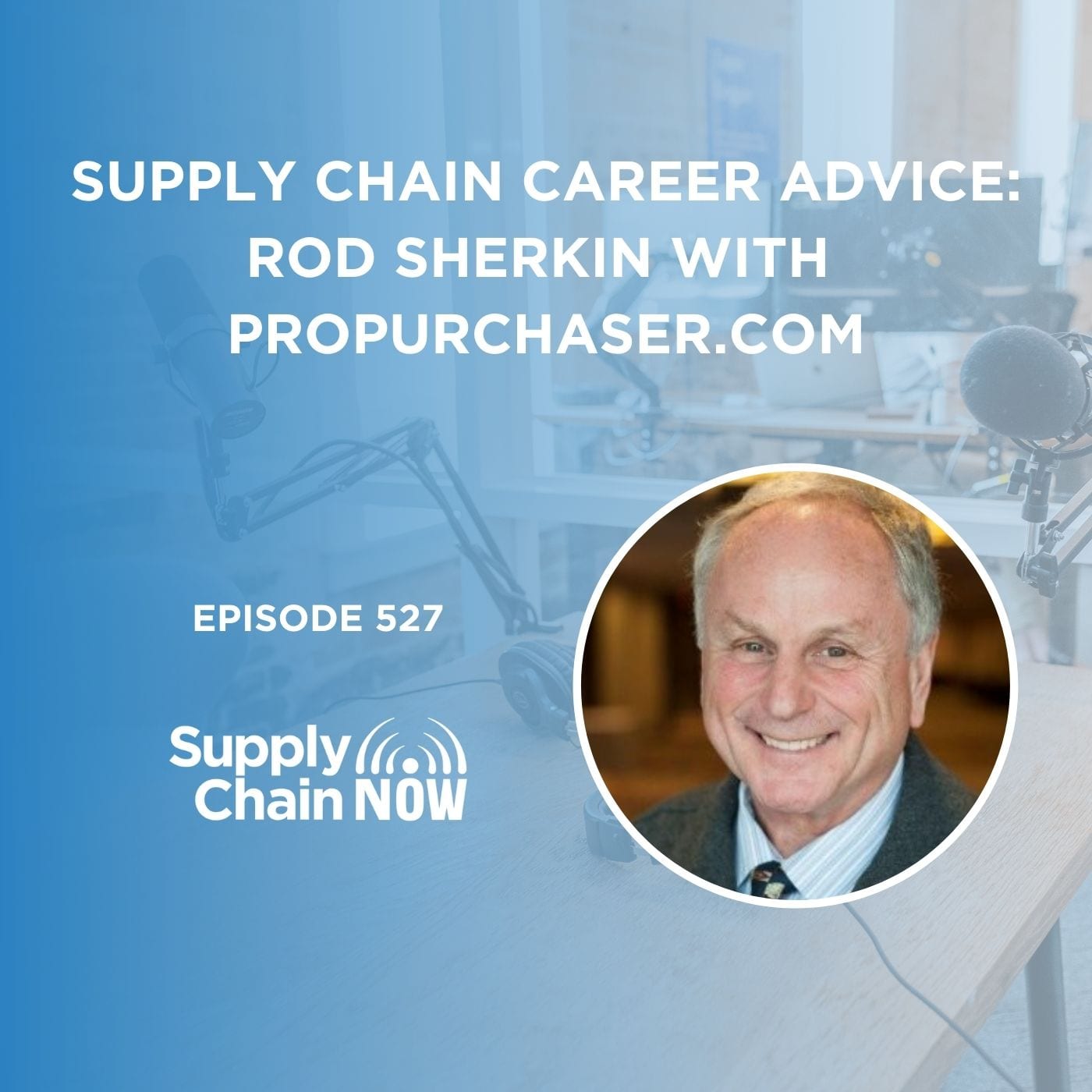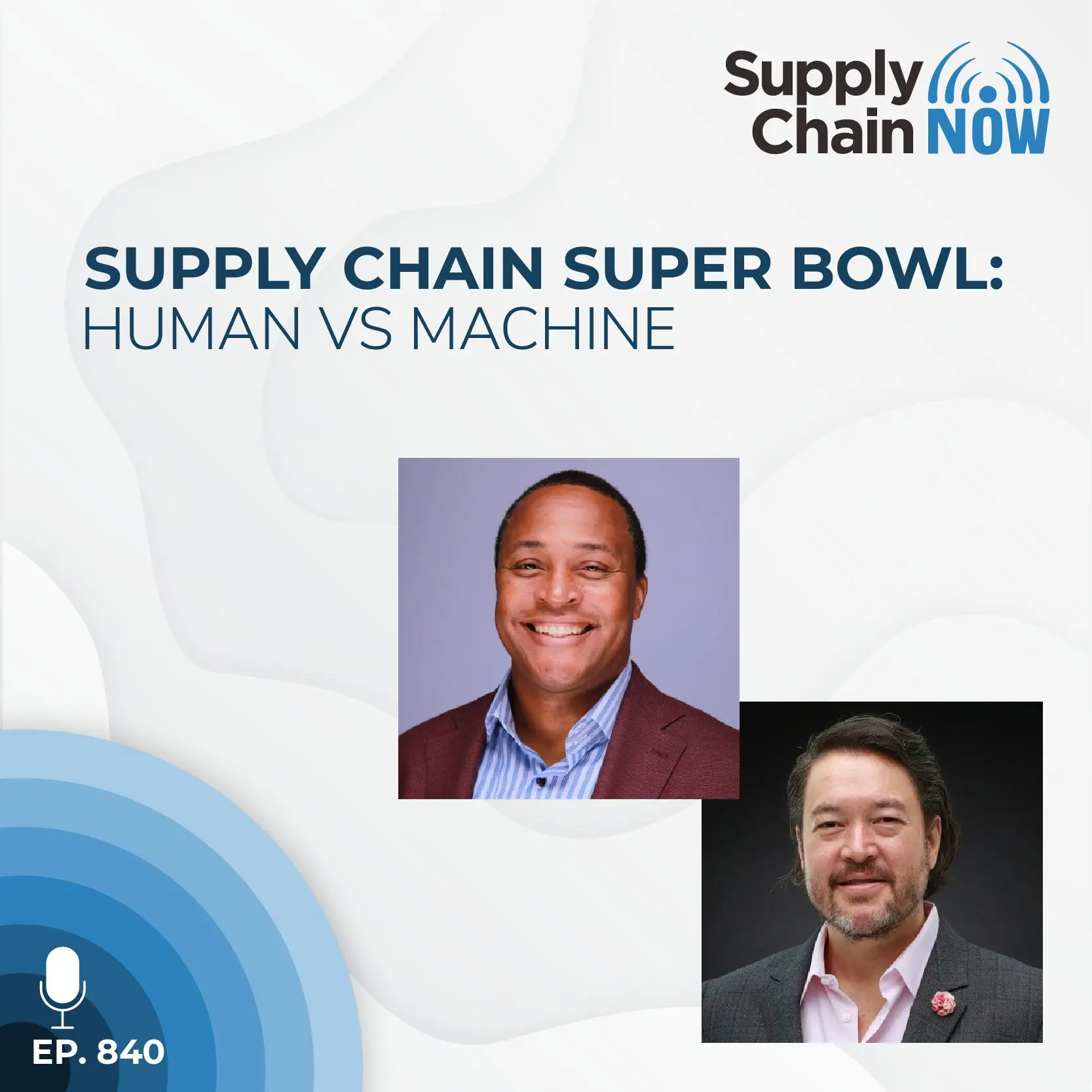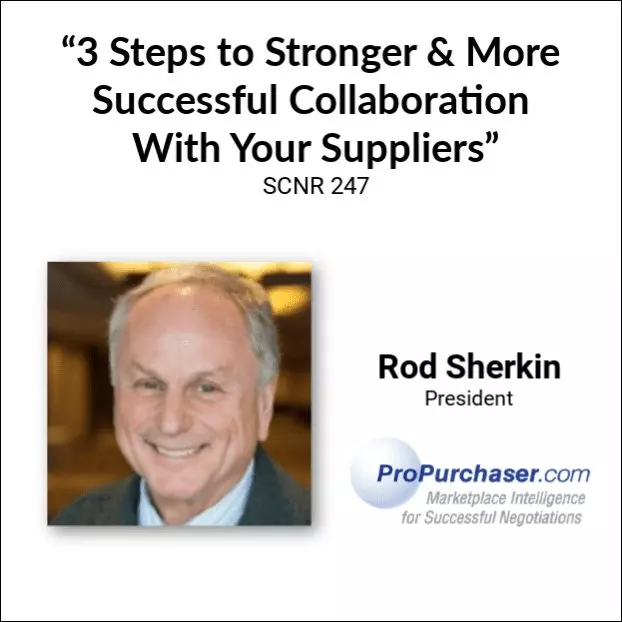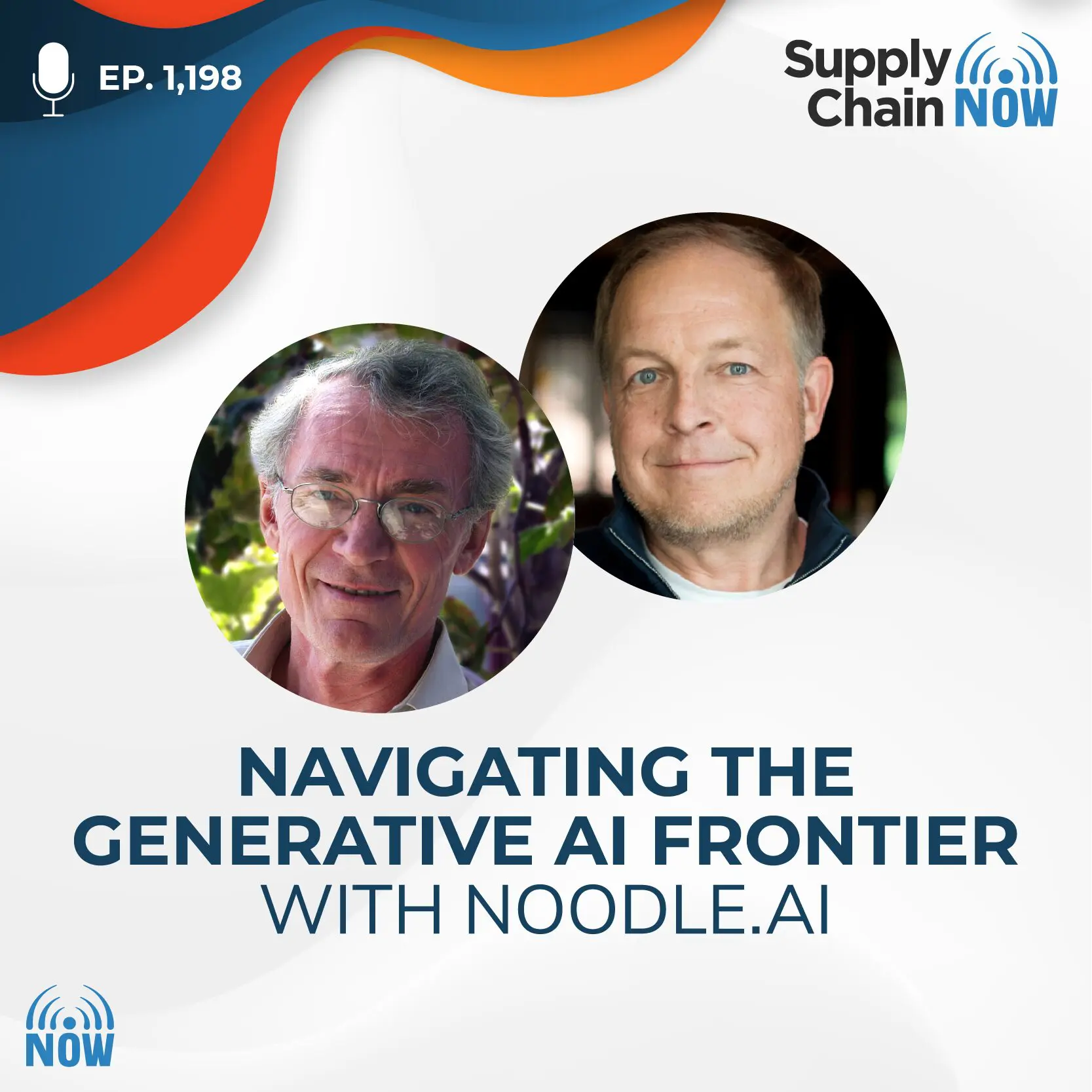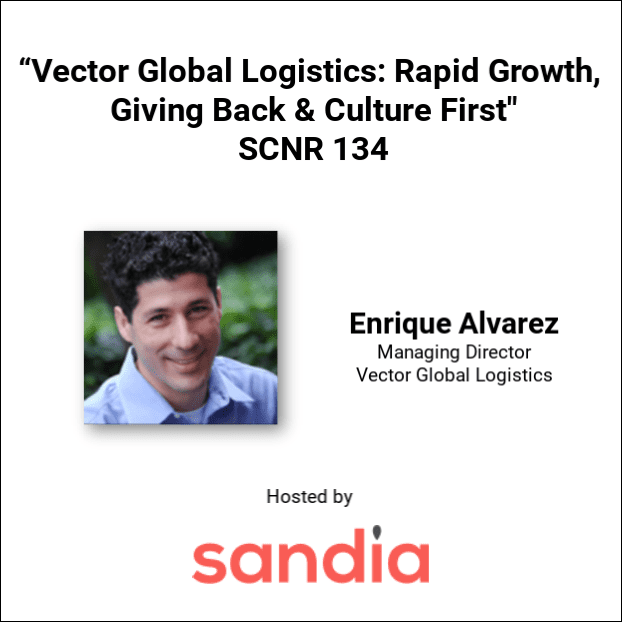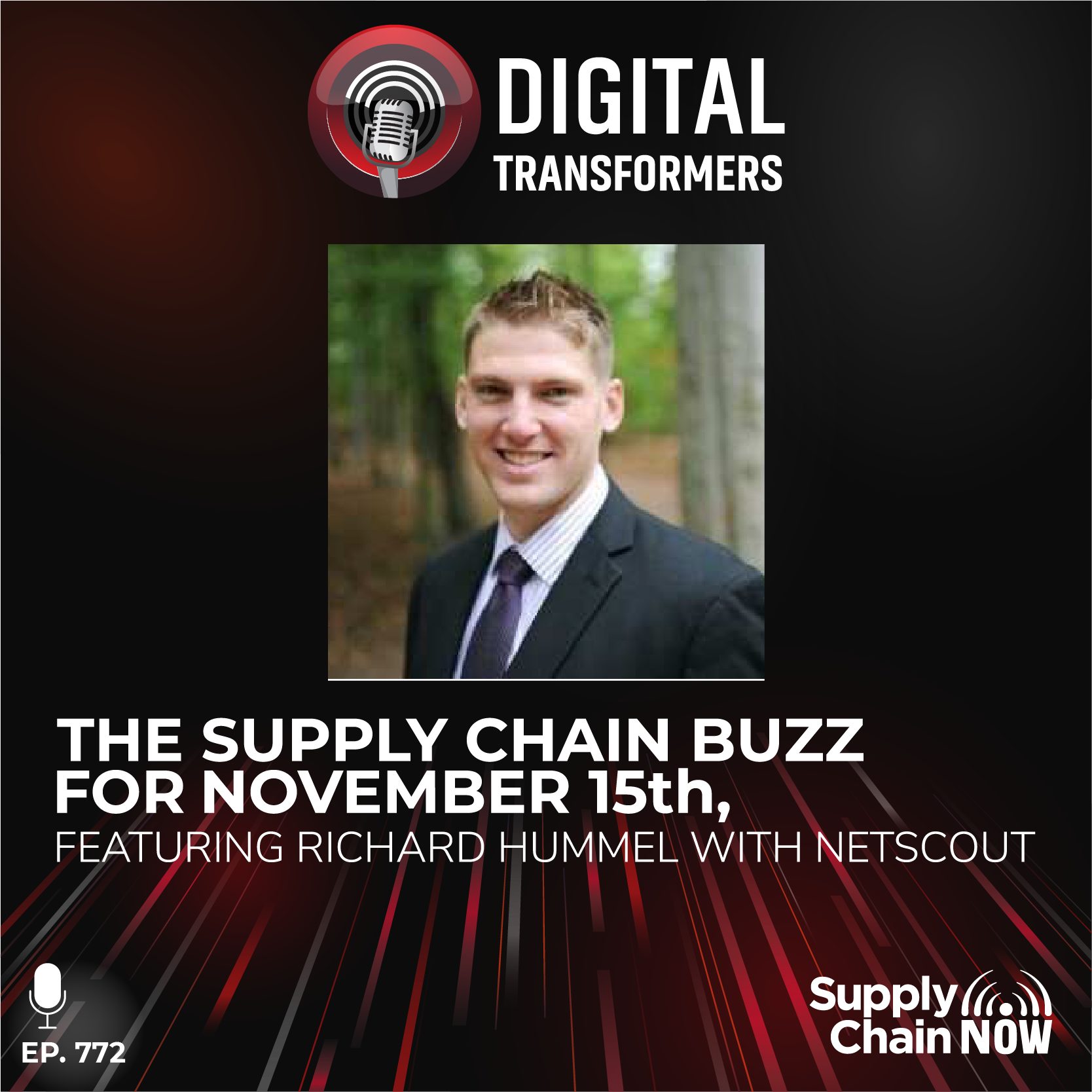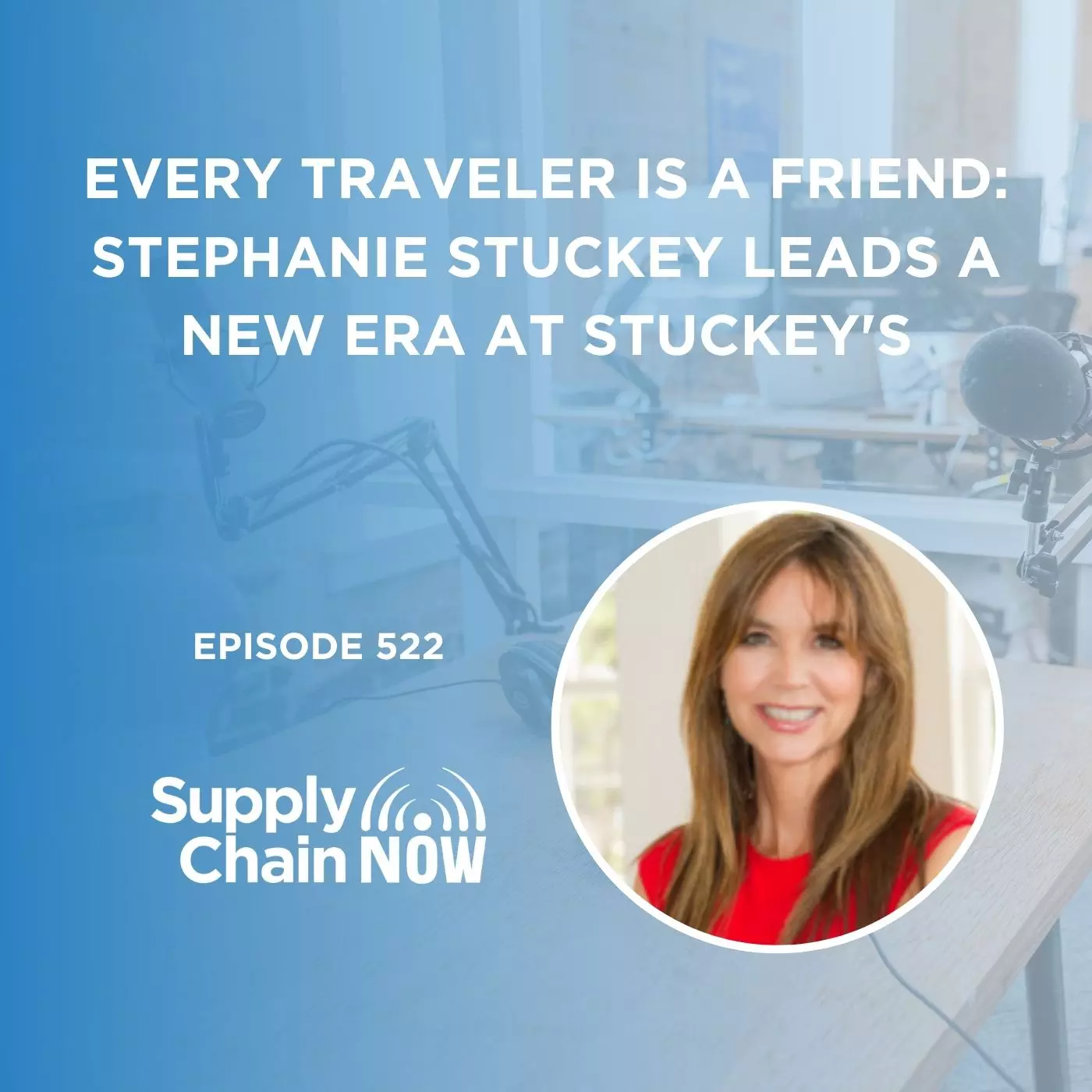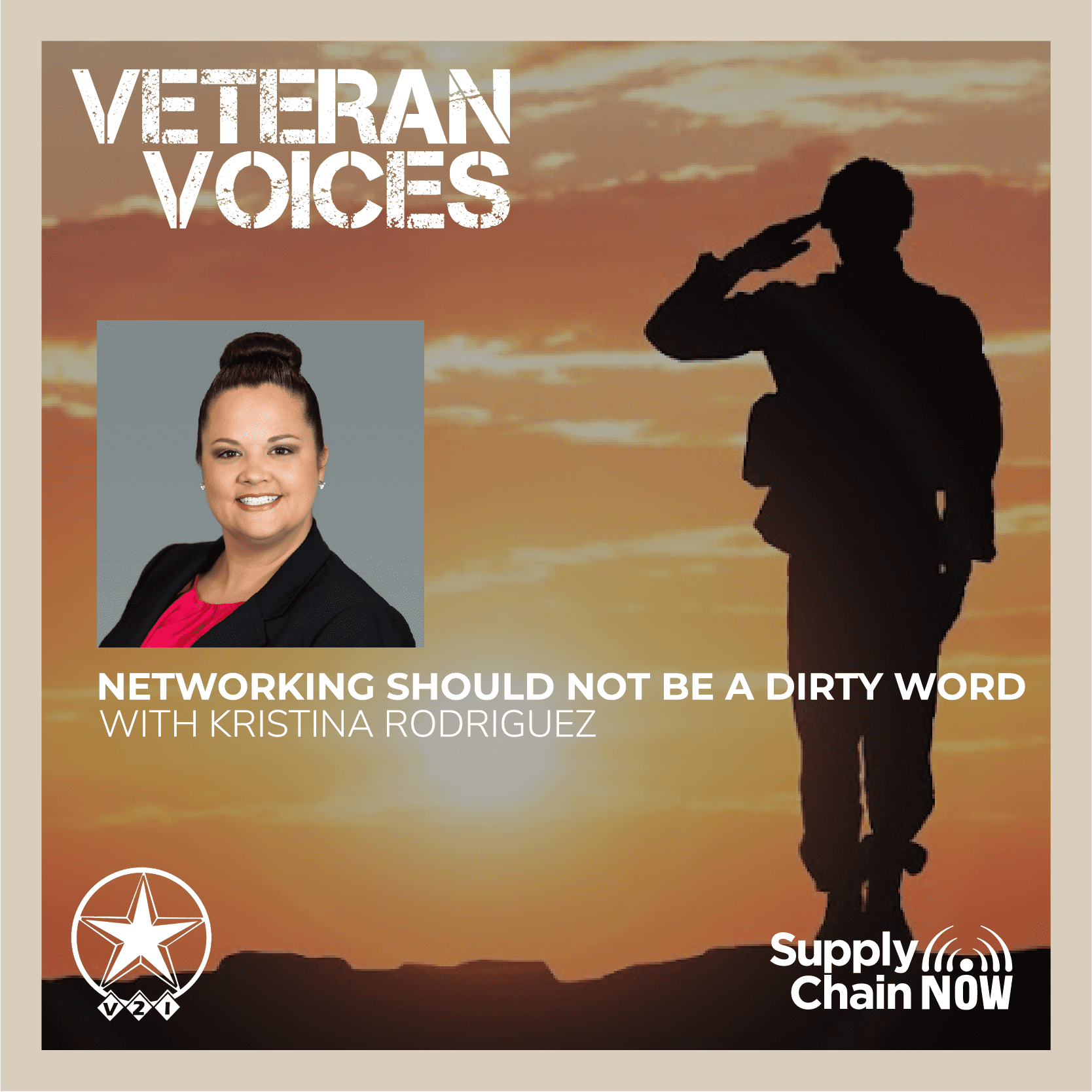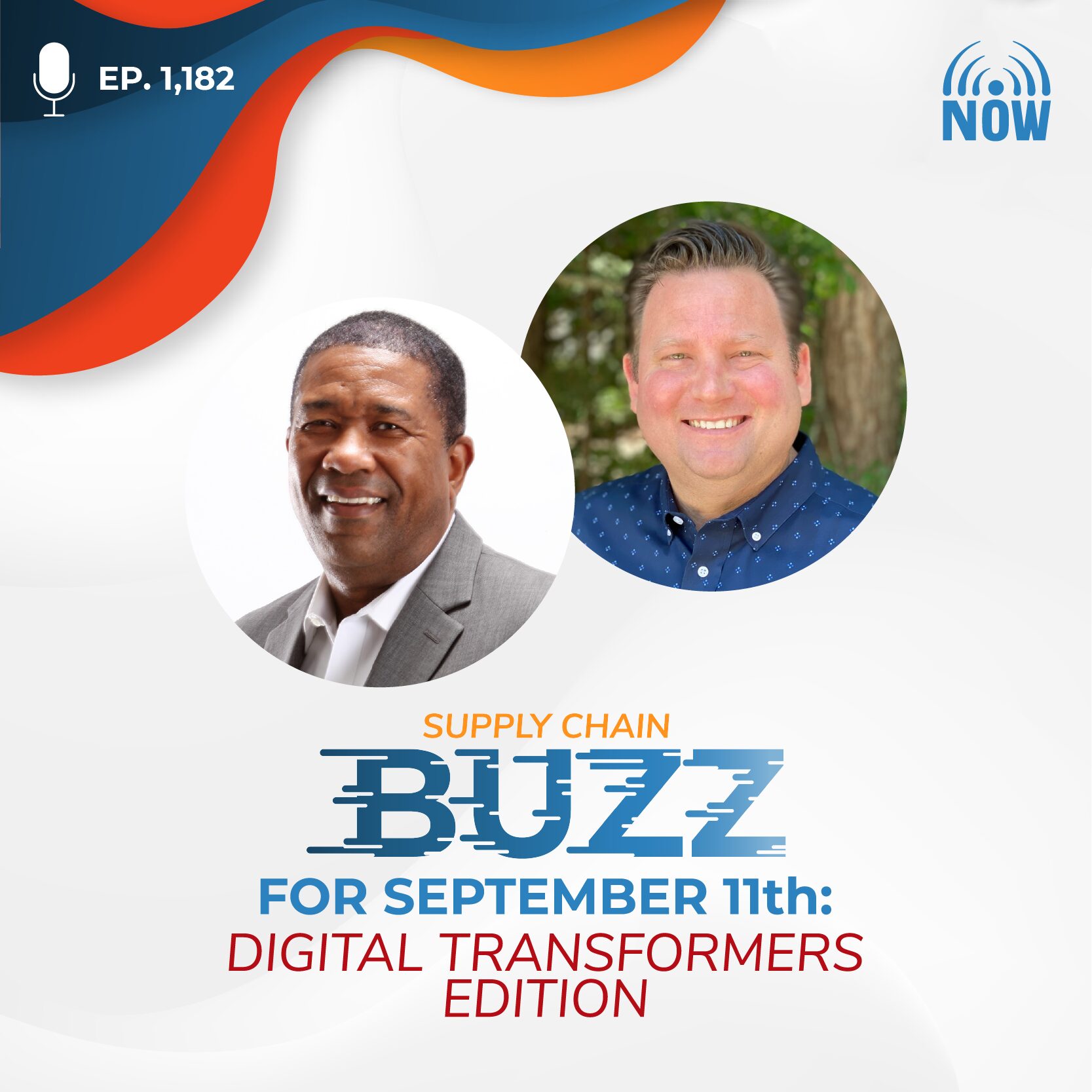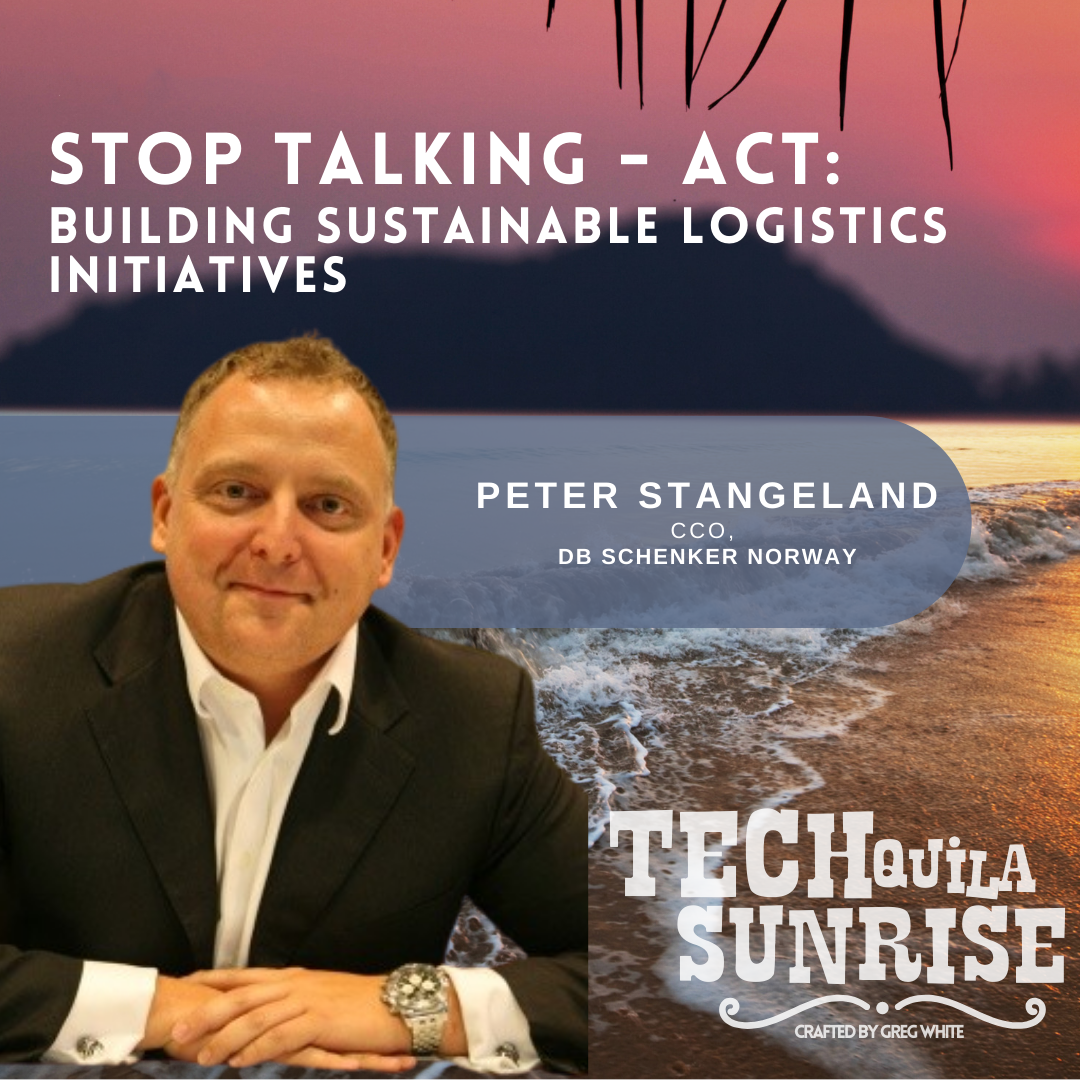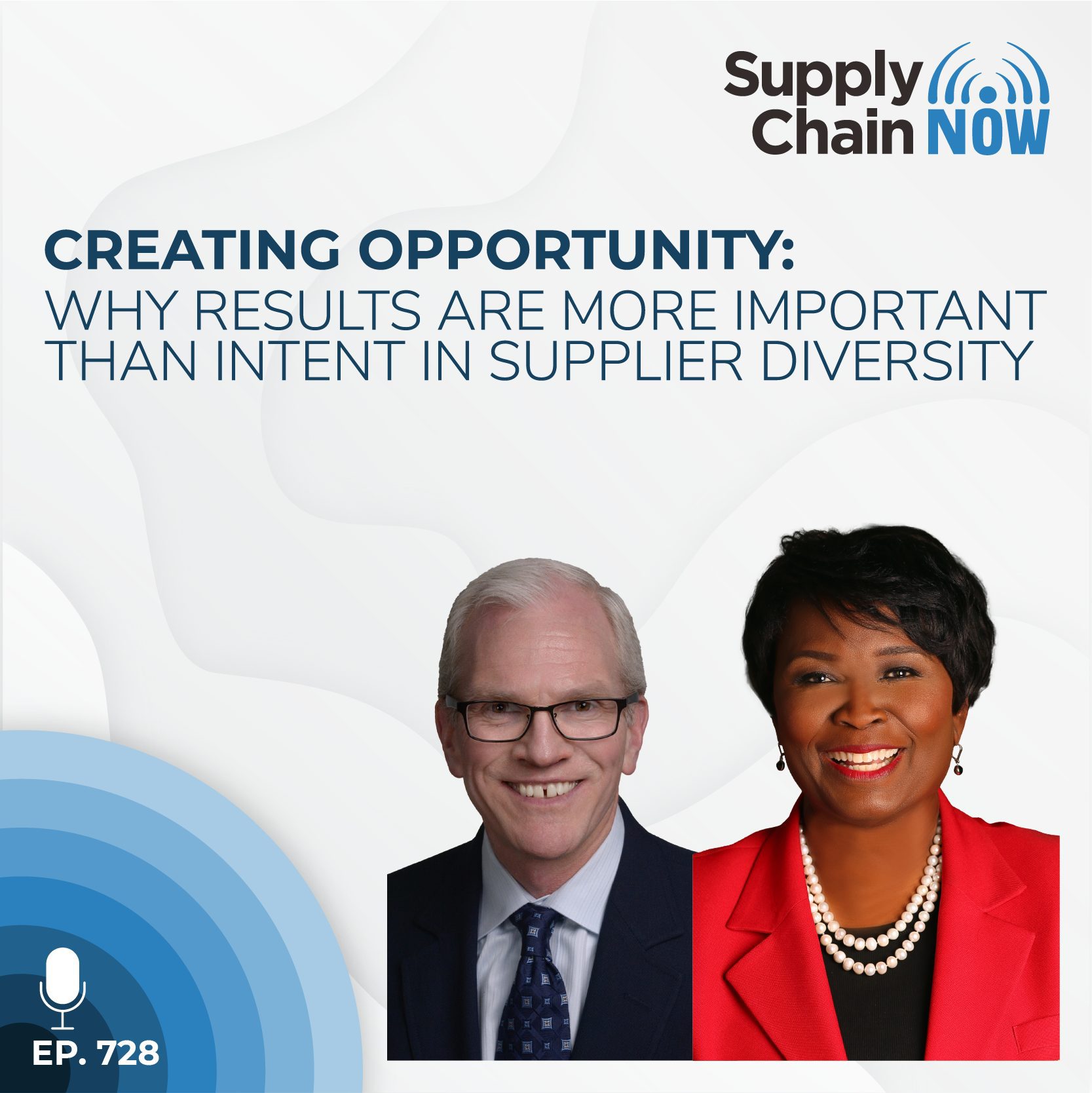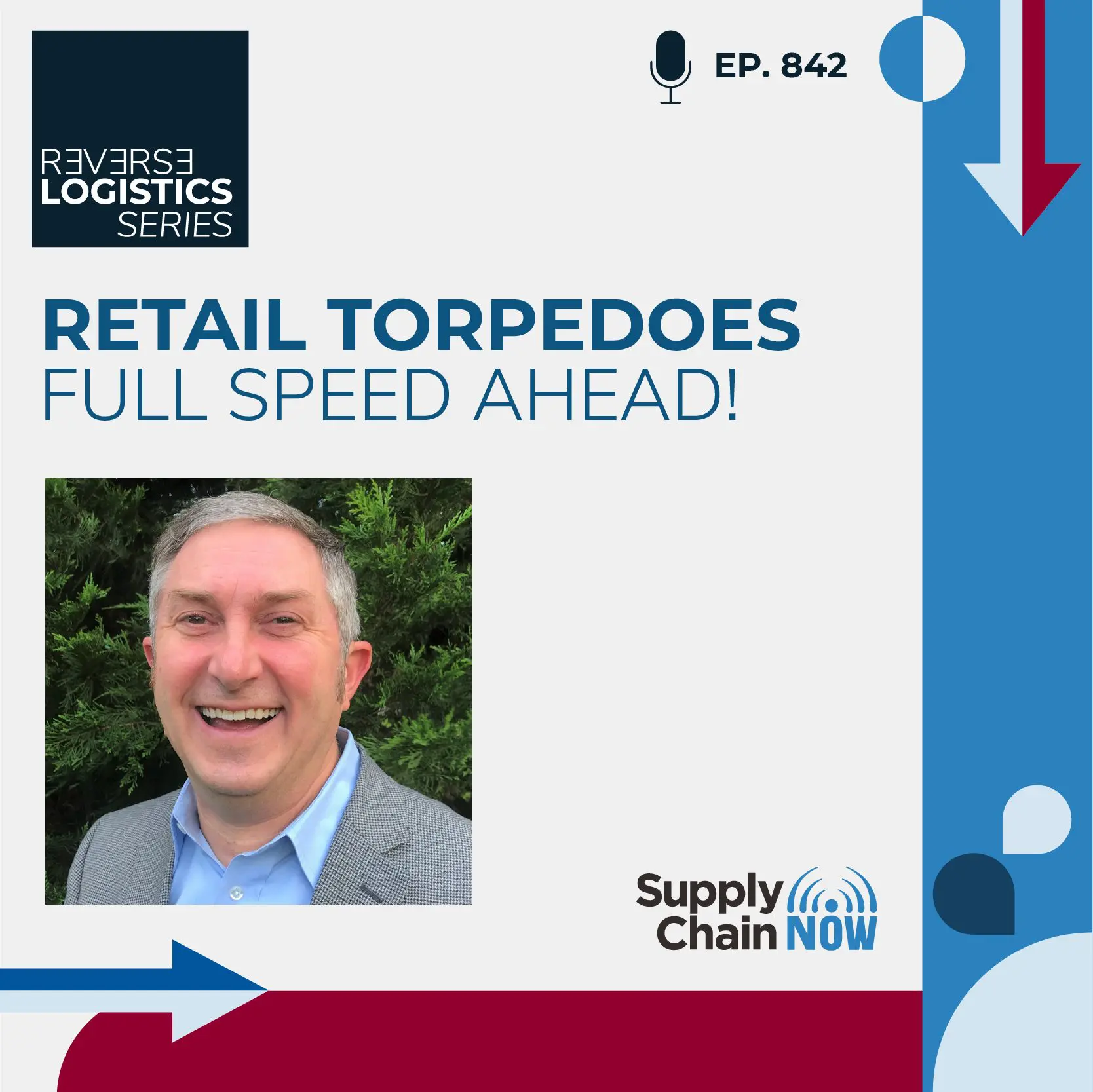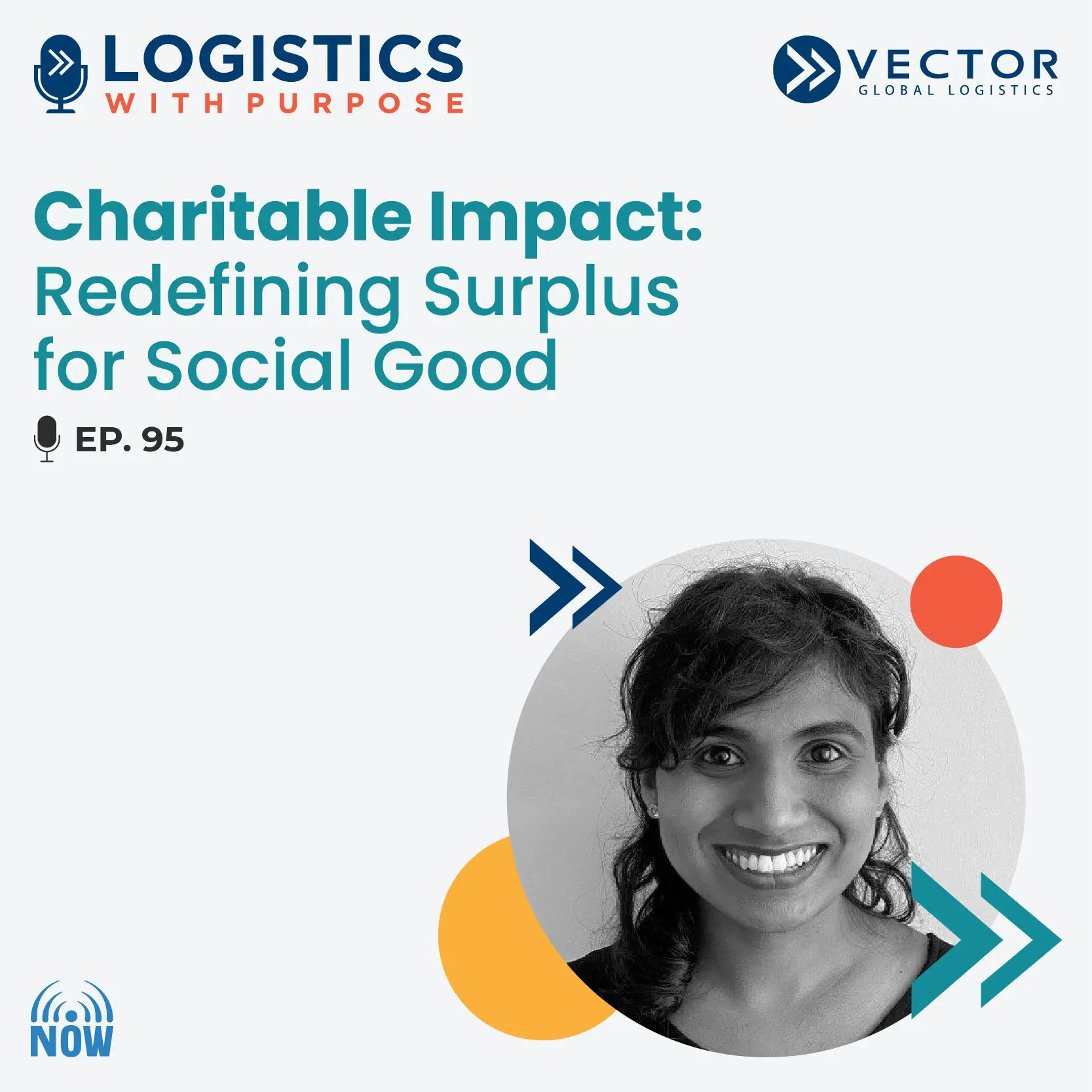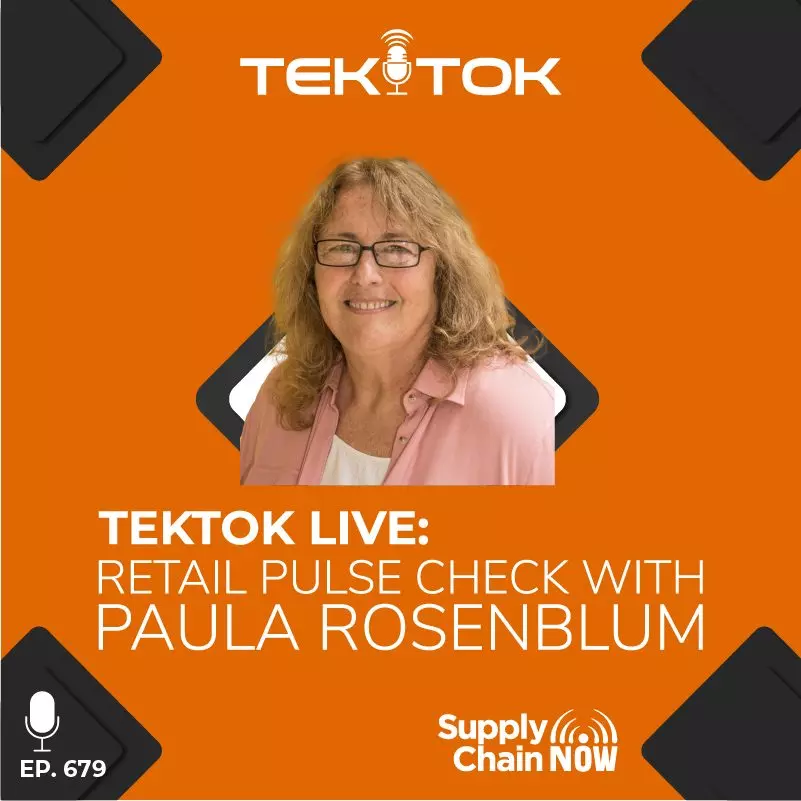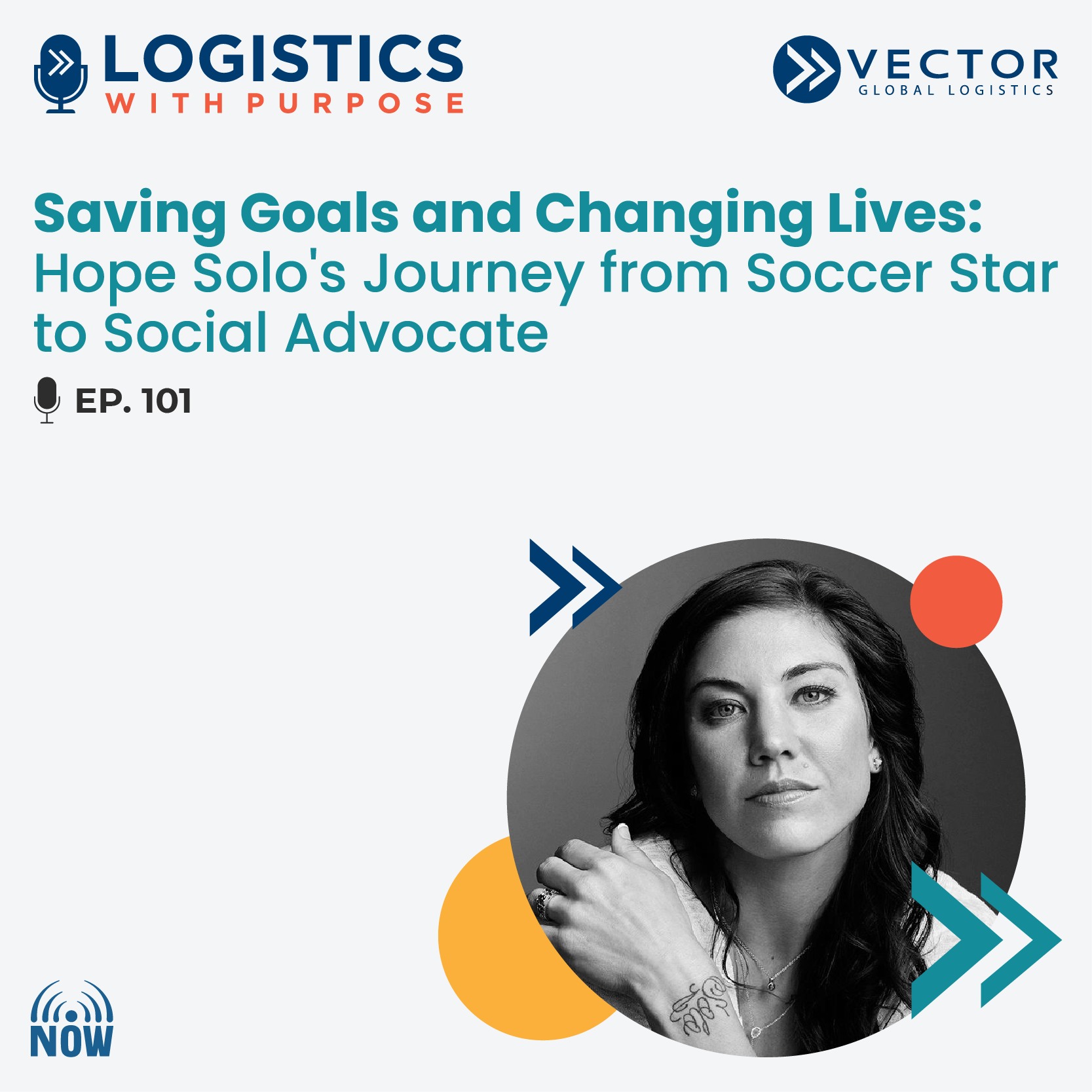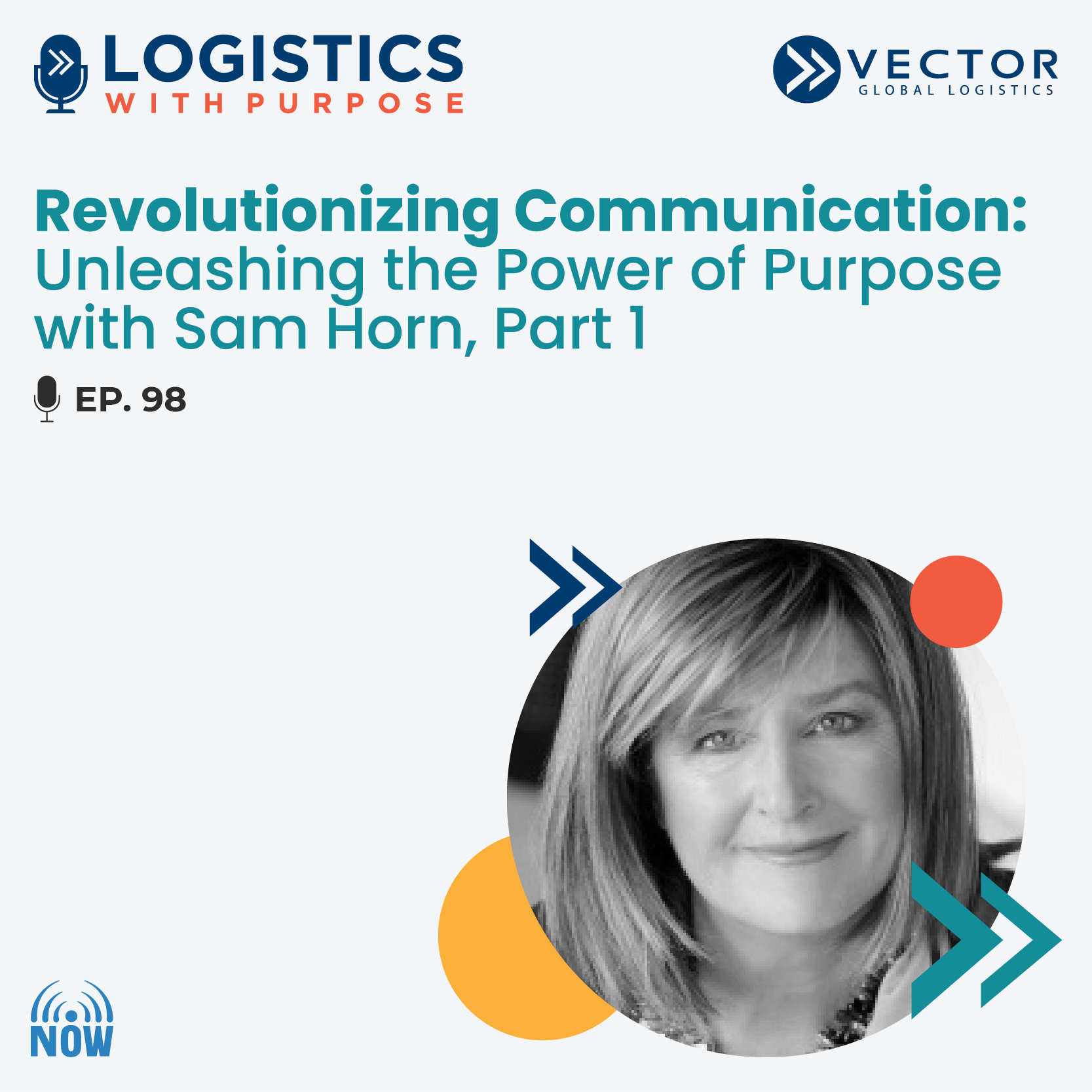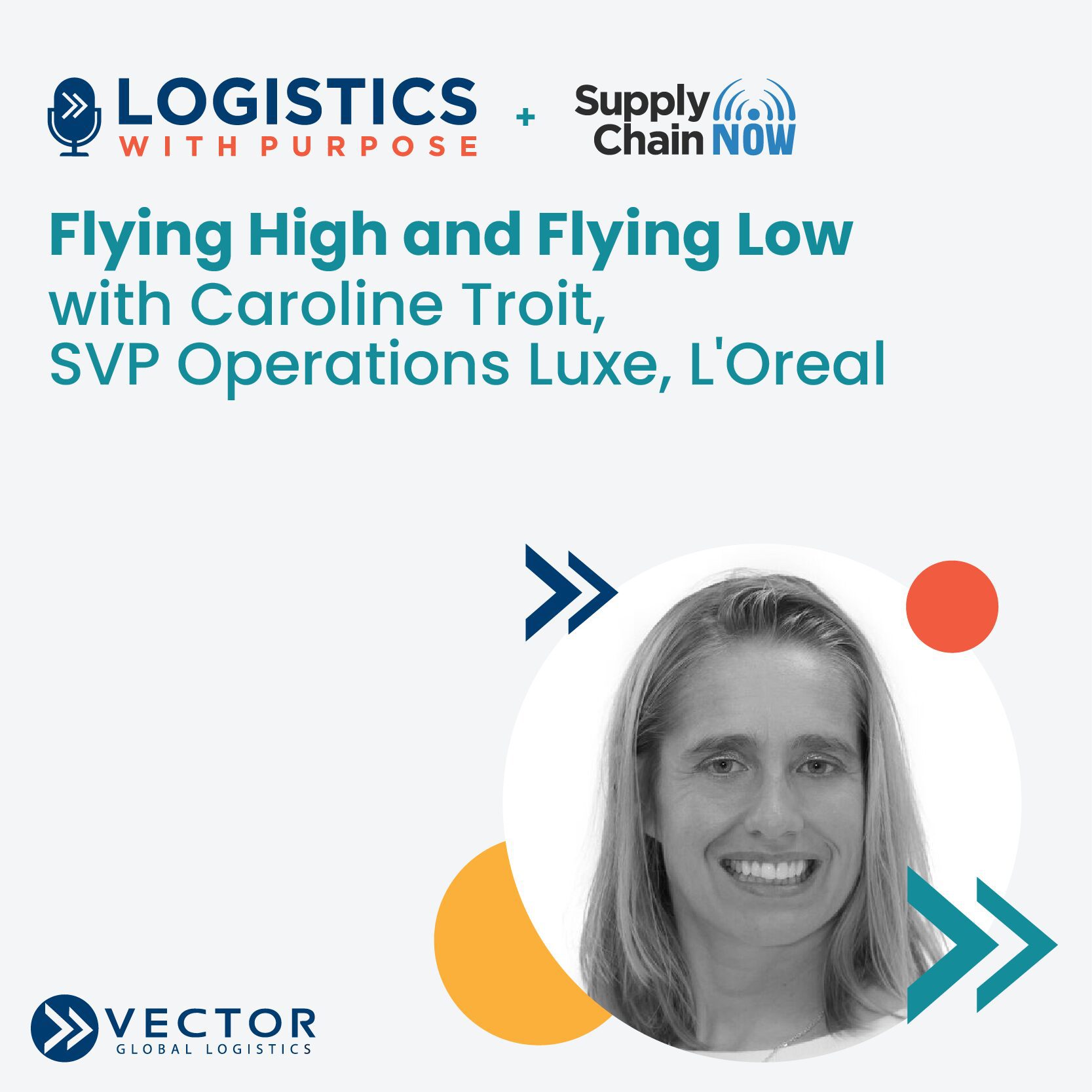
Our purpose as a company is to unlock potential at scale. And the way that we do that is through leadership development and also large group facilitation.
-Jon Berghoff
Episode Summary
In this episode of Logistics with Purpose, John Berghoff, CEO of Exchange, a company dedicated to unlocking potential at scale through leadership development and large group facilitation, joins hosts Enrique Alvarez and Kristi Porter for a discussion about his journey and the importance of conscious leadership.
Listen in as Berghoff shares his experiences growing up in Silicon Valley, his time at Vitamix, his involvement with the Front Row Foundation, and the importance of understanding the psychology of buying and the value equation in sales.
Berghoff also discusses the concept of somatic leadership, which involves understanding our nervous system and how it affects our ability to lead, especially under pressure. He believes that being of service and being a good human being are key qualities for leaders in the future. Join us for this intriguing conversation!
Episode Transcript
Intro/Outro (00:00:02):
Welcome to Logistics with Purpose presented by Vector Global Logistics in partnership with Supply chain. Now we spotlight and celebrate organizations who are dedicated to creating a positive impact. Join us for this behind the scenes glimpse of the origin stories change, making progress and future plans of organizations who are actively making a difference. Our goal isn’t just to entertain you, but to inspire you to go out and change the world. And now here’s today’s episode of Logistics With Purpose.
Enrique Alvarez (00:00:35):
Welcome, welcome, welcome. My Mantric Alvarez, and I’m incredibly excited to be here for another episode of Logistics With Purpose. Christie, how are you doing today?
Kristi Porter (00:00:44):
I am good. I have been studying behind the scenes about our guests today, and I’m really excited about today’s conversation. And again, this is somebody I feel like we should be. Hello, conscious capitalism. Why aren’t we getting a sponsorship here? Because we keep bringing those people on, but the good news is we can always guarantee a terrific conversation when it’s somebody you’ve met at one of those summits.
Enrique Alvarez (00:01:08):
Absolutely. No, it’s been really good conversations, and again, we haven’t really had an interview since a while, so we’re double excited about the opportunity to have this amazing guest here with us. And you’re right, I was reviewing some of the materials and I was tearing up on a couple of those videos, especially early on, and he’ll tell us all the story about the Front Row Foundation, some others. But without further ado, Christie, go ahead. Just give us the honor.
Kristi Porter (00:01:32):
Yes, we are delighted to introduce John Berghoff, the CEO of Exchange, and that is X-C-H-A-N-G for when you’re Googling him later. But John, welcome to the show. We’re glad to have you here.
Jon Berghoff (00:01:46):
Christie, Enrique, thank you. I’m thrilled to be with you. Well,
Kristi Porter (00:01:48):
We’re delighted to talk to you. We’ve had a good pre-conversation. I’m already expecting a few surprises and curve balls, so don’t let us down. Perfect. Good. Here we go. So you have to start us off. We love to ask about people’s history and where they grew up. So tell us a little bit about your childhood and help us get to know you a little better. Sure,
Jon Berghoff (00:02:07):
Happy to. Yeah, so I was born and grew up in the Bay area of California. Actually, Cupertino was my hometown, which yeah, you immediately connect us to the Silicon Valley. And I grew up in the eighties and my parents actually met working at Intel in the early seventies. And one of the things I remember about my childhood was, even though I was a kid, being around that kind of pioneering spirit that lived, and I say still lives in the Bay Area today, it was cool. It was cool. That was a special place to grow up. And then I lived out just outside of Washington, DC for about 10 years and moved here to Ohio. We’ve got the whole country covered. I realize Enrique is in Atlanta, you’re in Albuquerque, and I’m right in the middle. We came out here, but when I took an executive position for the Vitamix Corporation back in, I guess that was 2010 or 11. And when I left Vitamix to found what is exchange today, this was a really good place to have kids and raised a family. So I’ve lived on both coasts and right now I’m really enjoying being right in the middle of the country. So glad to be here.
Enrique Alvarez (00:03:23):
Well, thank you once again for being here, and it’s exciting to hear people’s stories in general. And yeah, you’re right. Your parents met and Cupertino and tell probably the early days of that. So it must have been a very interesting experience for you. Could you tell us, I mean, what do you remember when you were growing up? Can you tell us a story of something that actually used Mark you as a person that you still remember until today?
Jon Berghoff (00:03:50):
Yeah, yeah. Well, both my mom and dad worked and work was intense. They were working in tech during these years where so much is happening. And I remember that intensity brought stress with it, and I think I learned a lot just by default around the energy being in that environment and also some of the consequences, the downside of getting caught up in that type of intense energy. At least that was what I remember the most notable time of my life. That kind of jumps up for me, Enrique, when you ask about years that really formed me or shaped me, it was actually a difficult time when between middle school and high school, my parents moved from one town to another. And because of how the school district lines were drawn, I ended up being in four different schools within a five year period. And I see both of you reacting like, oh, that’s a time in life where that might not be easy.
(00:04:56):
Well, it wasn’t for me. And what ended up happening was I very much struggled, especially all through high school, socially, emotionally, psychologically, and with my studies as well. And I was very fortunate. And depending on someone’s beliefs or perspective, you could call it the grace of a higher power. You could call it luck, whatever you want, that when all of my classmates went off to college, or most of them I did not because I had struggled to the extent that I did not get accepted into any college. And that was very difficult. And I was fortunate that I kind of found my way into an entrepreneurial opportunity in my senior year, and it ended up becoming a way out for me. It was like a saving grace, and that put me on a path that I look back and realize how fortunate I was. So those are some of the memories that jump up.
Enrique Alvarez (00:05:58):
It’s incredible how one door closes or you think that it’s closed and true in reality, you’re actually opening a bunch of others that actually led you to who you are now. And speaking of colleges, I’m going through the application process with my son right now, and it just, it’s tough. I don’t know how it was before, but it seems like a lot of pressure, especially at that younger age. So kind of doing what you did is maybe even advisable at that young age. Right?
Jon Berghoff (00:06:26):
Well, yeah. It’s interesting you say that because I think today more and more folks are looking at educational institutions, looking at who knows where the future of work is going, and there’s options, right? Information and education have been democratized and commoditized in certain ways, and yet there’s obviously extraordinary value in any path that people take to intentionally keep learning. So yeah, there’s not one way to do it, that’s for sure.
Kristi Porter (00:06:55):
Yeah. Well, before we move on to your professional journey, I have to ask you, you had the entrepreneurial pioneering spirit in Silicon Valley and in Cupertino, and then DC not known for pioneering and entrepreneurial, but very much culture shaping. And so I’m curious as to, that’s quite a juxtaposition, but I’m curious as to how, if you reflect back on that time, how you see DC shaping you as well.
Jon Berghoff (00:07:24):
Yeah. Well, when I lived in Washington DC I lived in Falls Church, Virginia, just outside of dc. And I had done well enough at a young enough age that when I moved out there, it was largely just to find a spot on the map because it wasn’t to go to school that was as far from my parents as possible. There’s not some virtuous angle to this. And I was kind of a loner. I had the ability to just in my early twenties, float around. And what ended up happening was I got really into trail running, and that got me into fitness. There’s some beautiful natural places out there. It got me into fitness, and there was a point where I realized I got to go get a job. So I found an opportunity at a health club in the Washington DC area, and it was an upscale, a health club tennis club.
(00:08:28):
And that was an incredible experience. And while I was there, I once again had this entrepreneurial bug and thought, I think I’m psychologically unemployable. I had somebody gave me that term, and I thought, I don’t know what that means. But my entrepreneurial bug kicked back in and I said, I got to go find a way to do things on my terms. And so what happened is, while I was living there, and we had a couple of young kids at the time, I landed a client, the Vitamix Corporation. They make high-end blending equipment. I was maybe 24 years old at the time, and they were a almost 90-year-old company and iconic global brand. And somehow they had hired me to help ’em with some sales and leadership consulting. And after a couple of years working with them, they sat me down and said, would you come join as our head of sales for their largest revenue and profit center? And at the age of, I think 26 or 27, I thought this would be amazing. And so that’s what took me away from DC here to Ohio, was to work for this incredible company who I’m still very close with. The family. When I joined them, they were a fourth generation family owned company, which is very rare. And I got to see how had they done that and it was their culture and their product and so many other things. So
Kristi Porter (00:09:52):
That’s very cool. Well, before we, I’ve already learned more about Vitamix than I knew, and I want to circle back to that in a minute. But first of all, in that entrepreneurial vein, one of the early things you did as well was you were a board member of the Front Row Foundation. We love talking about causes here, obviously. So please let us know more about the Front Row Foundation and kind of the impact it had on you.
Jon Berghoff (00:10:19):
Yeah, so a few friends of mine, Jamie Bogger and John Roman sent me a physical letter in the mail. I remember this was somewhere right around 2004, 2005. And I remember reading this letter and they said that they had this idea that they wanted to find a way. They were kind of at a similar stage as I was early in my professional life. They had some bug, something that inside of them that said, we want to use the little means that we have at that time to do some good in the world. And they got this motivation to start a wish organization, and they thought, let’s find a way, kind of make a wish. But the difference was it was anybody any age, and they called it the front row. It eventually became known as the Front Row Foundation because they wanted to send people who were battling life-threatening conditions, and along with their family and friends to experience some sort of experience of their dreams in the front row.
(00:11:21):
And I thought, that’s super cool. And I remember at that time in my life feeling like it was like an excuse for me to pause and to think about what purpose am I living into that’s beyond just my own self-interest. And I was fortunate that they founded this thing that they asked me to help them in the early days, and we actually just closed that whole chapter, as you may have seen in the last year. So for about 17, 18 years, we sent hundreds of folks to these events to create these experiences. And what was beautiful about the front row is it wasn’t just about we have this vehicle to give back and create these memories. That was wonderful, but it actually became a philosophy for us to think about appreciating every moment and taking nothing for granted and being moment makers for others. And so it took on a life of its own and how it inspired us way beyond just the wish organization that it was.
(00:12:25):
So thanks for asking. It gives me joy to think about the many memories, what we got to do there experiences that stand out to you. Yeah, yeah. It was probably in our first couple years of existence, there was a family that we got connected to, and they had a daughter, and her name is Sophie. Sophie was three years old when we first got connected, maybe four. And she was diagnosed with unfortunate brain tumor, and Sophie loved Kelly Clarkson. And somehow this whole thing was all volunteer driven. We were finding pennies in the couch cushions to figure out how to do things. We were all in our mid twenties, and so many of the magical memories were because somebody who knew somebody who knew somebody found a way. And so somebody who knew somebody who knew one of us knew a tour manager for Kelly, got us all connected.
(00:13:23):
And I’ll always remember this was out in, I think it was Atlantic City, New Jersey sometime maybe around 2005 or oh six. I could mix the years up, but we were able to take Sophie and her mom and her dad to see a Kelly Clarkson concert. And I’ll always remember it because after the concert, they had arranged for this back row experience or backstage experience and we’re backstage and this 4-year-old who’s battling this health condition, she was asleep, and we were all devastated. She’s going to sleep through this meet and greet that we had worked for months. Well, Kelly walks into the room. Sophie was in her mother’s arms asleep, and as soon as Kelly’s voice speaks up, Sophie’s eyes open, she looks over, she smiles. Kelly walks over, picks her up, holds her in her arms. And that was a moment in time that I’ll remember for my whole life, and it’s not easy for me to finish this story, but the most beautiful thing about that moment was just several months later, and this was true for 50% of all the recipients we ever helped.
(00:14:33):
They ended up passing on sometime after we created a memory. I remember being at Sophie’s celebration of life, and I was caught off guard. I was surprised when I walked up. It was an open casket, and her parents had put around her neck the VIP pass from that concert. And in that moment, what I realized we were doing was not just about helping people battling these health conditions, but it was about creating memories for their family and friends to carry with them forever and ever. Thanks for letting me share this story. That’s one that certainly stands out.
Enrique Alvarez (00:15:14):
Wow. Yeah. Now that you made us cry, I need to somehow go back to your professional career and tell you a very dumb question in comparison to what you just described. But you’re right. It’s amazing though, and it’s something that I have found out through my life as well. And the more you give, the more you get, right? So you’re thinking that you’re setting up this organization to help others and you are helping them, but in reflection, probably you were as changed as many of the other people that Sophie knew at the time.
Jon Berghoff (00:15:47):
Absolutely.
Enrique Alvarez (00:15:48):
Absolutely. And someone that’s 4-year-old and that came to this world with so little experience actually ended up impacting so many people. You included years and years after that.
Jon Berghoff (00:15:59):
Yeah. Yeah. Well, Enrique, I met you through the Conscious Capitalism organization. We may end up talking about that, but it’s a good example where we as several pretty young entrepreneurs, once we had the kinds of experiences that I just described, it gave us a motivation and it gave us a fuel to come from a place that we weren’t previously coming from. And that was indirectly my introduction to this idea that I as an entrepreneur can also be a force for good in the world, whether it’s directly through my work or indirectly through how I leverage the financial fuel that I gain through business. So yeah, it’s all connected. I guess.
Enrique Alvarez (00:16:48):
Well, going a little bit more into the business side of things, you mentioned a little bit about your experience with Vitamix and how incredible that was as well, and you were brought on the sales side of things. And so there’s a lot of books written about selling and how to be a good salesperson, how to close new accounts. I mean, in your experience and with all the experiences you’ve had until that point, what makes a good salesperson? How do you sell anything? And if you can relate it to the Vita makes experience, that would be great.
Jon Berghoff (00:17:20):
Sure, sure. Well, I think there’s different types of selling, but there’s also some maybe universal realities. And in business, whether we sell B2B or as the case was in Vitamix, it’s both where we’re managing partnerships with the largest retailers in the world, and that’s its own form of selling. But then we also have salespeople that are actually out there selling directly to consumers through different channels. And I think where there’s some universal truths in all these environments is understanding that whatever any of us offers, at the end of the day, there’s some sort of value equation. And maybe it’s crystal clear in one organization, maybe it’s not in another, maybe it should be, but this value equation, there’s something that motivates any of us to make a buying decision. And on the consumer side, it’s not too tough to realize. There’s some fundamentals that are always at play, and we used to always look really closely at not how do we sell, but how do we understand the psychology of buying?
(00:18:24):
Because the more we understand that, then we become more professional and skillful in how we sell. And so when it came to Vitamix, it was remembering that our product has all these features, and this is like the 1 0 1 sales training, and then it goes from here, but remembering that people don’t buy because of the features they buy because of the benefits. And then the more sophisticated we got in our understanding of that, it was realizing that they don’t just buy because of logical benefits, but there’s also emotional benefits. Now, someone could hear this and say, well, that all might be true selling consumer products. But I would argue in our work today, and since then I’ve learned in selling to businesses that, well, I’ve never actually had a conversation with a business. I’ve had conversations with human beings. Absolutely. There’s always an imperative for an unending desire to cultivate emotional intelligence, social awareness, to be better at selling.
(00:19:26):
There’s blocking and tackling and all the logic, but at the end of the day, it’s the human skills. And we’re living in an age now. I look at my kids growing up. They’re growing up in a way where they’re more connected to their peers digitally than I ever was, but I can see how easily they are not going to naturally have to develop some of the social skills that I kind of had no other way to interact. So there’s a really interesting tale that will all tell 20, 30 years from now when we look back and see how generationally are certain skills going away and other ones growing, their ability with technology is going to far surpass mine. So it’s not all bad. So I’ve taken this conversation in a very different direction than Sally. Well,
Enrique Alvarez (00:20:13):
We could have a whole podcast around what you just mentioned, right? Differences, exact topic. So it’s all relevant and it’s totally true. And at the end of the day, it’s human interaction and it’s great. So thank you for that. Yeah,
Jon Berghoff (00:20:30):
I’ll share if I may, it reminds me, so here in our organization, exchange is a very small company. We’ve got 14 team members. And I notice that with our team, I have to be intentional and remind others, remind myself to be very mindful in how we try and influence. It’s so easy to try and influence in important relationships via an email or a text, and just realizing, wait a minute, if it’s important, we got to bring it belly to belly, face to face, which doesn’t mean we have to get on a plane. We used to think that even just three years ago. But look, this is an intimate moment right here, and we can see here and feel each other through this platform. But yeah, every day I am trying to remember how important the human side is to all this and use the technology to amplify it like we can right here, not distance ourselves. It could be either.
Kristi Porter (00:21:25):
Absolutely. Well, it’s clear from what we just talked about that you enjoy teaching, you enjoy imparting. And so you’ve had incredible experiences that we’ve talked about so far. But then sometime during this time period, you went back and got an MBA from the weather for Weatherhead School of Management at Case Western Reserve there in Cleveland, and then you became a professor. So some successful, you’ve had some success at this point. You’ve had some really incredible experiences. So one, why go back to school, and then two, why take on the professorship?
Jon Berghoff (00:21:59):
Yeah. Well, and there’s an interesting gap in the story that could confuse somebody like, wait a minute, what do you mean? You got an MBA? I thought you never went to college. Well, I didn’t, and I did. What happened was while I was at Vitamix, so if you go back earlier in our conversation, I was at this very interesting stage in age where on one hand at 26, 27, I had 200 people supposedly reporting to me and tens of millions of dollars of revenue. I had one little voice in my head that was way to go, you’re the man, you know what you’re doing. But I had another little voice that was maybe just as loud that I can certainly confessed today, was telling me, John, you have no idea how to do what you just got yourself talked into. Which by the way, 15, 20 years later, whatever it is, I am realizing that’s actually okay.
(00:22:51):
We’re living in a world where none of us are going to know how to deal with all the things you’re facing. But at the time, I was very insecure about it. And Christie, you’d asked about how I got into my relationship with the Weatherhead School of Management. Well, my first week on the job, I had a few key moments that really helped me, and one of these was Jodi Berg, who at the time and was the CEO, she’s still a dear friend, was the CEO for decades, just recently retired. Her great grandfather had founded the company, which made it all very special. Jodi sat me down and she said, John, listen, I know you’re probably looking at your role and you’re looking at what you are tasked with being responsible for. And she said, lemme make something really clear. Leading the kind of complexity. And through the kind of change that you’re looking at, you’re not supposed to have all the answers.
(00:23:49):
And I literally remember the moment, the conversation, I was able to breathe more deeply, and she was the first person who introduced me to this idea that leadership is not about a few of us having the answers for everybody else in today’s world. It’s really about knowing how do we ask the kinds of questions and invite in the voices of as many others so we can tap into the intelligence, the strengths, the solutions of everybody else? And what she had pointed me to is that that was actually connected to several different bodies of teachings from some really legendary pioneers in organizational behavior and in leadership out of the Weatherhead School of Management. And so I said, I want to keep learning from some of these folks. And so they gave me a chance to interview, and they let me go take a gmat like, we don’t know that you can pass anything.
(00:24:39):
And I ended up studying, I got an executive MBA at leading large scale change through Case Western Reserve University. And before I was done with that program, one of my professors, Richard Boy, who to this day is considered one of the global thought leaders around emotional intelligence, he actually co-authored Primal Leadership with Daniel Goldman and Annie McKee back around the turn of 2000. And he saw me give a presentation in class about what I was doing at work every day at Vitamix. And he pulled me aside afterwards into his office and he said, Hey, what you’re doing, like real world practical stuff, getting hard results. We had an incredible growth journey. We grew from 200 to 600 people, 40 to almost 200 million in about four years. And it’s not because of me. We had a product, we had industry trends, we had an incredible team.
(00:25:32):
I like to say, I just didn’t screw it all up. Yeah, I’ll take a little credit for that. But Richard watched me talking about how we were very thoughtfully leading in an emotionally intelligent way, at least we thought we were. And he agreed, and he said, John, you ought to come teach this. So I don’t even think I should be called a professor. I was like an adjunct teacher in their executive education program. And he said, you come here, we’ll fill the room with folks and you just tell ’em what you’re doing at work every day. So that began how I started teaching leadership and then eventually influence skills through their executive education program at the Weatherhead School. So that’s how that all happened.
Kristi Porter (00:26:12):
That’s amazing. I, I’m going to throw you a totally curve ball question now.
Jon Berghoff (00:26:16):
I love it as my favorite.
Kristi Porter (00:26:18):
Yeah. So I had no idea Vitamix was that old. I saw the dates and he was like, oh, well, that’s when Vitamix was going through the roof and it was everywhere. So to me, it reminds me now of what Stanley Cup is going through with their thing and having been a 90-year-old company or whatever, and then all of a sudden they’re growing exponentially and trying to figure it all out. So let me ask you professor and person who’s been in that position, what advice would you give to Stanley as they’re trying to navigate this and continue on with that growth?
Jon Berghoff (00:26:51):
Oh my gosh, I’m laughing because
Kristi Porter (00:26:54):
We can cut this out later if you need to.
Jon Berghoff (00:26:55):
No, no, no, no, no. This is where this finally gets entertaining. No, I’m laughing. I got a picture of my kids in front of me here and who’s most interested in the Stanley Cup. For some reason, all my daughters in middle school are like, we have to have a Stanley Cup. I’m like, where did this come from? Oh my gosh, I’m the last person on earth who I think has answers for, I think they’re fine. I think, well, I will tell you what I learned at Vitamix that I think any 90-year-old or 90 year young company or any professional, I think there’s a few questions that we could all ask at any point in our career. See, when I got to Vitamix, and this was not my idea, the company was already initiating an internal project where what they wanted to do is they could see the writing on the wall the same way somebody at Stanley in the last few years probably saw the writing on the wall that, and I’m making this up, I don’t know anything about the premium mug market.
(00:28:00):
I’m a customer of it. So I guess you’re right. Somebody saw, wait, look at Yeti. You look at whoever all the other brands are. Look at Hydro Flask. We’ve been over here in this part of the market. There’s a whole emerging premium category. I’m, I’m inventing what the conversations must have. Never even thought about this, but it’s almost obvious they must have seen what’s happening in the premium drink container category. Well, having been in that place in my own environment, one of the questions that Jody Berg and her cousin Lori Connors, who was the CFO, and these two women taught me so much about leadership, business life, they both said, Hey, we can see the writing on the wall that there’s opportunities and those opportunities are going to invite us to change, to evolve, to transform, right? Anybody can only imagine all the complexity that comes with all that growth.
(00:28:54):
It sounds nice and it’s the kind of problem you want, but it can be very difficult. And they initiated a project where they said, let’s ask this question. No matter how we change or evolve, when we look back on our history and where we’ve come from, when have we been at our best? Who have we been when we were at our best? And what are the qualities, the strengths, the values, the characteristics, the principles that no matter how we change might be the kinds of things we want to nurture, protect, or preserve? And that was a really pivotal conversation because it reminded us to get connected to our identity, to our purpose. And since then, I’ve looked at companies and institutions that have lasted a hundred years or more. There’s not a lot of research on it, but you can find it. And there are several hundred organizations and institutions that have lived beyond a hundred years, and there’s several interesting patterns.
(00:29:57):
And one of them is almost every long lived company. That’s the term I think coined by, it may have been Ari de Geis in his research that he published in the book, the Living Company. He was an executive for Royal Dutch Shell when they were like a hundred, 120 years old. They said, how do we last another a hundred years? So that’s where I read about a lot of this. And one of the things that Ari de Geis pointed out is most of these companies that have lasted this long, they eventually end up in a totally different business, but there are certain parts of their enterprises that sustain things like values, things like a connection to purpose, and what I’m describing, think of how many entire industries actually had to live through this just four years ago. We had to find new customers, new ways of creating value, but even with everything changing what maybe was going to stay the same, and that’s where the role of connection to deeper purpose, the role of certain values comes into play. So I don’t know if that’s for Stanley or me just reminding myself what matters, but that was key for us at Vitamix, is honoring what got us to where we were at while we’re looking at what’s going to evolve.
Enrique Alvarez (00:31:05):
Well, John, speaking of values and change, Vitamix, you ended up leaving Vitamix to start this company exchange, and I was, well, first and foremost, for everyone that’s listening to us that may not know what exchange is, if you could tell us a little bit more about the company, what you guys do, but then also why change at that point? It seems like you were having not only a big success, but you had an amazing culture, great team. How did you evolve?
Jon Berghoff (00:31:33):
Yeah, yeah. Happy to share that. So our company today, our purpose as a company speaking of purpose is to unlock potential at scale. And the way that we do that is through leadership development and also large group facilitation. That’s, we met you facilitating the annual conscious capitalism, CEO summit. And the way that we got to where we’re at today is while I was at Vitamix and I was trying to accomplish several things at the same time. One is how do we navigate change that? And nobody had a playbook for the second was how do we strengthen the health of our culture while we potentially grow? Because the easy thing to maybe expect or get distracted by is, well, if we grow in magnificent ways, that’s going to diminish the health or consistency of the culture, the brand. And we were very intentional on, Hey, we can do both.
(00:32:41):
We can grow organically because all that growth was not through acquisition, it was organic growth, and how do we actually strengthen the health of our culture? How do we elevate the consistency of our brand experience, which it’s an audacious question, but questions create a lens through which the future is going to change before the answers arrive. So we’re very careful about the questions that we’re asking, and what it led to was kind of an accidental learning, which is what led to Enrique, you and I meeting when I’m sitting there facilitating a room of CEOs. The accidental learning was so many of the ways that we were trying to create change. And so many of the ways that we were trying to drive a global sales organization was through how we designed and led meetings. Now, it sounds almost too simple, it sounds too obvious to be so important, but what we realized was we can design and lead meetings in a way where we’re not only multiplying the learning in the room just by changing the way we’re spending time.
(00:33:46):
There’s low hanging fruit to improve meetings if we want to multiply learning, tap into collective intelligence, something we’ve become very curious about. But we can also at the same time, run these meetings in a way that truly prioritize facilitating human connection. Because what we noticed was if we run these meetings in ways that genuinely strengthen the relationships, not just within the sales organization but across functions, and what that then leads to is a genuine sense of belonging, connectedness. What we have since discovered is that from a neurological standpoint, that actually gets us to the part of our brain that is most creative able to solve these difficult challenges in a continuously unending world. So it was like, oh my gosh, we got to run design and facilitate every meeting we run differently. And then when I left Vitamix with their incredible support, the way they supported me, founding exchange was amazing. We didn’t know exactly what we’d do, but we knew eventually we’re going to figure out how to design and lead important high stakes meetings or teach others how to do it, because there’s so much opportunity there. How much of our waking hours are spent with two or more people, right? Mean it’s obvious when you think about it.
Enrique Alvarez (00:35:09):
Absolutely. And thank you very much. That’s very powerful. And I’m pretty sure that a lot of business leaders or people that are just listening to this episode are taking notes of, because you’re right, it sounds simple. But yeah, the meetings are the catalyst of everything that we end up doing in our companies, and we haven’t really, I guess, took the time to think about how to structure them to make them more efficient, more practical, and also geared towards the personal connection that you need to execute without execution. There’s really nothing else. Yeah. Thank you. Yeah,
Kristi Porter (00:35:42):
Absolutely. I want to dig a little bit deeper into that. You also have a lotus flower that you use as a lot of your symbolism and your icon. So in your website talks about the concepts of emerging individuals as agents have changed amid conflict, chaos collapse, which kind of also blends back to how a company might make it a hundred years in the market against all odds. So tell us more about how that aligns to your ethos and what does that mean for you, and how do you see that practically playing out?
Jon Berghoff (00:36:15):
Oh my gosh. Well, Christie, this question
(00:36:20):
I’ve got to reign in all my divergent thoughts on, there’s a lot that we could say. Well, I think a good starting point is this. I want to directly answer your question, but also hopefully reveal something that might feel really practical for somebody listening. So a lot of our work, it centers around a handful of different bodies of work, scientific disciplines, understanding the neuroscience of tapping into our creativity, understanding the basics of facilitating in ways that are experiential versus passive. Well, one of our driving influences comes from systems thinking. And as soon as we talk about systems, we can actually go through two doorways. We can talk about systems as mechanical systems. So for example, I’m going to push a button. You see, I’ve got all these buttons are in front of me here. So we host large multi-hundred person events. I do it as a one man band right here.
(00:37:19):
That’s what all this is. As you might guess, if I push pause, there’s several buttons I could push here that shut everything down. You push pause on a machine, it stops working. But if we look at systems in the more modern way that only in the last 20 years or so, there’s really an emergence around seeing systems not as a machine, but a living system of which by the way, not only any group of people are, but also mother nature is, there are certain things that work very differently than if we see people or companies as mechanical systems. So in a living system, living systems are emergent, they’re spontaneous, they can adapt, they can evolve, they can be, that all sounds exciting. But here’s a fundamental difference. In a mechanical system, you push pauses, everything stops working in a living system, in particular a human being.
(00:38:15):
When we learn how to push pause, the most important things might start working. And you asked, what’s the influence of the lotus flower? It’s a symbol to remind us that as human beings, as living systems, there are governing principles that when we pay attention to us, when we pay attention to them, they might make us more effective as leaders. I’ll give you an example that might get a lot more practical. So in nature, everything grows towards the sun. There’s a name for that. It’s called the Heliotropic Effect, right? And what it means in simple terms is we grow towards that which gives us life. What’s interesting is in the early two thousands, there was a whole body of work that started coming alive around management and leadership and organizational behavior around emotional intelligence and how our emotions are contagious around the concept of people as networks and work at a University of Michigan pointing to how, if we just look at how we leave each other, when you walk away, are you more energized or less energized?
(00:39:23):
That’s actually a great leading indicator to the health of our relationship. And there’s tons of correlations and how well we can work together in a business. Amy Edmondson’s work in 1999, it was seminal around psychological safety. You could take multiple bodies of work. The list goes on. And what we now have evidence for really solid data is this idea that as a leader, and those around me will perform, especially under pressure, especially under stress, especially through change. Far better if we learn how to interact with others in ways that are life-giving, which doesn’t mean artificially positive. It doesn’t mean we’re ignoring problems. It means even through the most difficult challenges, are we remaining respectful? Are we treating people with dignity? Are we able to not reactively take things personally? Are we willing to move from an ego to an ecocentric approach and not make it about being right, but being curious? There’s so many practical implications for us when we think about inspiration from nature. So that’s one answer to the meaning of the lotus flower for us. Well,
Enrique Alvarez (00:40:32):
That was a very insightful answer. So thank you very much. Very powerful. Very true. And you’re a great speaker, by the way. I got to just recognize that because your sentences are so perfectly formed. It’s amazing. I’m not even from this country. I’m having a great time and the way you talk, it’s very inspiring. So thank you once again for being here. One thing that I think people that are listening to us are going to be excited about is that you have these Exchange 1 0 1 workshop and it’s free. So I was wondering if you could tell us a little bit more about what that is about so that people that can listen to you that have actually been paying attention to this amazing conversation can not only sign up, but maybe try to be a little bit more thoughtful and caring. And I guess giving, what did you say? You said life giving, have a more life giving approach towards their interactions. And then second, of course, you have had many groups, many implementations already. The Exchange program has been very successful. Do you by any chance, remember one or two that you can tell us a little bit more about one example of the impact that you guys could produce in someone else’s organization or someone personally?
Jon Berghoff (00:41:44):
Yeah. Yeah. Happy to. So just to address your first invitation, once a month, I jump on a live Zoom event. It’s open to the public, and we can give out the link where people can find this. And I facilitate about a two hour or less live experiential workshop introducing our facilitation methodology. The primary audience is typically coaches, consultants, leadership development experts, professional trainers, but we also attract folks who just want to see what’s possible in ways to run more engaging meetings. And if someone’s interested in, how do you do all that online? Well come to our workshop and I’d love to meet anybody who hears this conversation, say, hi, tell me that you heard me in this
Enrique Alvarez (00:42:30):
Conversation. We’ll definitely put the link tag to this conversation. And is there a limit to the amount of people that can join, or it’s just really open to anyone?
Jon Berghoff (00:42:38):
No, we usually have between as few as 70 and sometimes a couple hundred folks that come to these. It’s become our sole marketing vehicle since the pandemic got here and it’s worked out pretty well. Yeah. Your second question, Enrique, you asked about examples? Yeah, lemme give a couple examples. Why don’t I start with the event where I met you? Yeah, please go ahead. Yeah, which is the conscious capitalism CEO summit. So we got a phone call, an email, I think for the first time, it was maybe three years ago. And the leadership of the organization reached out, and they had been coming through our trainings and they said, John, we can see that in the event industry, there’s really a need to keep evolving, to keep thinking about how to make it more meaningful for folks to get on an airplane, leave their companies, leave their homes, because the pandemic showed us how much we can do without doing that.
(00:43:34):
And so it really put the whole event industry, from what we’ve seen kind of on notice that you, you’ve got to figure out what to do in person that prior to the pandemic, there wasn’t as much pressure. And the way that we see it, Enrique, is that when we got that call to work to lead that summit, the way we see it is there’s three sources of value. When a room like that comes together, there’s intellectual capital. How do we multiply the learning in the room? There’s social capital. How do we create more meaningful connection between people in the room? But then there’s a third form of capital, which might not be why people show up, but from what we see, it’s why they’ll come back. And it’s what we call communal capital. It’s a connection to a shared sense of higher purpose, but it’s also a very personal experience of belonging.
(00:44:28):
When we understand how to design and facilitate any meeting in ways that unlocks those three sources of value at the same time and at any scale, there’s something very human about that, that people feel is being solved for. And so you’d ask, well, what’s an example? Or what’s an outcome? Well, I’m give an example. When we were hired, it was, Hey, we got to shift the conference from the 1.0 model of convening. That’s our label where it’s just speakers on the stage to an audience. Because nowadays people expect that while that’s important, they also feel like they can get content when and where they want, how they want, and just look, right? So what we were asked to do is how do you create moments that shifted it from passive to interactive that also build that connection and belonging, and that’s what you saw us do.
(00:45:23):
And so we took a three day conference, and we designed and facilitated approximately 15 different moments interspersed throughout the conference where the participants would stop listening to who’s on the stage, and they would turn and have a guided conversation with the person sitting next to them about whatever was just talked about on the stage. And then between 30 and 40 plus times, we would give the microphone to somebody in the room and their voice would come in. And so now you’re kind of weaving the fabric of community by turning the audience into the stage, especially a room of CEOs, we ought to be doing that. And so there’s measurements that we’re hired to bring in, which is make it more engaging, have more people connecting, bring voices into the room, and we can achieve all those objectives in plain sight. You can see it with the naked eye.
(00:46:11):
But I want to tell you a piece of feedback that we were given after we let it for the first year. And it was a piece of feedback given to me by Raj Siia who wrote the book Conscious Capitalism, and along with John Mackey, the founder of Whole Foods, and Raj came up to us after the first year Enrique that we got to lead this summit. And he said, John, the way that you all led this summit, and as you may know, his most recent book at that time was a book called The Healing Organization. And it was all about how the conscience of business can be unlocked so that if leaders heal themselves, they can actually create healing for people in their workplaces and anybody they interact with. That’s a fascinating invitation. But Raj pulled us aside, and he said, this was for the last three days, a healing experience.
(00:47:01):
And I think what he was referring to is what happens when even under pressure and amid stressed and chaos, because keep in mind, think two years ago, first time coming back together, coming out of the pandemic, a lot of these leaders were dealing with extraordinary challenges. But to have a space where they could actually be seen, heard, felt by their peers, have vulnerable, real, authentic, true conversations, not just about what’s working, but about what’s not, and then help each other. We need to create those types of environments. So that’s one story. One example where we met you. Well,
Enrique Alvarez (00:47:37):
Thank you so much.
Kristi Porter (00:47:39):
Yeah. Yes. And now I’m super jealous, so I have to learn everything I can from Enrique. And I can
Enrique Alvarez (00:47:45):
See I tried to bring back as much as I can that I love talking about the experience and the people. And of course now knowing a little bit behind the scenes of what goes on for that amazing event, it’s just John and your team and the way you create those moments and those communal experiences, which is amazing. And it’s incredible that you start to think things like that in order to make sure that conferences and meetings and people interaction are more effectively and more efficiently. So that’s very interesting. Thanks for sharing.
Jon Berghoff (00:48:17):
Yeah, thanks for asking.
Kristi Porter (00:48:19):
In addition to that, which is impressive, you’ve also had an impressive reach of over 15,000 coaches, consultants, change agents, and another term you like to use is somatic leadership. So I’d like to know more about what that term means and how does that play into your philosophy and gets lived out?
Jon Berghoff (00:48:37):
Yeah, well, appreciate the question. So one of the, in 2020, no, 2019, we were hosting one of our, at the time it was in person week long, facilitation certification trainings. Now we do all these things online. It’s amazing how well it’s worked. And back then, it was October, 2019 and we had about 90 folks from around the world who’d come together in person here outside of Cleveland. Actually, we host our in-person stuff on the campus at Case Western Reserve. It’s a beautiful campus. And on the first day of that training, there was a gentleman in the room, his name is Dr. Daniel Friedland, and he wrote a book by the name of Leading. Well, from within, I had never met who I became known as Dr. Danny. And Dr. Danny pulled me aside, and we had a meal on the first night. And I came to find out that Danny wrote one of the first textbooks on evidence-based medicine in kind of the first part of his career.
(00:49:41):
And I thought, I was like, oh my gosh, that’s really inspiring. But in the latter half of his career, he became interested in how do we, especially under pressure, under stress, instead of unconsciously operating from a reactive place where from a neuroscience standpoint, we’re shutting off our ability to do all our most important thinking, we’re shutting off our ability to actually meaningfully work with others. Danny became really interested in how do you lead well from within? And it was an intersection of neuroscience, mindfulness, and a variety of practices to actually be what he called a conscious leader. And as I’m learning this about Danny, he says, Hey, John, I’ve noticed that in your facilitation training, you and your team have done a lot of what here we would call inner work. He said, but I notice you’re not talking a lot about that inner work.
(00:50:36):
He said, but are you open to talking about it? Are you open to actually formalizing some teachings and trainings around the inner work of conscious leadership? And I said, well, sure, we’d be open to it. Christie, at the time, what I didn’t know is that we would then become partners with Danny. He was using our facilitation method to be a better leadership trainer inside of organizations. But we became a student of his work, and we started running trainings for our customers who are learning how to facilitate on how to manage their inner reactivity while they’re leading these group events because it can really be demanding to facilitate a large group. And if we’ve done the inner work to cultivate our presence from the inside out, that can be key. Well, Danny was diagnosed in 2021 with a brain cancer, and we realized really early on that the prognosis was not good.
(00:51:34):
And for the next year, we worked with Danny and his family to build out an entire training division, a whole product offering around conscious leadership. And then Danny passed away in November, 2022, I believe it was. I’m sharing that story, one, to honor Danny, because one thing about Danny, he lived what he taught as much as anybody who I’ve ever met, which is I think a goal for any of us to have that kind of authentic integrity. He was full of love, which even though you hear me referencing things like neuroscience and mindfulness and conscious leadership, the punchline of everything that he did and said and lived was the power of the heart in who we are as leaders. But you’d asked about somatic leadership, and I’m just here to tell you that today, one of the offerings that we bring into organizations or teach to leaders is what we call conscious leadership.
(00:52:32):
And a big part of what we teach is is not just leadership as something to understand from the neck up, because we can have an intellectual conversation. In fact, I’ve asked the question, or we’ve asked the question in our trainings of hundreds of leaders in the last five years, what does good leadership look like? What does bad leadership look like? Everybody has the answers instantly. We all know what it looks like, sounds like, feels like. So that’s not the hard part. It’s actually doing it, especially under pressure. And there’s a reason why there’s a massive emergence and a huge rise in interest just in the last decade in understanding leadership, but more at a cellular level. When you see all of the discussion around understanding the role of trauma, understanding the nervous system, understanding the intelligence of the heart, there’s over 500 peer-reviewed independent studies that have now validated that the heart intelligence is arguably more important than the brain intelligence.
(00:53:36):
Right? Heart sends signals to the brain that are something like 5,000 times more significant than the signals the brain sends to the rest of the body. And the HeartMath Institute has been the pioneer of that work for decades. But you asked about what is somatic leadership? Somatic leadership, this is one way, this is my way of saying it, is understanding that we need to develop an understanding of our nervous system because everything from the neck down, especially under pressure, has as big of an influence on our ability to think, to communicate, to lead as anything else. So we can intellectually talk about leadership, but we can also realize that actually learning how to breathe under pressure is as important as reading about how to talk to somebody because one without the other is ignoring how we’re actually wired. Understanding the role of the nutrition that we consume and how the way that affects every cell and therefore affects our ability, again, under pressure to shift from unconscious to conscious, from reactive to responsive practices like mindfulness, breath work, different body-based practices will actually help us so that under pressure, which is really what we need most as leaders, we can resource ourselves to be of the highest service to the moment or the person in front of us.
(00:54:57):
So Christie, that’s one long winding answer to your question.
Kristi Porter (00:55:02):
That’s an evolution in leadership that we need. Yeah,
Jon Berghoff (00:55:05):
We believe
Enrique Alvarez (00:55:05):
So. Absolutely. And it’s actually interesting, right? And we’ll do a lot more research after this conversation with you, especially when it comes to heart intelligence and some of the things that maybe some of us, me included, are just listening for the first time, but make perfect sense. So looking forward into the future, maybe past 2024, you mentioned a little bit about this hard intelligence and some other ways that leadership is developed and how the scientist community and everyone else is trying to figure it out at the cellular level even. What other trends or concepts do you think that are coming and you’re excited about, things that you might see just starting to happen now that could potentially become the next big thing in the next five, 10 years?
Jon Berghoff (00:55:49):
Yeah, it’s a great question, and Enrique, as you ask that, what I’m reminded of is at this year’s conscious capitalism, CEO summit, one of the board members and a well-known luminary teacher by the name of Lynn Twist this last year, both opened and closed the conference and in the opening of the conference, and anyone not familiar with Lynn, Lynn wrote a book called The Soul of Money. I would say it’s all about understanding our relationship with money. Lynn was the head of fundraising for the Hunger Project for decades, has raised hundreds of millions of dollars, had hundreds of thousands of volunteers, and has lived an incredible life. Her most recent book is about what it means to find freedom and fulfillment by committing to a purpose bigger than ourselves in our lives. Very inspiring woman to many and including myself and Lynn, began the conference this year.
(00:56:45):
Just imagine the setting a room full of CEOs who have extraordinary influence, and she chose to share with us a prediction in two prophecies. You may recall this moment, and I like how Lynn puts it. She says, they’re just predictions and prophecies. It doesn’t mean they’re true, but they might be useful. And what I appreciate about the prediction and the prophecies that Lynn shared, and the prediction comes from Buckminster Fuller, who in the seventies said, in the next 50 60 years, institutions are probably going to, and I’m paraphrasing, but they’re going to collapse or they’re going to need to collapse in order for us to rebirth a far healthier way of organizing that prediction matched up with these prophecies, which for Lynn, she’s inspired by indigenous teachings that talk about for hundreds, thousands of years, that this would actually be a moment in time where some things might get really difficult before they get better than difficult.
(00:57:43):
I’m paraphrasing, of course, but Enrique, when I look at another teacher of mine by the name of Margaret Wheatley, who really is a pioneer both in leadership, understanding how human systems work, but overlaying that with a perspective grounded in history, if we look back, not just a few generations, not just a few hundred years, but if you actually go back thousands of years, you can even do anthropological research and see a pattern that has repeated itself. Every 10 generations or so, every civilization has risen and fallen with a pinpointed accuracy that if we look at it clearly, we might be able to act even more wisely. So I am not somebody who I think is qualified to say anything about the future. I’m really interested in how to see the present clearly so that we can act wisely. There are teachers and teachings that for many generations have been saying that this could be a very difficult moment in time.
(00:58:50):
And as a parent of five kids, what you hear me saying, I talk about with them, I would rather invite them to try and see the world clearly and question the things that I talk to them about so that we can all act wisely. And Enrique. I would say my personal greatest interest right now is in preparing myself, preparing my family, and in preparing anybody who I have influence with in my community, which can mean literally locally, geographically, or it can mean the folks who I have connections with at work so that we can all be of the greatest service in a world that may get more difficult before it gets better. By the way, I don’t know if it gets better during our lifetime. I’d rather we see clearly the trends, the history, listen to our own intuition and ask how can we really be of the greatest service?
(00:59:43):
And I believe that anybody who wants to be a leader, not by title or role, but by someone who just wants to be of help in our world by someone who cares about others, by someone who wants to bring their generosity, kindness, creativity towards whatever they choose. I think one of the greatest opportunities is for us to simply ask the question, how may I be of greatest service wherever I can, whenever I can? And I think preparing ourselves to be resilient, I think preparing ourselves to be creative, doing the work to inspire generosity. These are some of the kinds of innately human qualities that if the world continues in the direction that it is going, which by the way, this is not like theoretical stuff, like unfortunately, look at measures of mental health, wellbeing, measures like anxiety, depression, loneliness. These are maybe worse than they’ve ever been. And if you look at that, I think there’s an opportunity for us to ask what does it mean to be human? What does it mean to help others to have human connection and experiences? I think, I don’t know if it’ll be a trend, I don’t know if it’ll be a survival need, but being of service and being a good human being, an island of sanity in a sea of chaos is a simple metaphor that I like to think about.
Enrique Alvarez (01:01:06):
I like the way you put it, and I think you’re absolutely right. And hopefully me as a father as well, we’re going from the, I want my kids to be happy to, I just want my kids to be helpful. I feel like that’s a much more attainable goal anyways, and I think that it will be better for the greater good. So thanks for sharing again your perspective on that. And I think as we wrap up this interview, that has been amazing. I think Christie has, you have one more interesting question, right?
Kristi Porter (01:01:32):
I do. And I want to build on that just a little bit more because you talk about doing everything in service of all and being a profound commitment to your core values as a company, which we talked about with a hundred year old companies as well as emerging entrepreneurial companies, specifically in the logistics industry. It’s been a rough couple of years. There have been lots of couple of lows. We are certainly a microcosm of what’s happening on a larger scale. So I’m curious how, especially if it means thinking long-term over short term for the leaders in our industry, how would you encourage them to take it from that standpoint? Do everything in service of all if profits are hurting, if hiring is a stressful situation right now, if your employees are going through difficult circumstances, which clearly statistics say they are, no matter what industry or company you’re in. So how do conscious leaders evolve or take the next step to be in service of all when there are as leaders, urgent concerns? And it’s hard to think long term.
Jon Berghoff (01:02:39):
It’s a big question. It’s an important question for all of us, and whatever I’m about to say is way easier to say than it is to do, at least from my experience. What’s been true? Well, let me just speak from my experience and I’ll use myself as an example. When, when the pandemic came along and we went from being a business where we would facilitate meetings and train others how to do that, that was the business we were in that we’re still in. But we did everything in person and we had a huge event. April, 2020, it was the largest, we’d never sold more tickets for our small, teeny little business. We had over a million dollars in revenue online on the line of people who had tickets to an in-person event. So in March, we thought, oh, well, I guess we’re out of business. And I can say it with a smile right now for reasons that are obvious, but it was a very difficult moment as that moment was for many of us.
(01:03:42):
And there’s still a lot of challenges that we deal with today, whether it’s from that or new challenges. What we did, Christie, is we took a little dose of our own medicine and we were fortunate that we had already been teaching folks what are the kinds of questions to ask and conversations to have, especially under pressure. And so we almost resisted it at first because we thought, oh, this feels delusional. There’s firefighting. We got to put these problems out. But we finally took a deep breath and we said, okay, before we just start spraying activity everywhere, let’s pause and ask a question. Because what we knew is that neurologically, when we’re under stress, under pressure, we are wired as human beings to be very fast and reactive. We’re very good at reacting when something’s broken, wrong or missing. We’re wired to do something about that very quickly because that wiring kept us alive.
(01:04:42):
The challenge is that same high speed reactivity shuts us down from all of our capabilities and faculties that allow us to connect with others, which we’re going to need to solve these problems and to think really creatively, which we’re also going to need. And we knew that in our heads, but our bodies didn’t want to take our own medicine. But as someone on our team said, no, no, no, no, let’s ask the question to ask right now. And the question we asked Christie was, okay, how might this breakdown possibly have within it a seed of an even greater breakthrough? Because we had always told ourselves that under pressure, especially the insurmountable impossible challenges, if we look at it the right way, if we ask the right questions with the right mindset, we can find opportunities on the other side of these challenges, which again, that could be so easy to want to dismiss for anyone facing a serious personal or professional challenge.
(01:05:42):
But we believed it. And so the next question we asked was not just, Hey, what good might come of this? But we said, okay, we need to get even more serious about the question. The next question was, who do we need to be right now? Because we’ve learned that before we reimagine and reinvent how we’re going to create value, who and where we’re going to do business, we actually have to get even clear on who we need to be in order to do those things. And the answers came up almost instantly. We realize we need to be, first of all with each other, a little bit more compassionate. Right now we got to be a little bit more understanding because we’re homeschooling and scared out of our minds, and we don’t know what we’re going to do. So let’s just be compassionate here. And then we realize with our customers, we got to be flexible.
(01:06:29):
We got to be compassionate with them. We got to be creative. We got to let go of everything that we thought we needed to hold on to. And then we remembered that one of our teachers had taught us that you can actually stay connected to the same purpose, but radically reinvent how you deliver on that purpose. And we realized our purpose is not teaching people how to do things in person. Our purpose is unlocking potential. And if we let go of all our attachments that we had to do it in a room, that’s the only way we’re going to find out if we can do it online. So who do we need to be? And what that led to were some decisions that we didn’t know how they turned out, but they turned out very well. Our customers all stayed with us. We gave them infinite flexibility on how to pay and what to pay.
(01:07:13):
We said, we’re here to help. You’re in the same boat as us. And four years later, we’re four or five times the size and revenue and employees and customers. But it all began with asking some of the right questions. And I’ll just finish by saying, remembering that we can either view everything as happening to us or for us, and this is, some would call this a spiritual perspective, which some people, they don’t want to have that conversation at work. But I say spiritual, not connected to religion, but connected more to just how I think life works. And I think we can look at any challenge as an obstacle or some higher part of our evolutionary purpose. And what I found is if I try and look at it as like, this is supposed to happen, it’s happening for me, there’s a reason that enables me to find solutions, enables me to find a perspective that is far healthier. So you’d asked about dealing with challenges and we’ve had plenty we still do today. Those are just some of the thoughts that
Enrique Alvarez (01:08:13):
Come up. Thank you. Thank you. Thank you you so much. We ran out of time. I’m sure we could have actually kept going. It’s been incredible. It’s been very interesting. Yeah, masterclass not only on leadership, but then just human being, a human being. So thank you. Thank you so much. It’s been
Jon Berghoff (01:08:29):
A pleasure to be with you. Appreciate it.
Enrique Alvarez (01:08:31):
Well, thank you. Where can people that are listening to this podcast contact you? And of course we’ll put all these different links with the podcast itself, but where is the best place to reach out to you and contact you
Jon Berghoff (01:08:43):
X change approach.com, letter X word change word approach.com. Yeah, look forward to connecting with anybody who heard this conversation if they want to further connect. Yes.
Enrique Alvarez (01:08:52):
John Bergoff, CEO of exchange. Go ahead, Christie. You can close this episode for us.
Kristi Porter (01:08:58):
We hope people do reach out, so please do reach out. We need more businesses in this vein and in this philosophy and leading with the sense of purpose and conscious leadership. So thanks so much for being here. Thank you everybody who’s listening or watching. And if you want more awesome conversations like this, then we’ll be here again in two weeks. So subscribe and we’ll see you again then. But until then, thank you for being with us. Thank you, John, for the great work you’re doing, and we hope everybody has a great day. Thank you so much. Bye-Bye.
Featured Guests
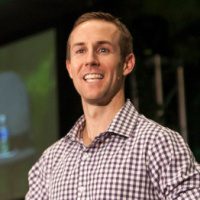
Jon Berghoff, As the creator and founder of xchange, Jon Berghoff is considered a pioneer in the field of transformational group facilitation. He is the collective wisdom whisperer to global CEO summits, leadership conferences, and high-stakes gatherings for organizations like Conscious Capitalism, Women Presidents Organization, HeartMath®, Arthur Page Society, NASA, Keller Williams, and many more. Over 15,000 coaches, consultants, and change agents are now using xchange to redefine how we unlock potential at scale through transformational learning experiences. As a former executive for Vitamix, where revenue grew by 400% in 4 years, and an adjunct teacher at Case Western Reserve University’s globally ranked Weatherhead School of Management, Jon’s refreshing approach combines scientific research and real experience for one of the most relevant conversations today. Connect with Jon on LinkedIn.

